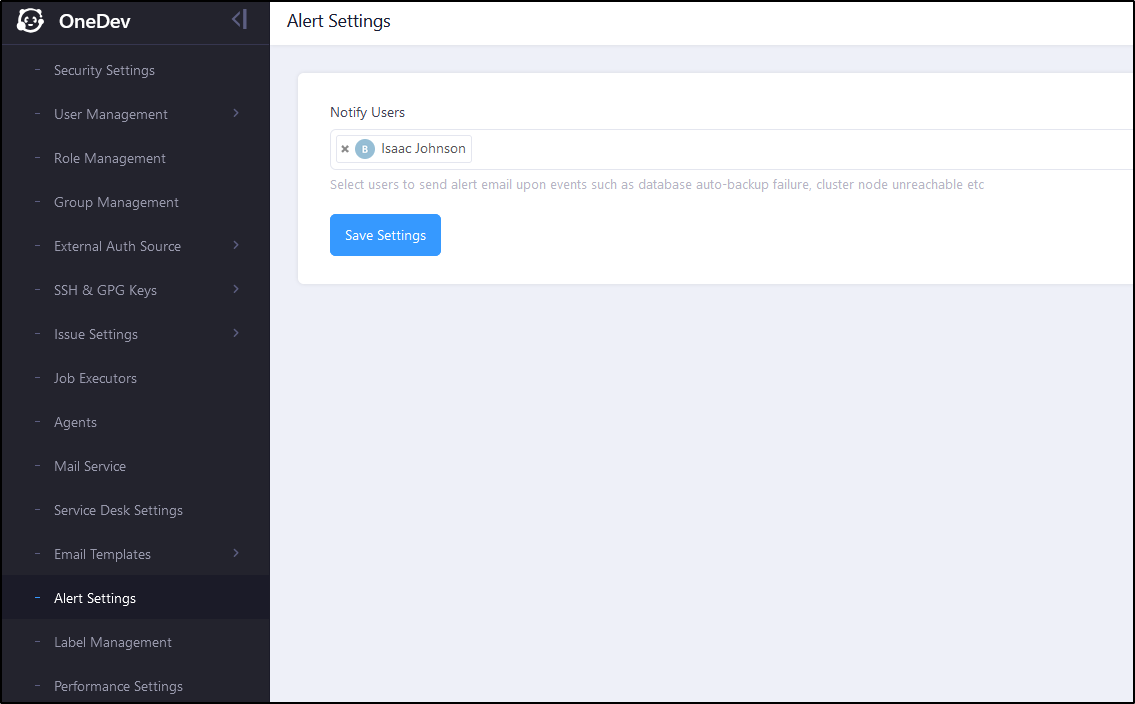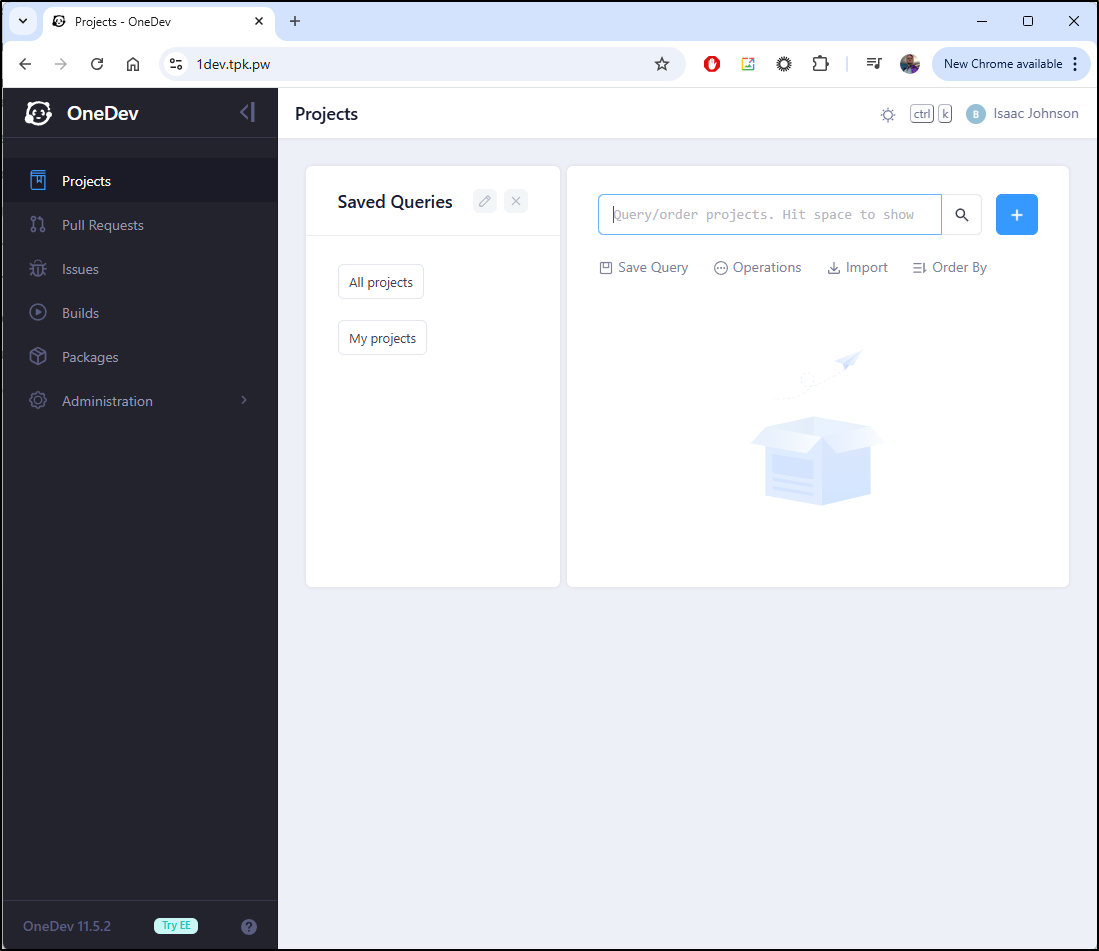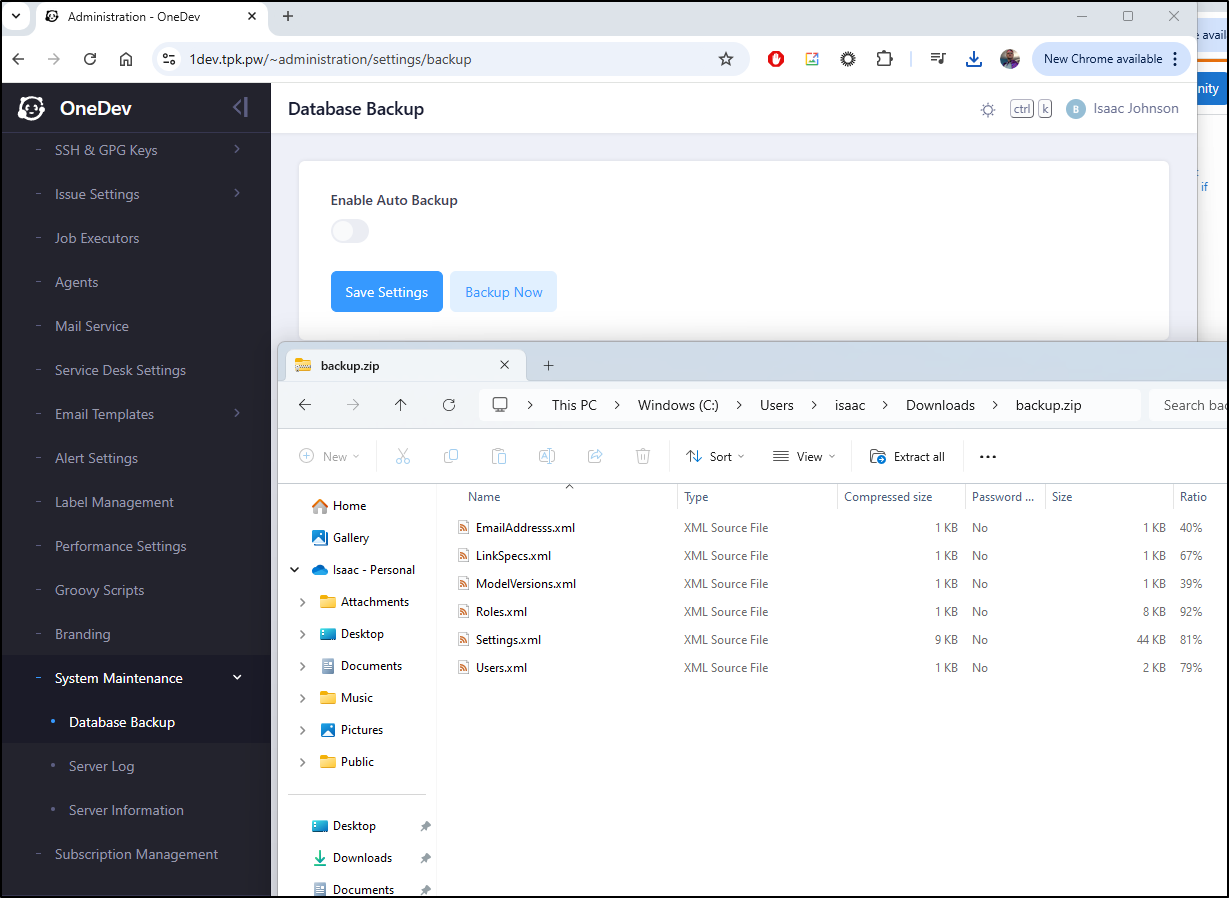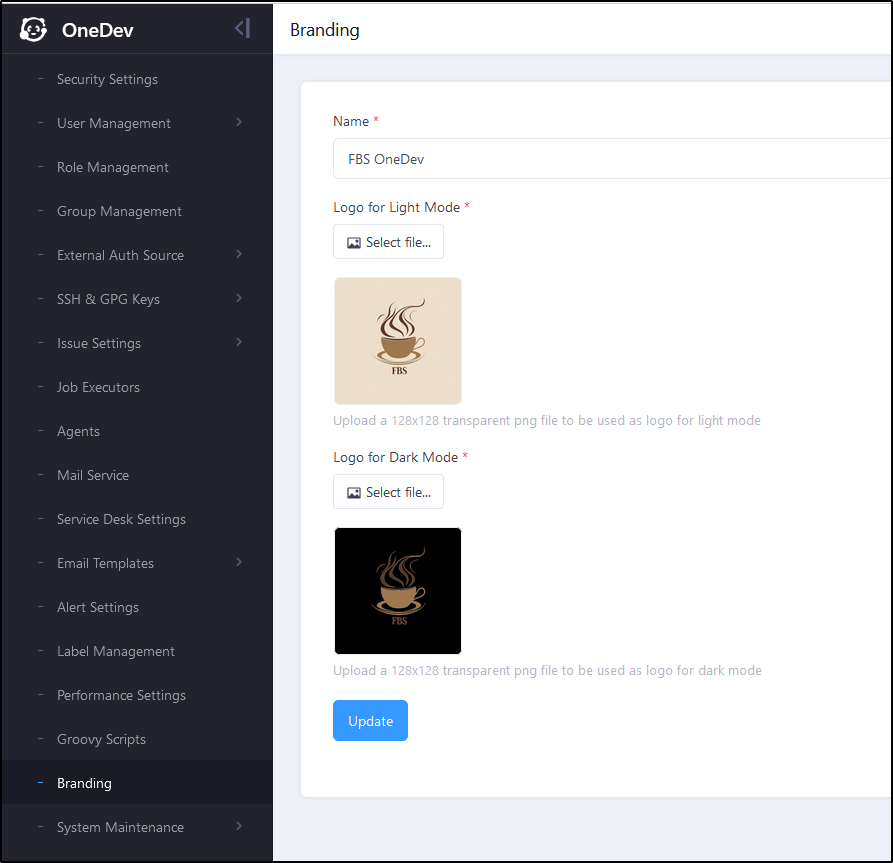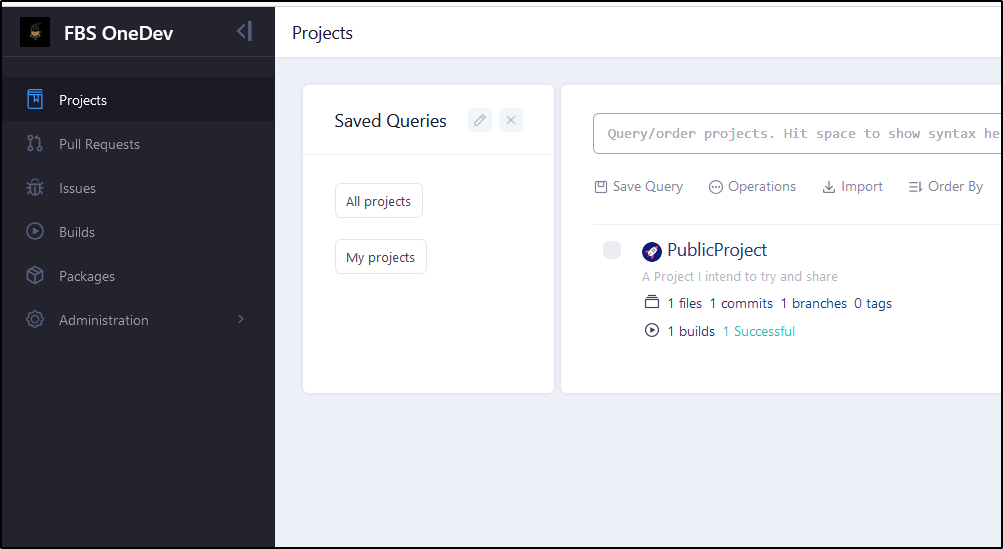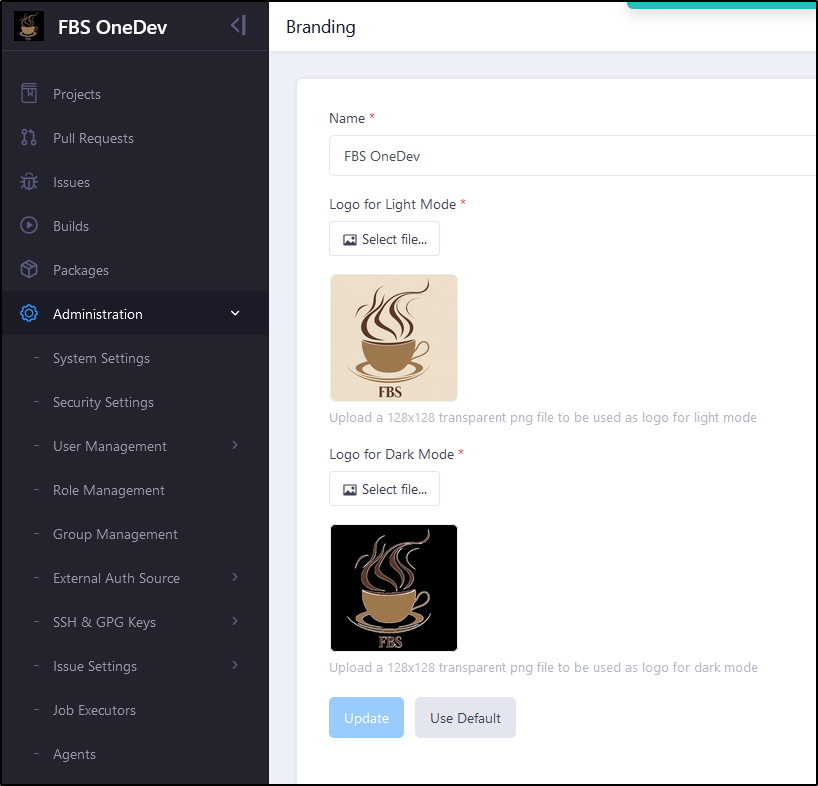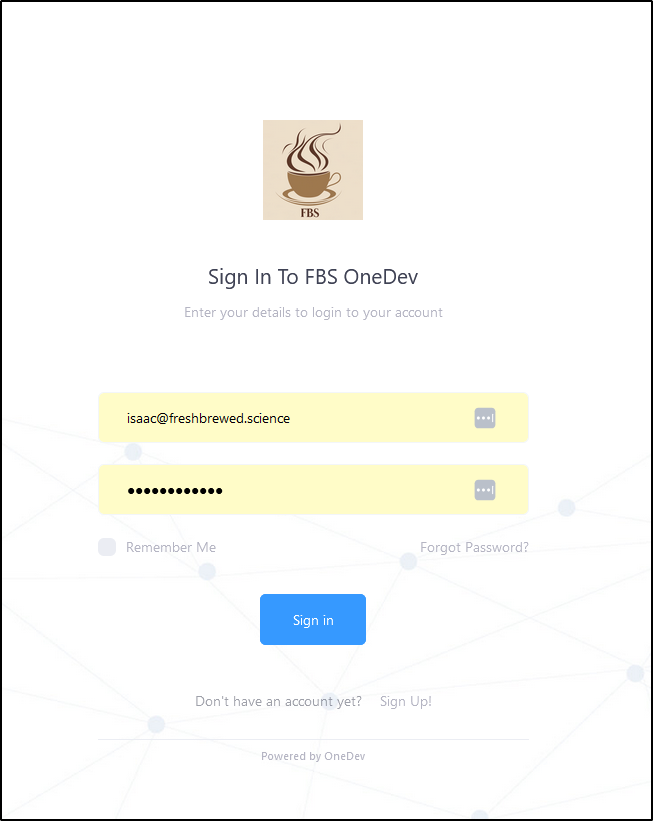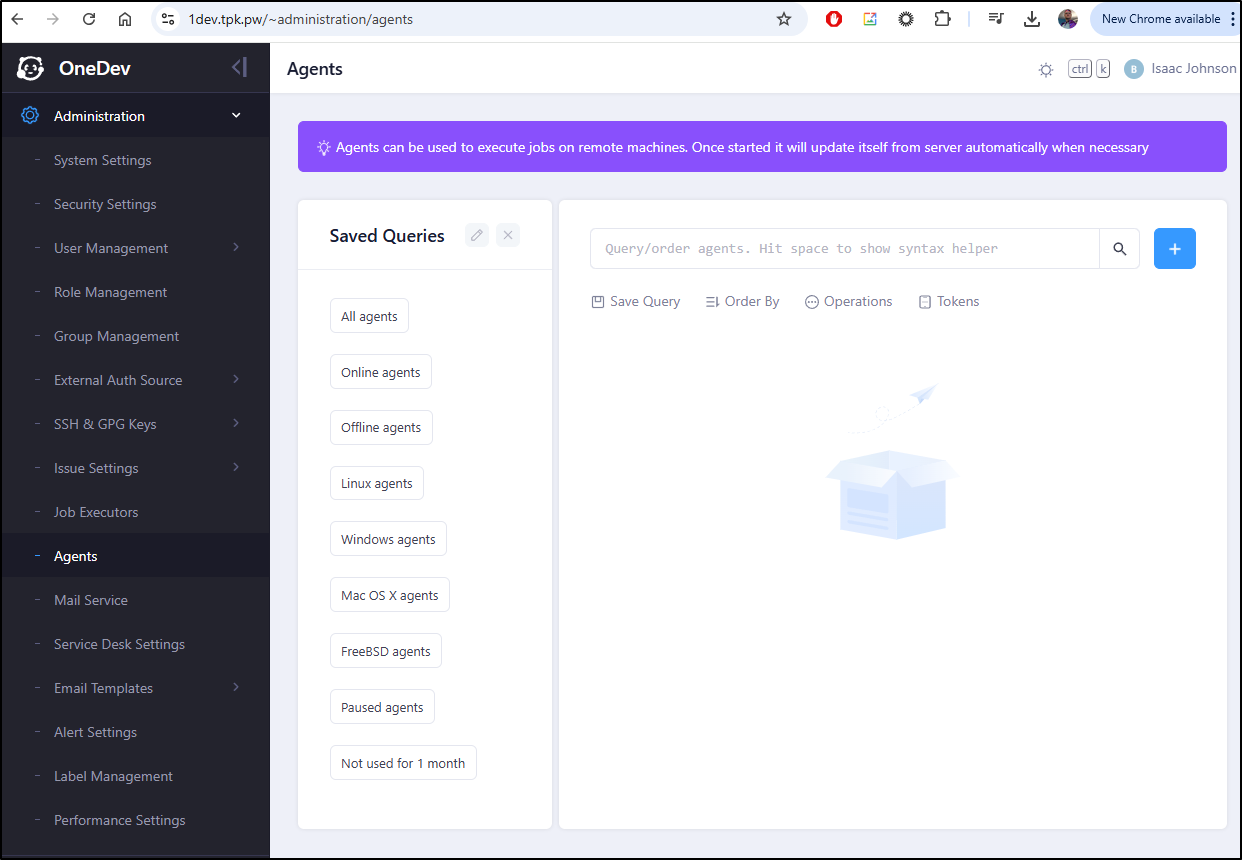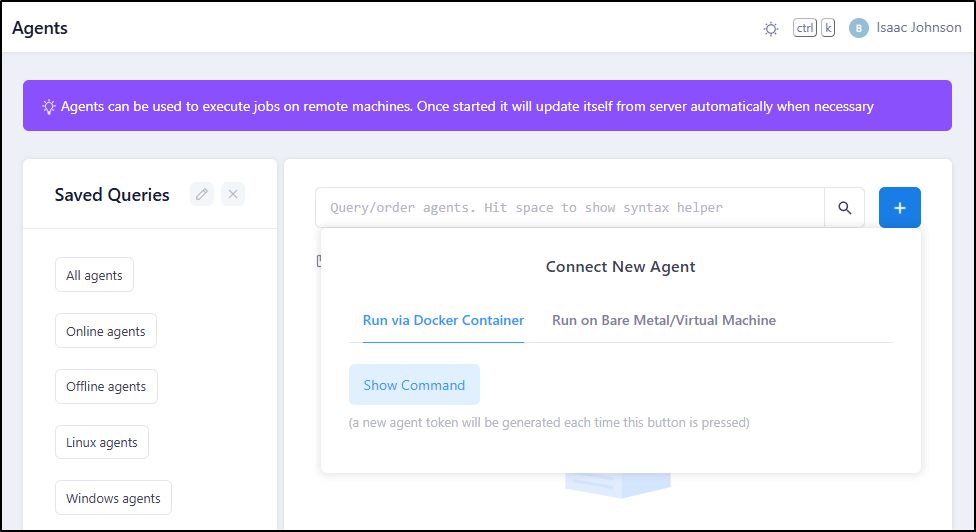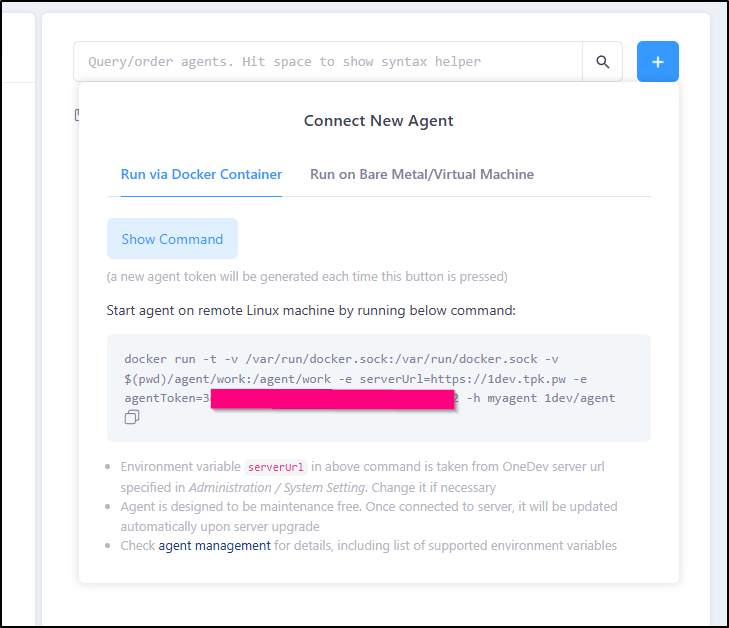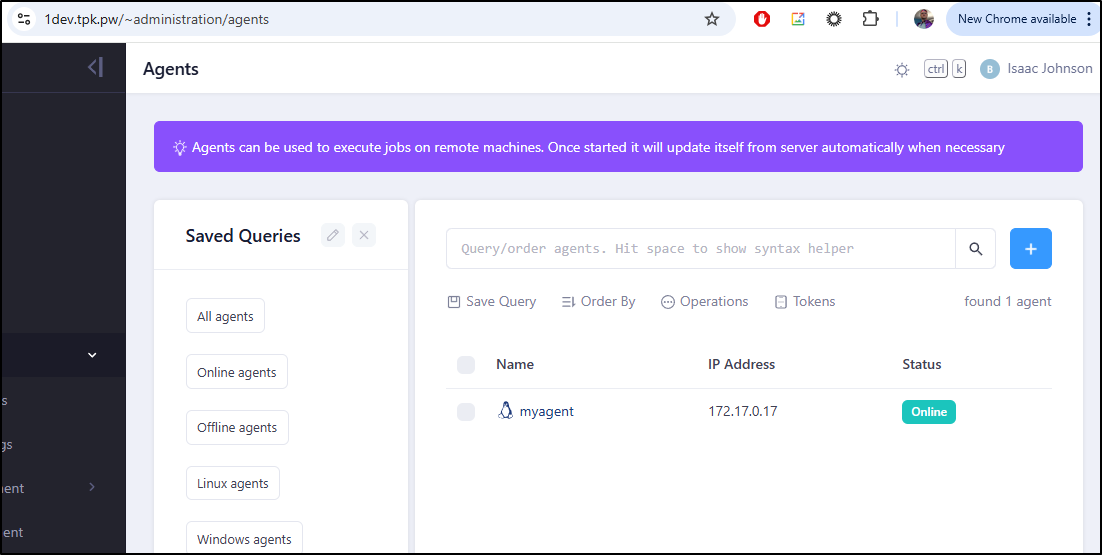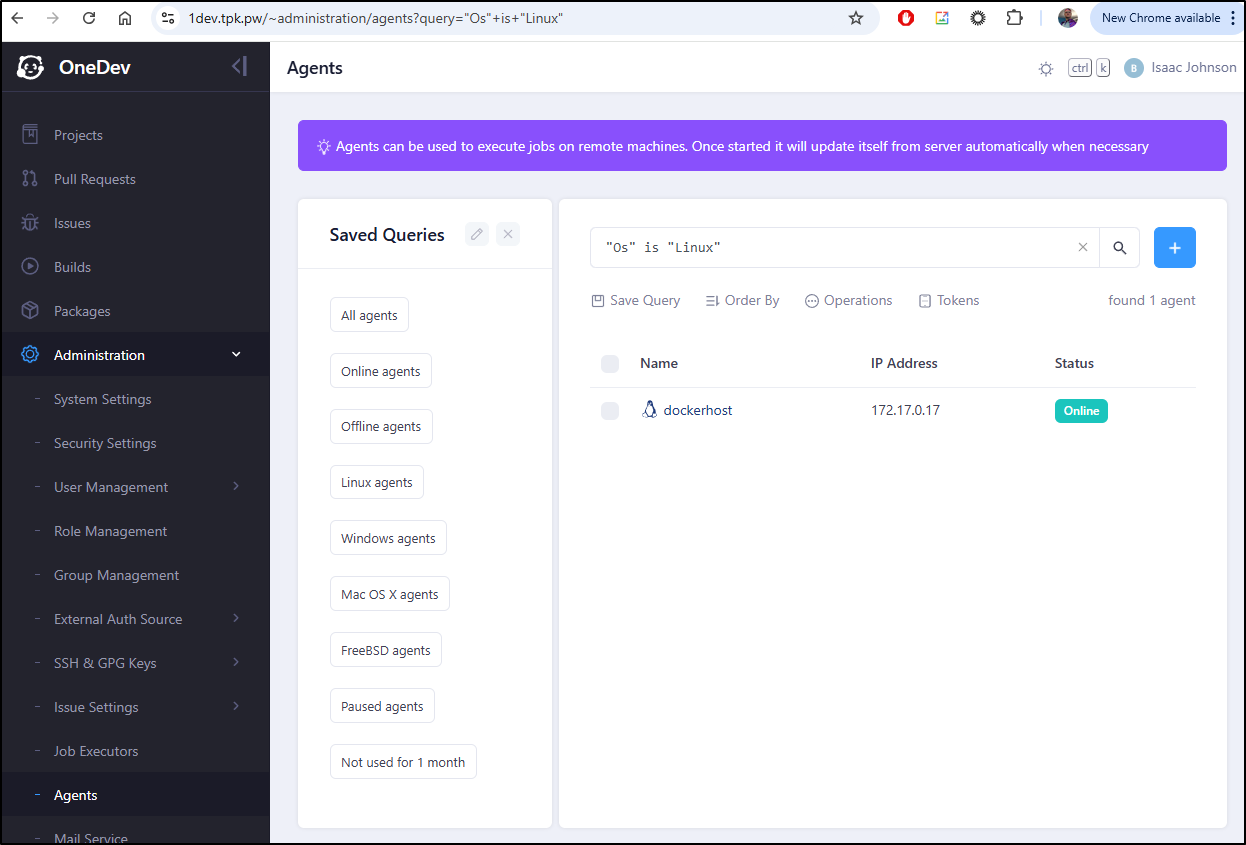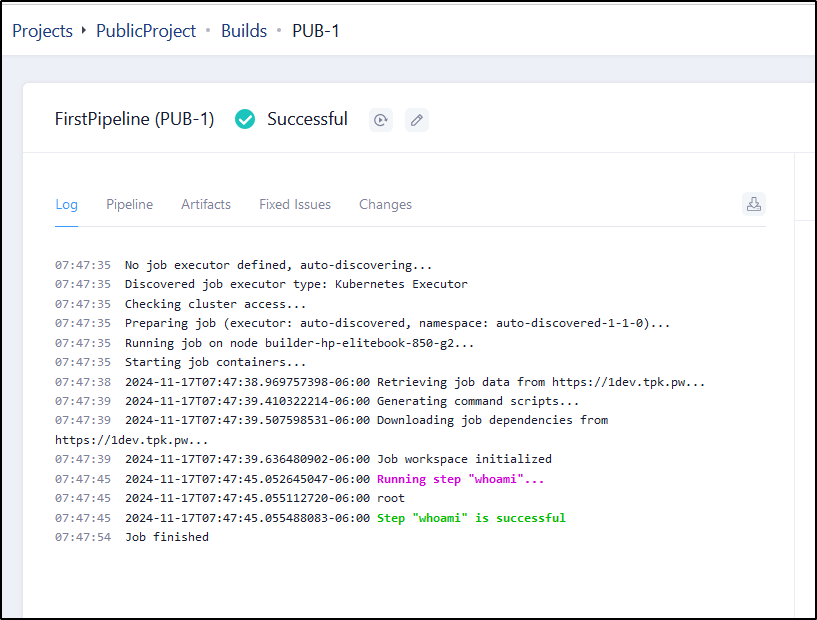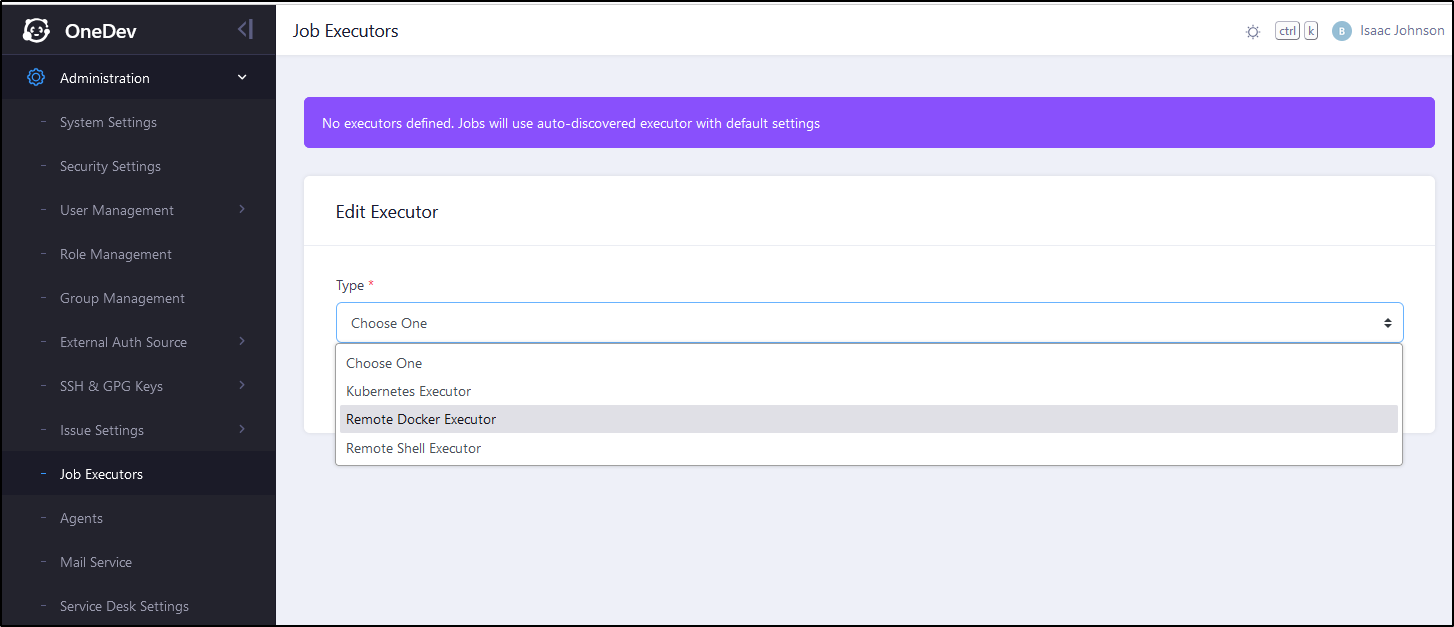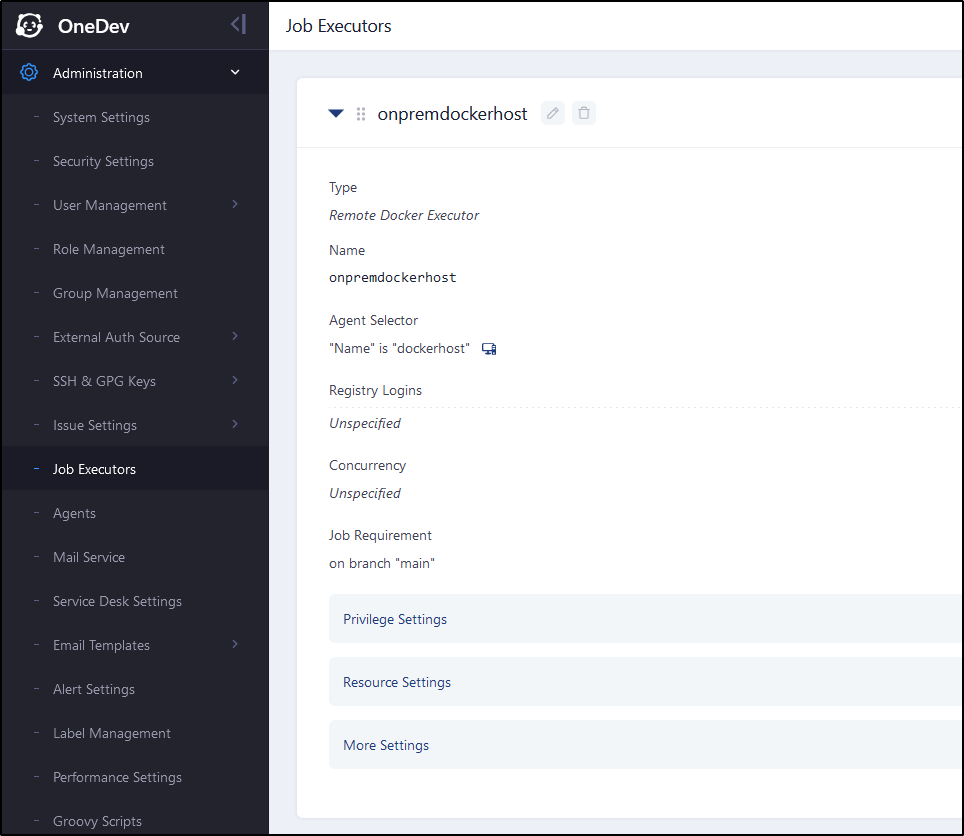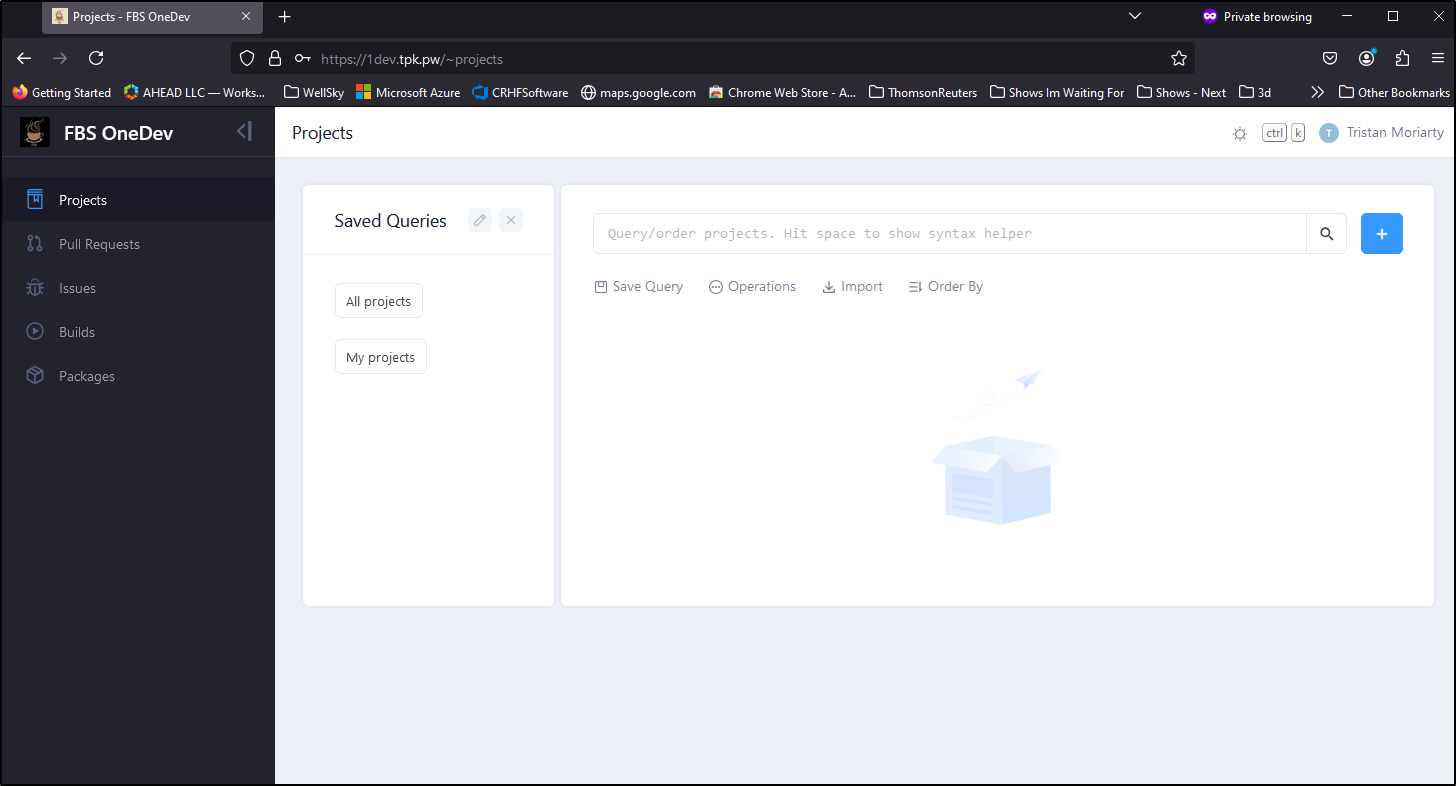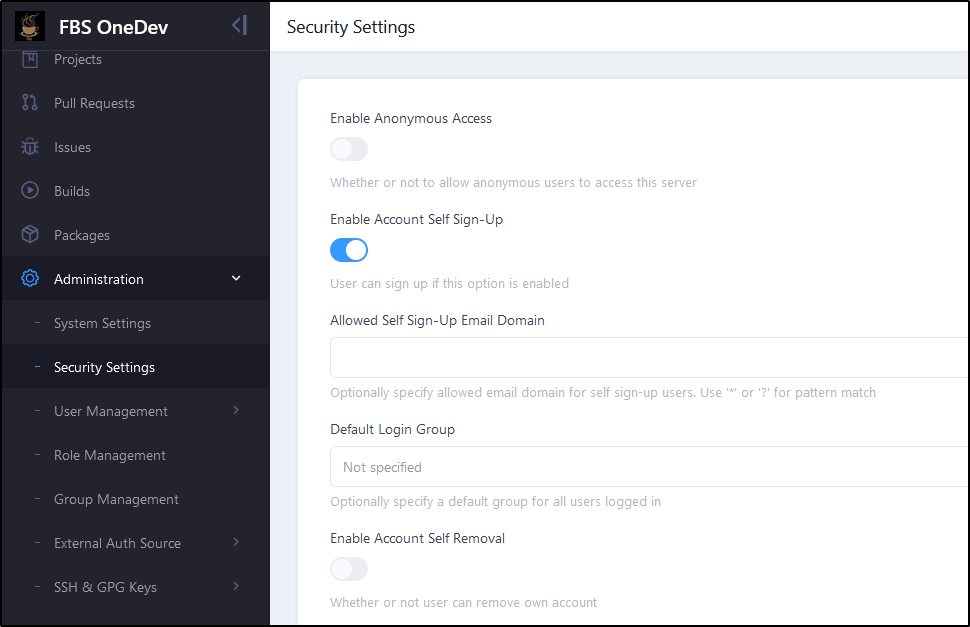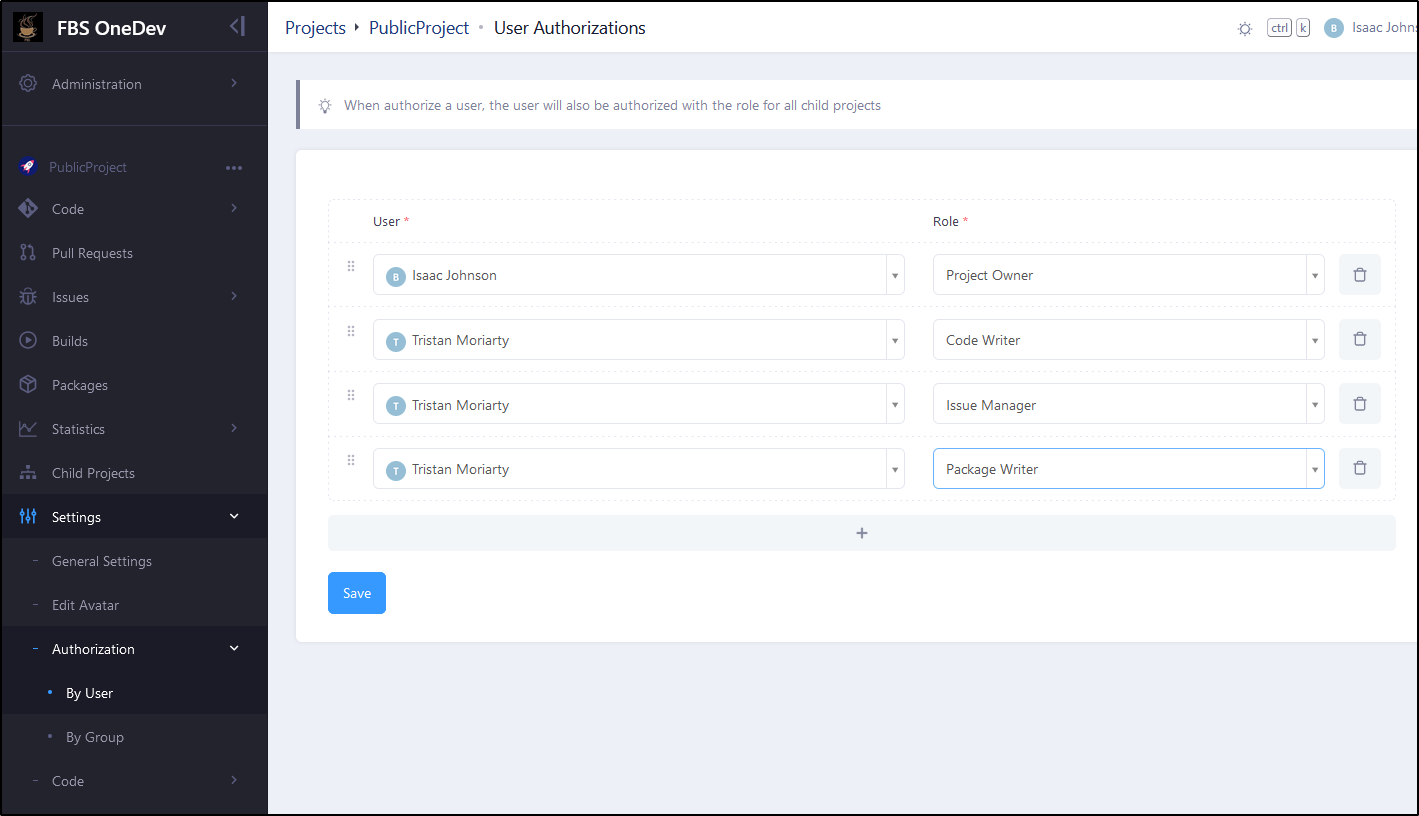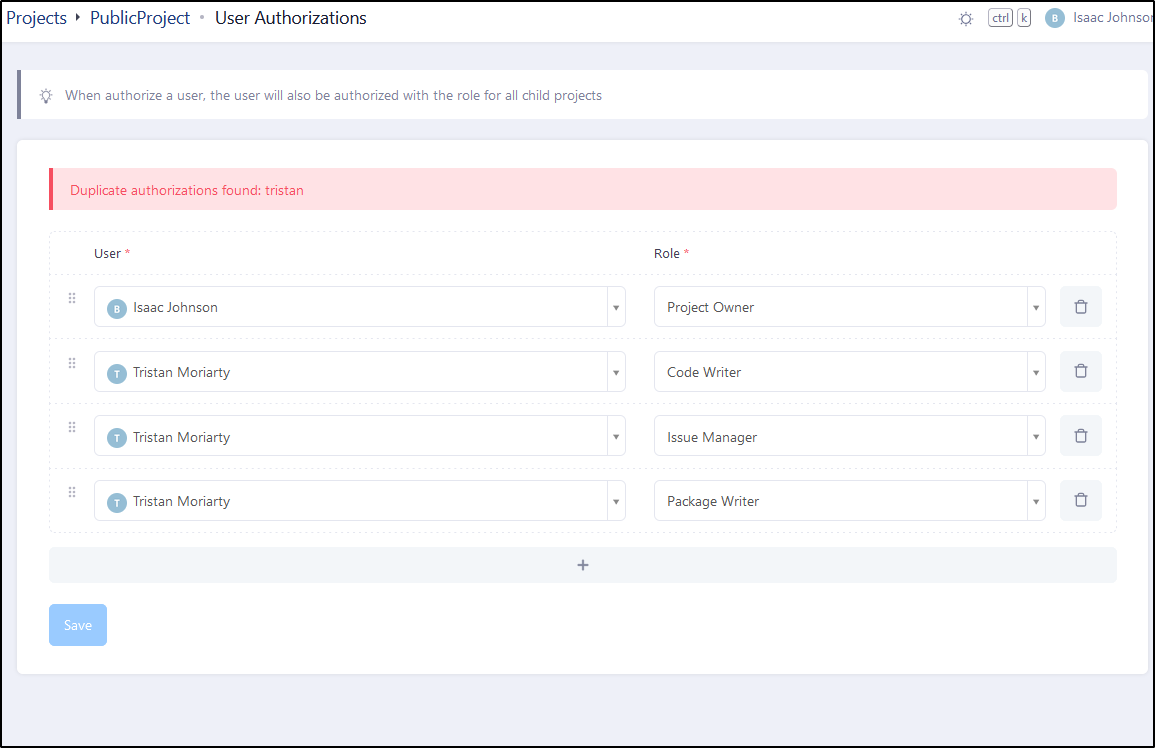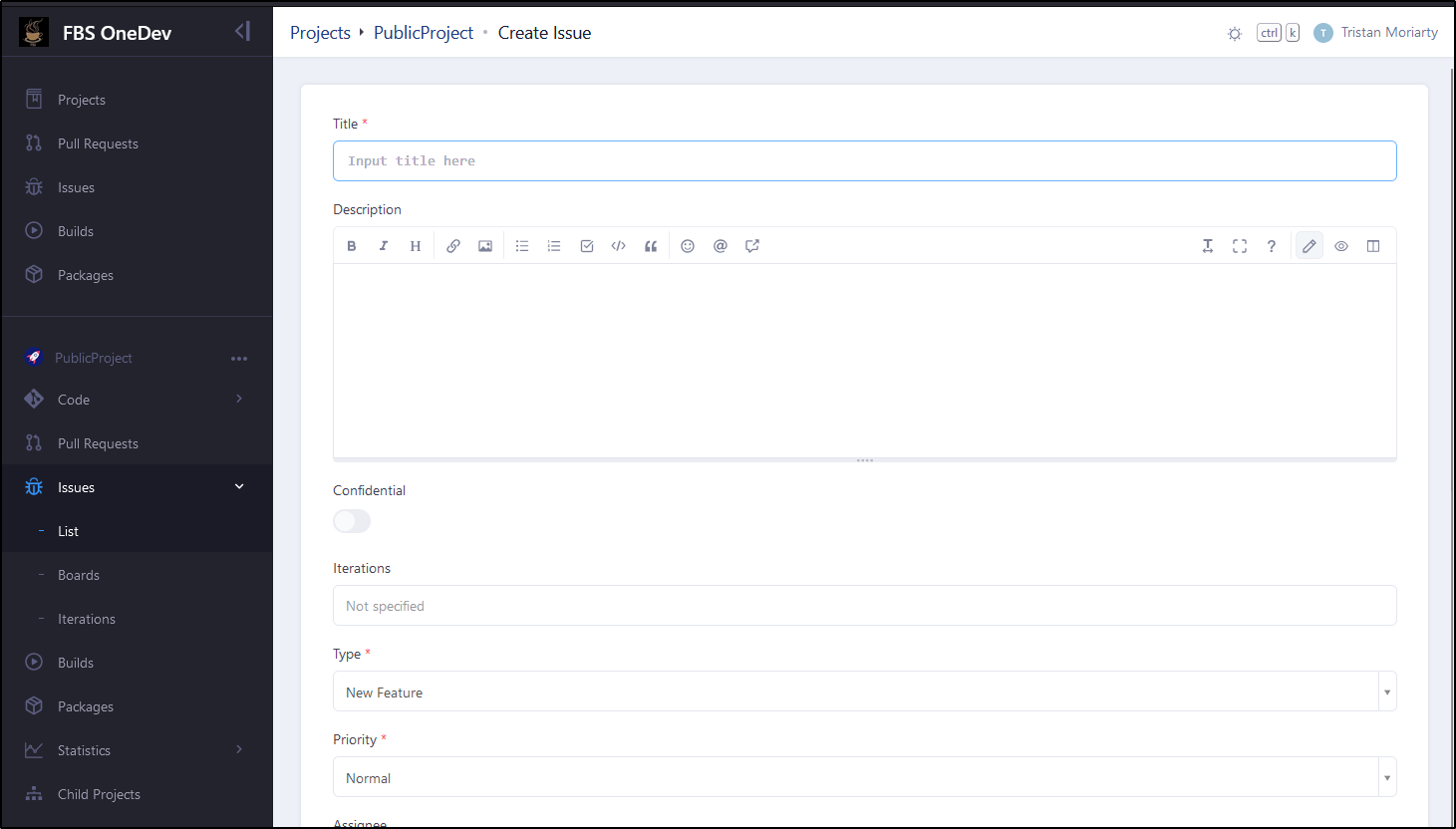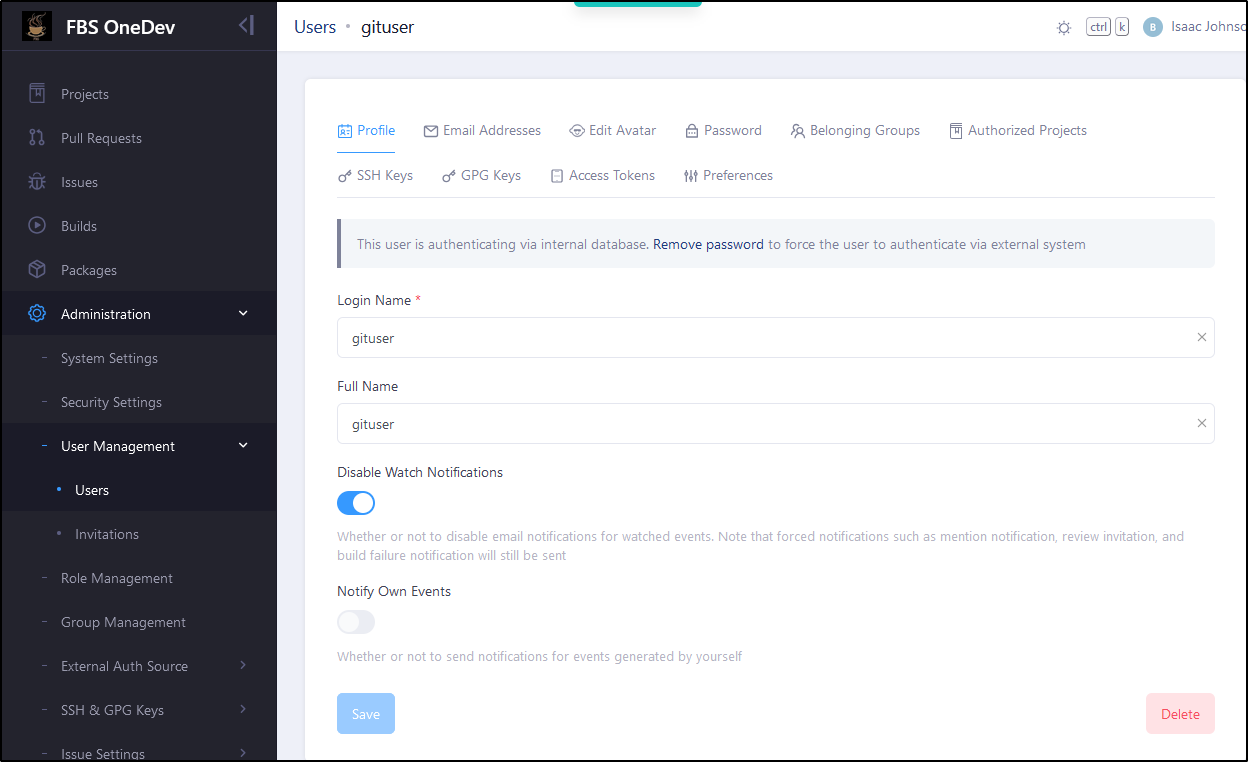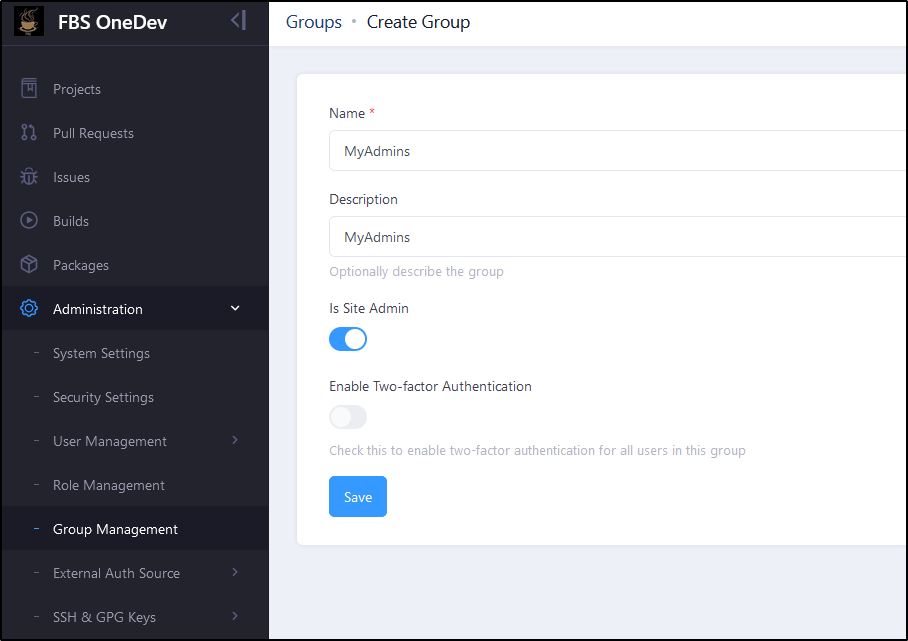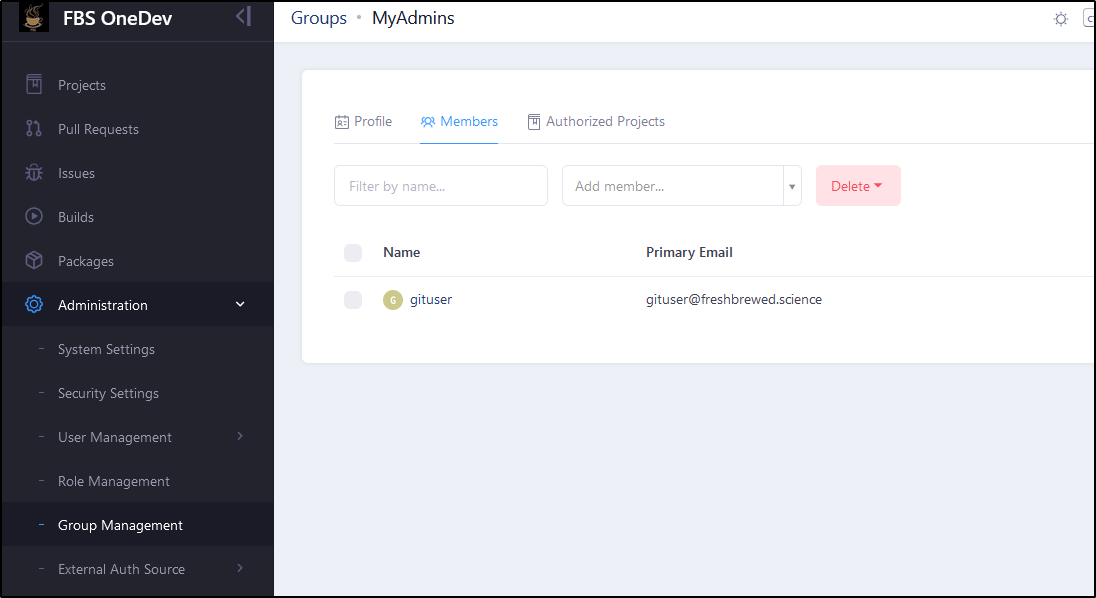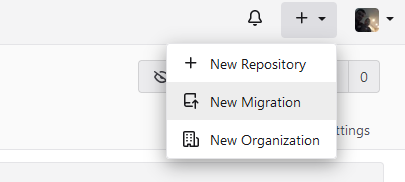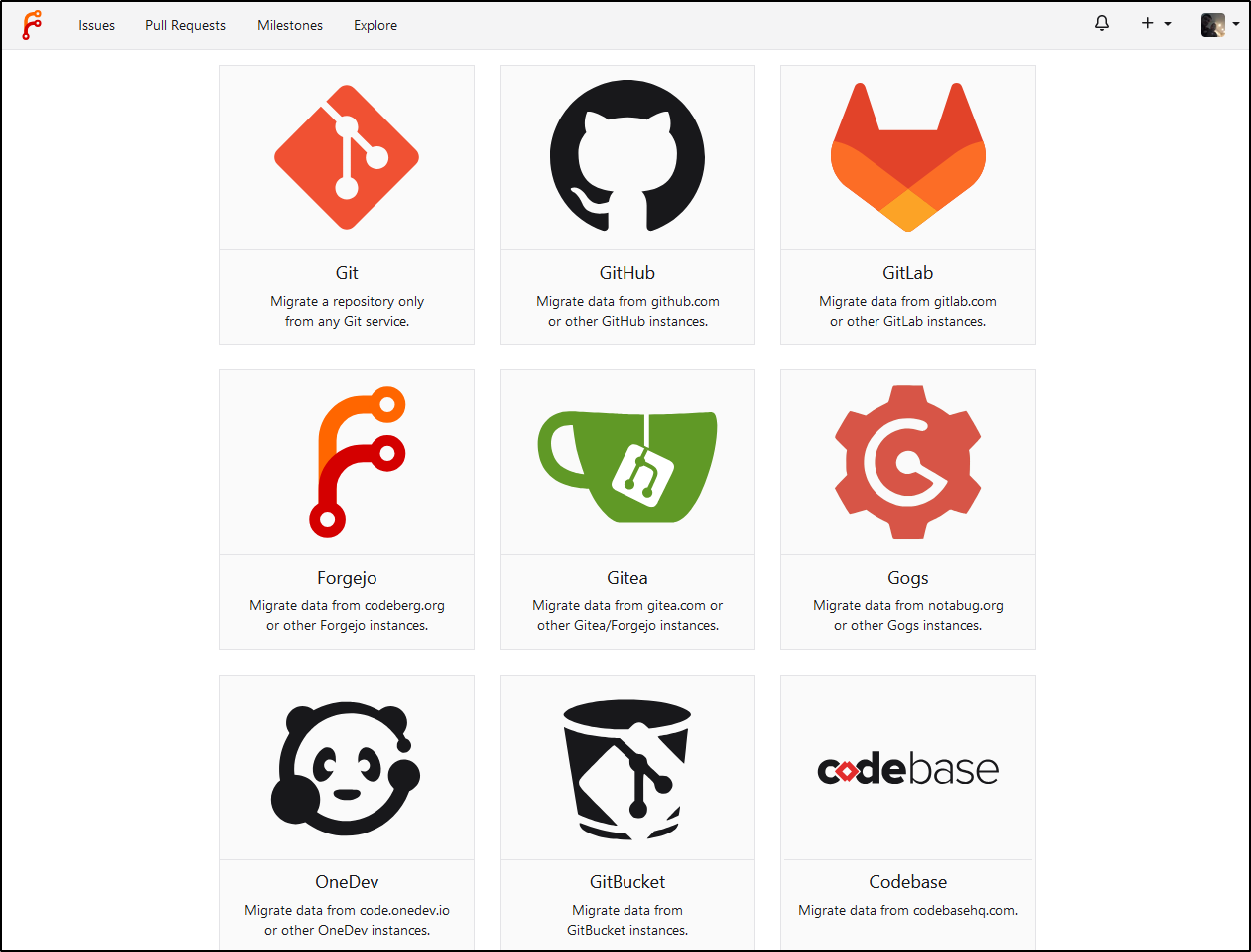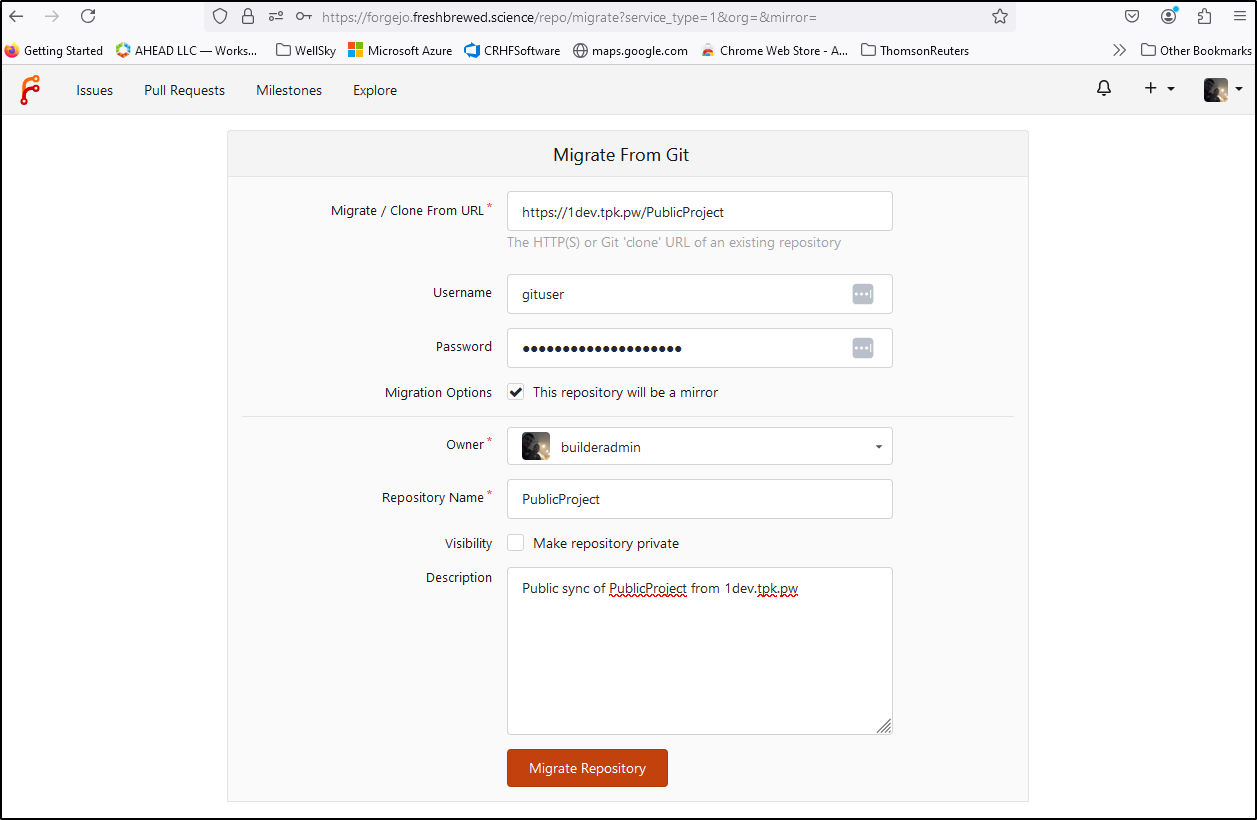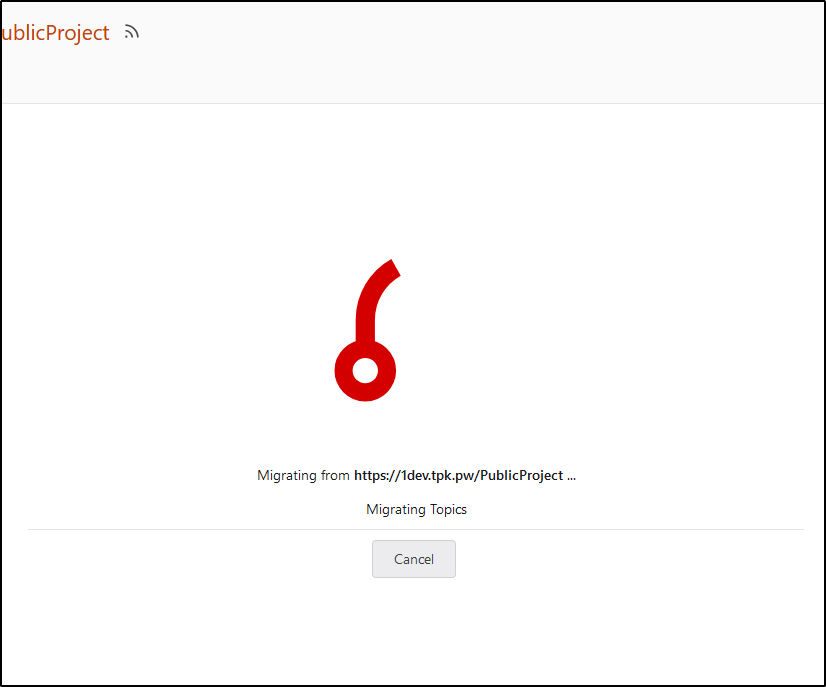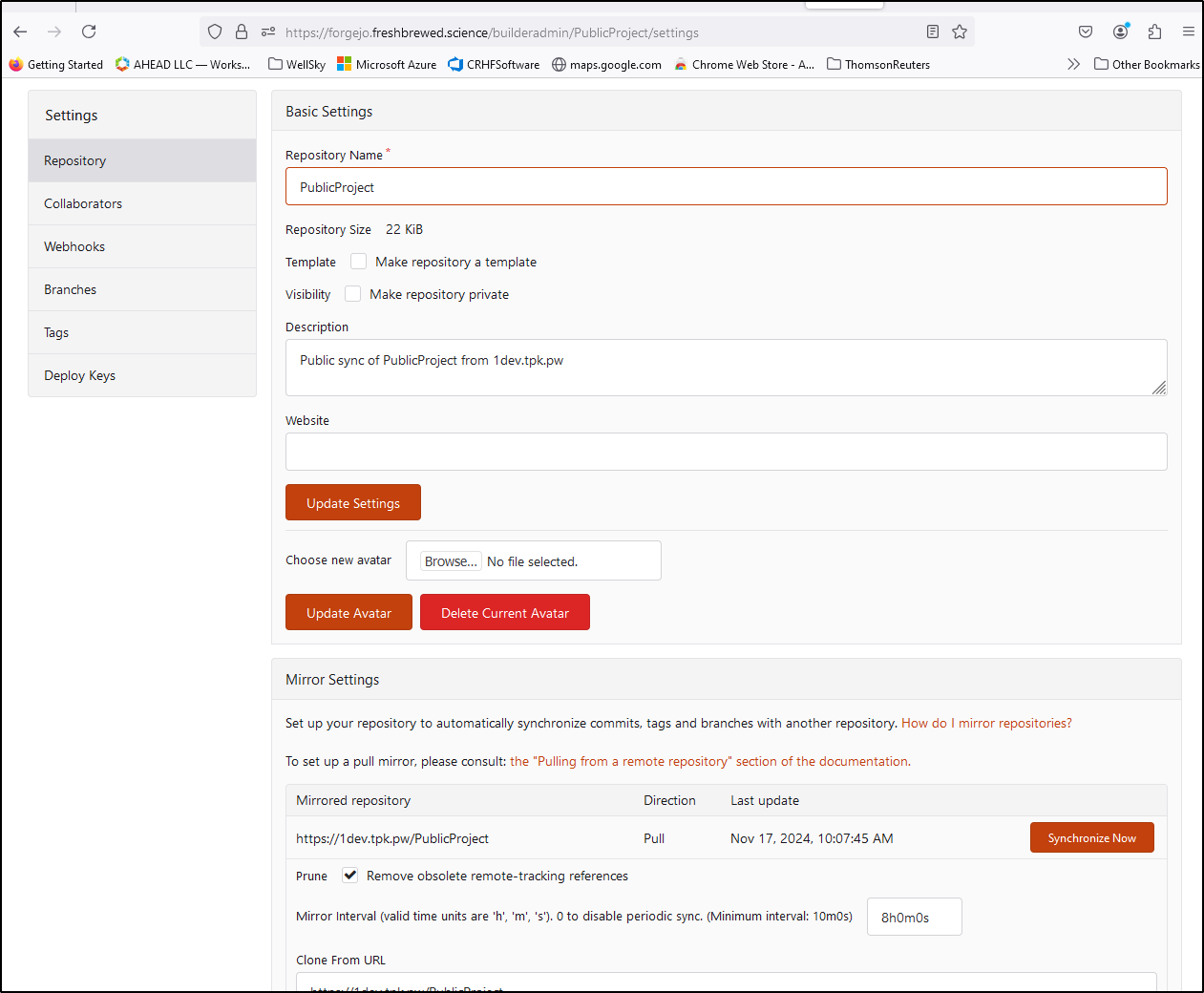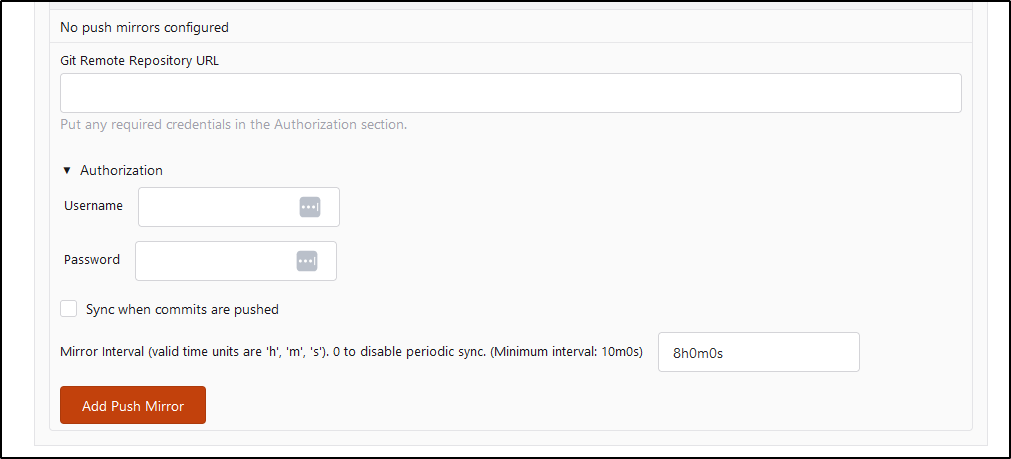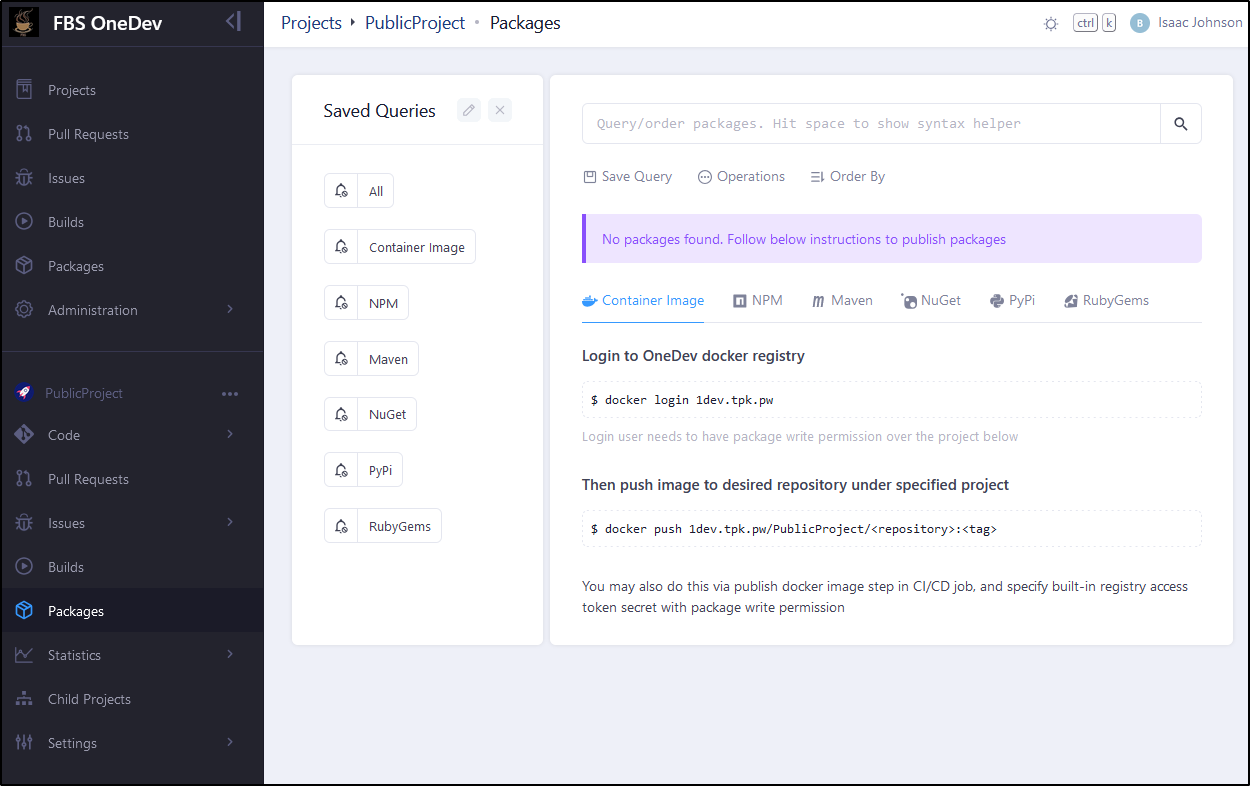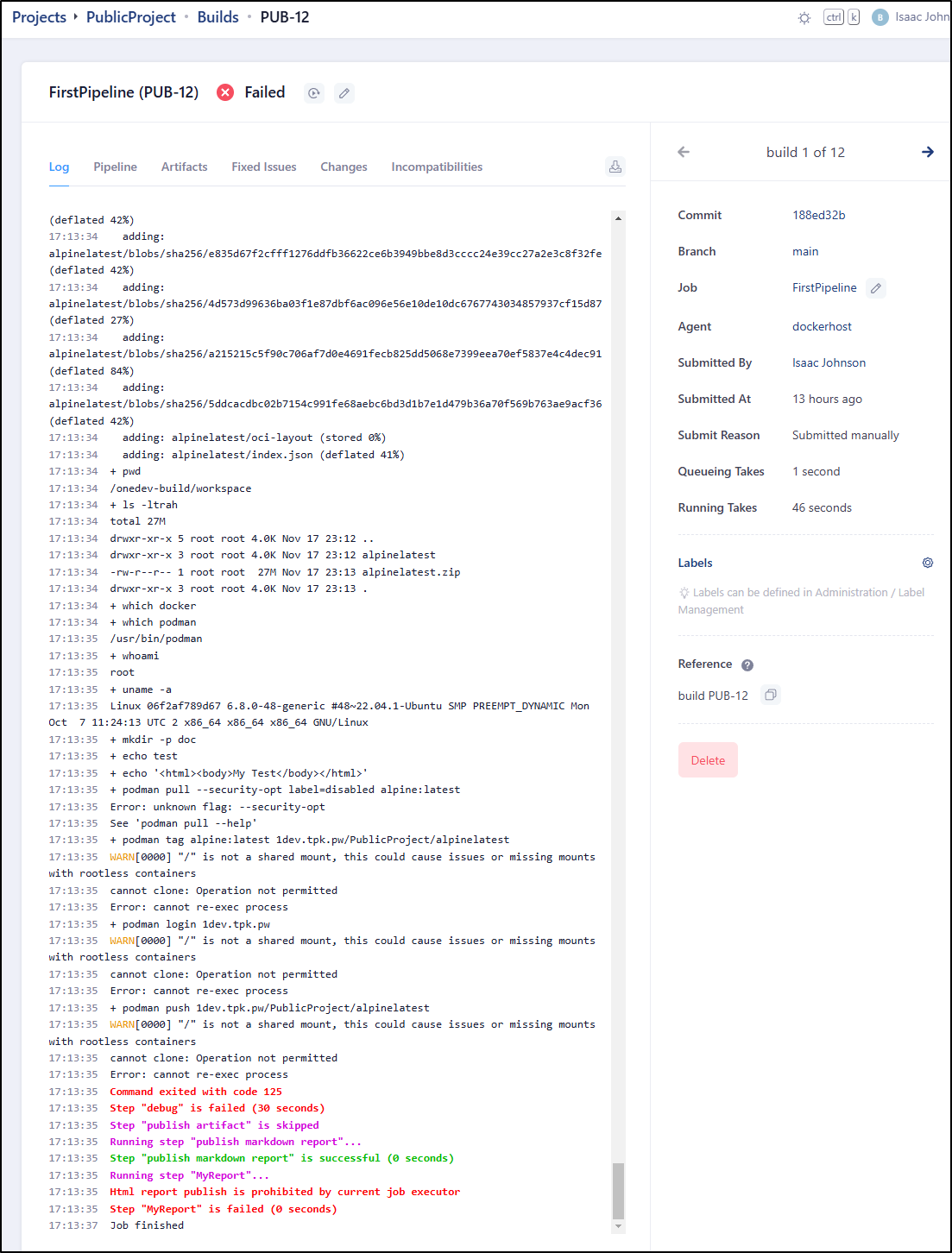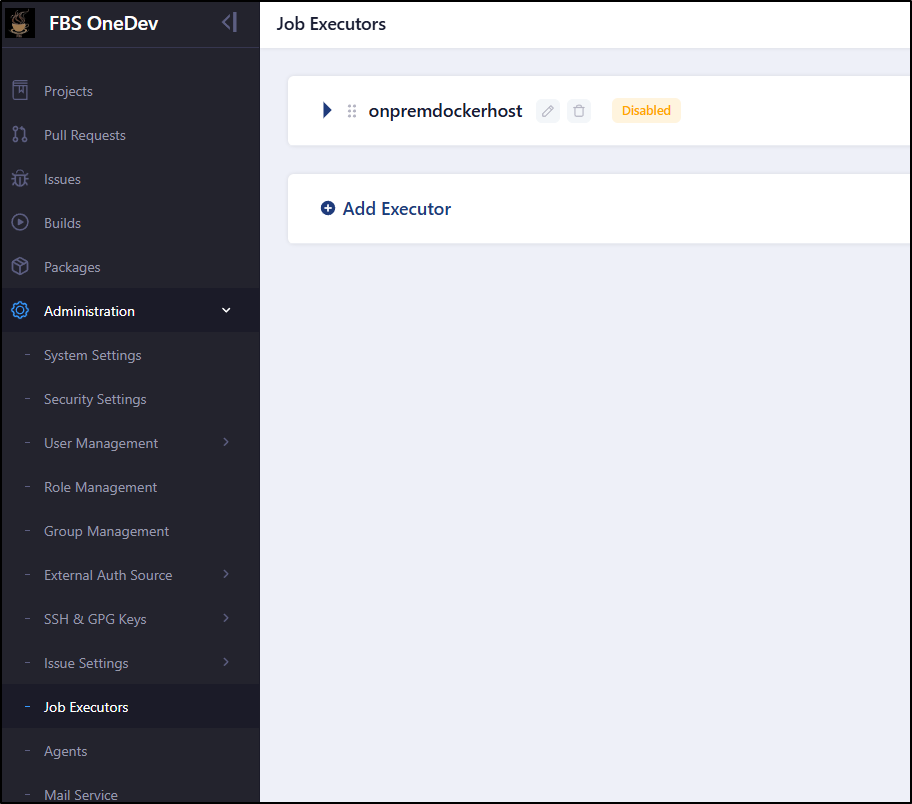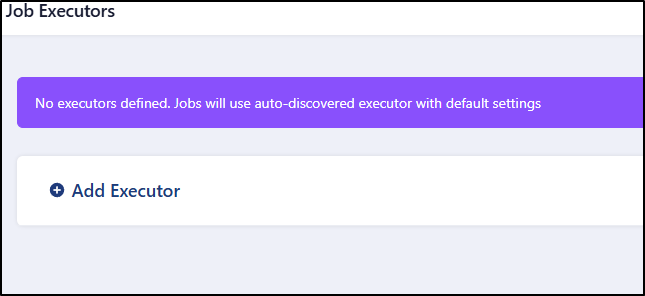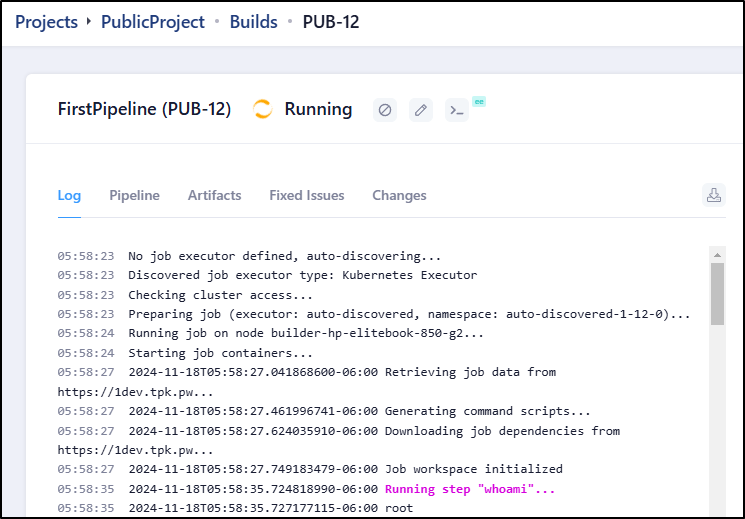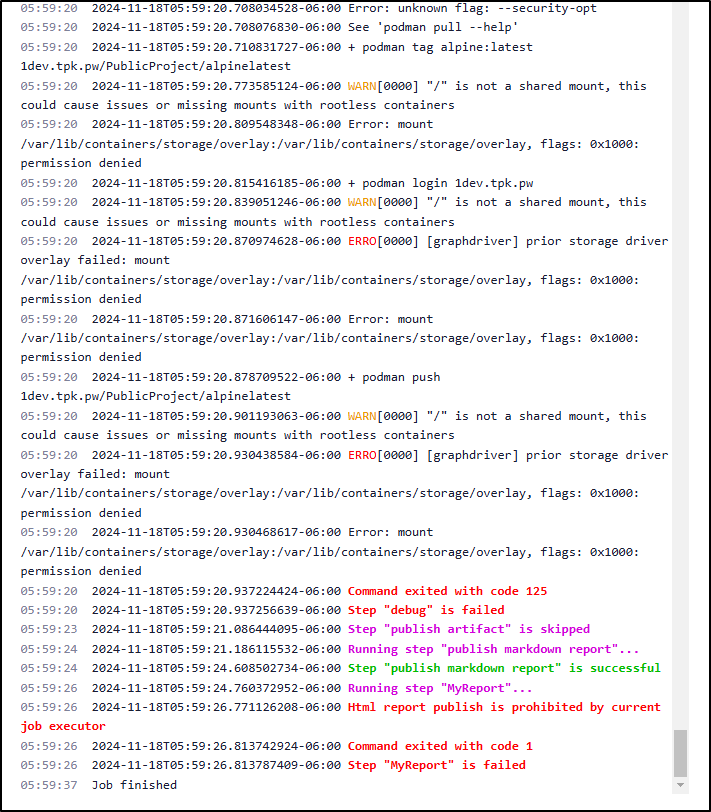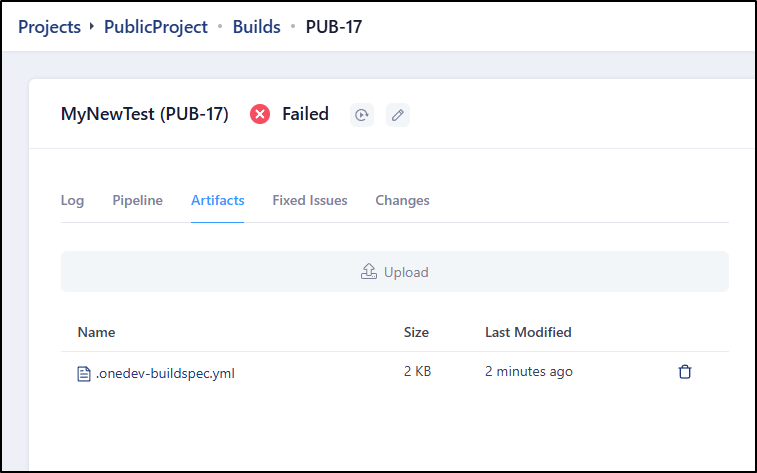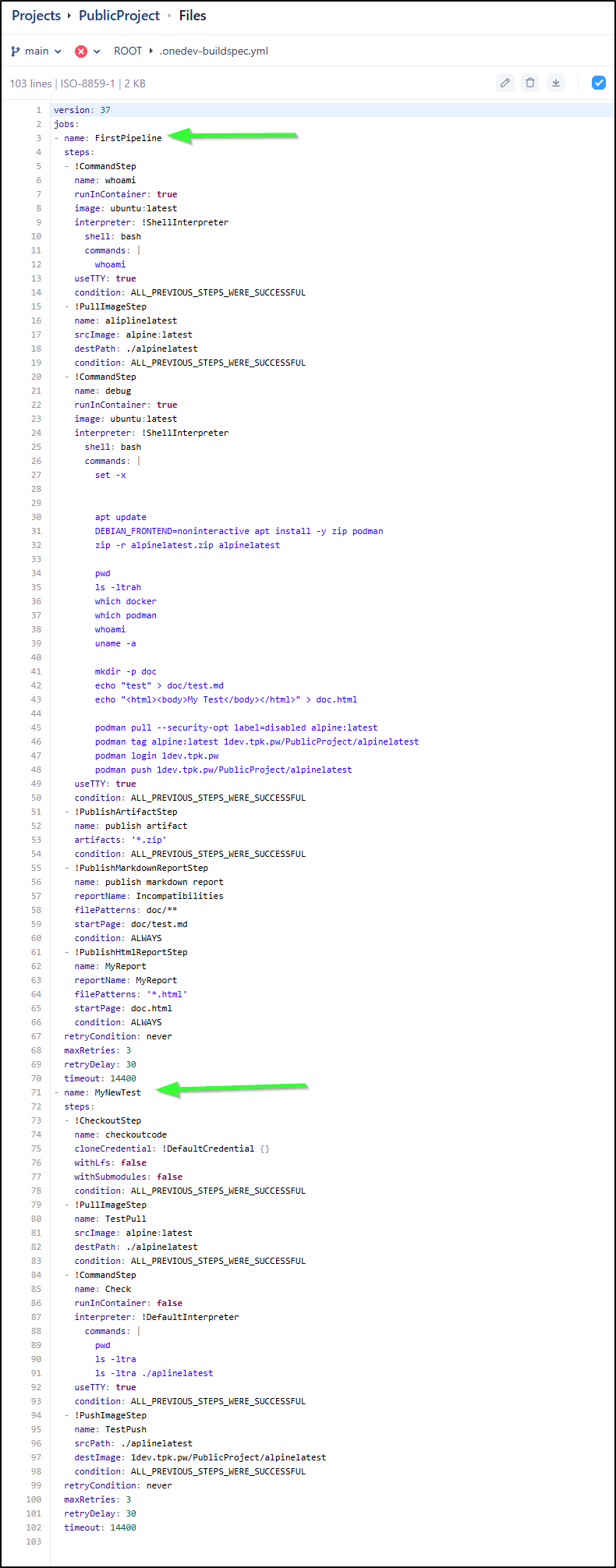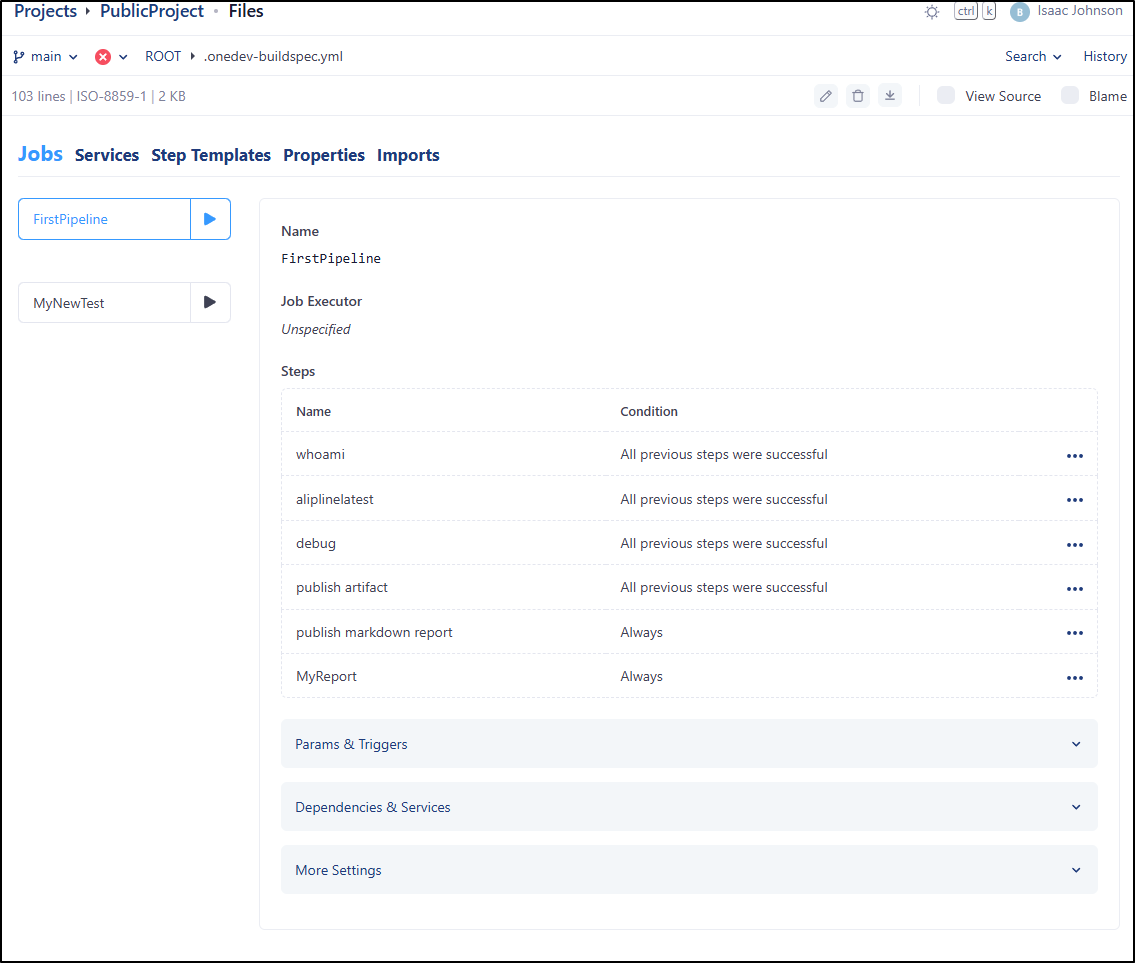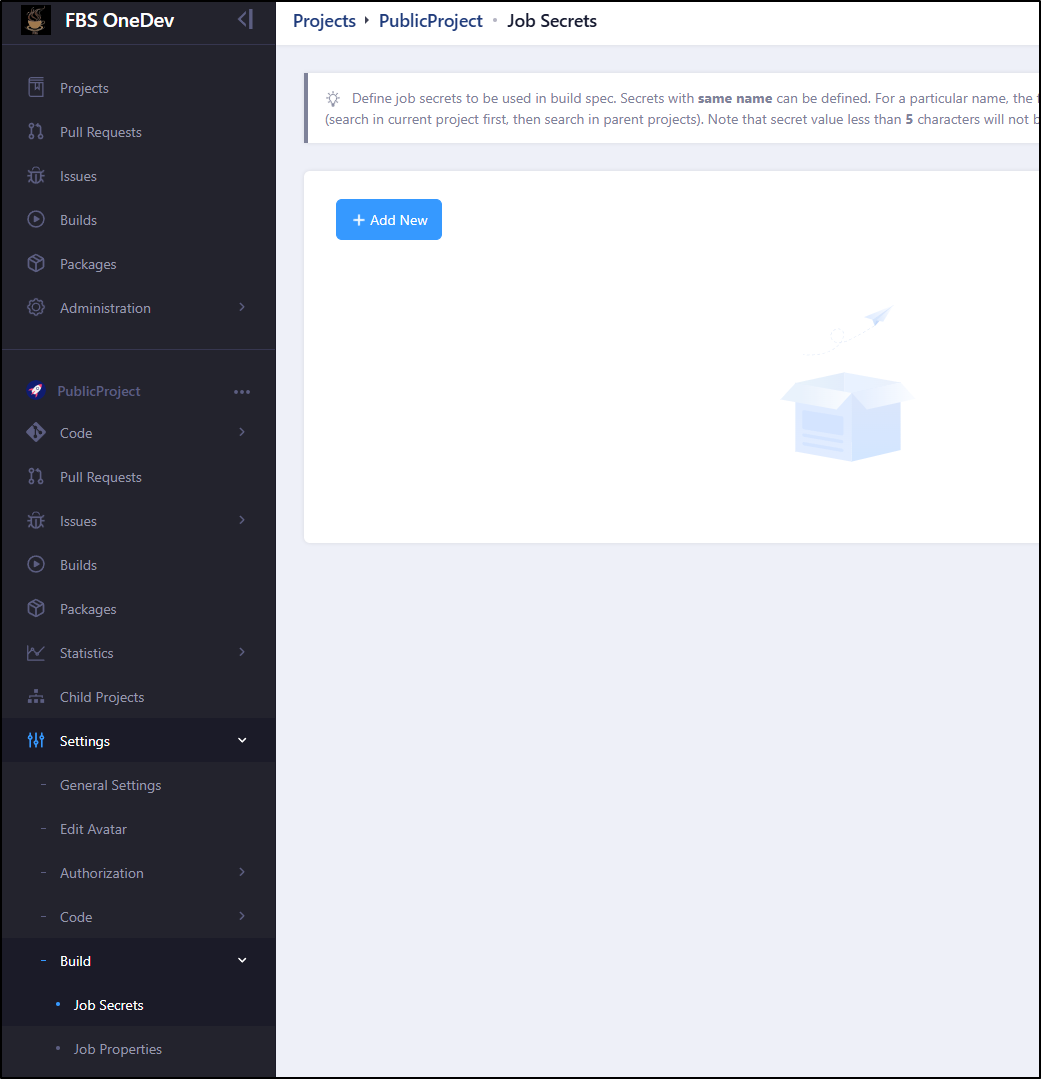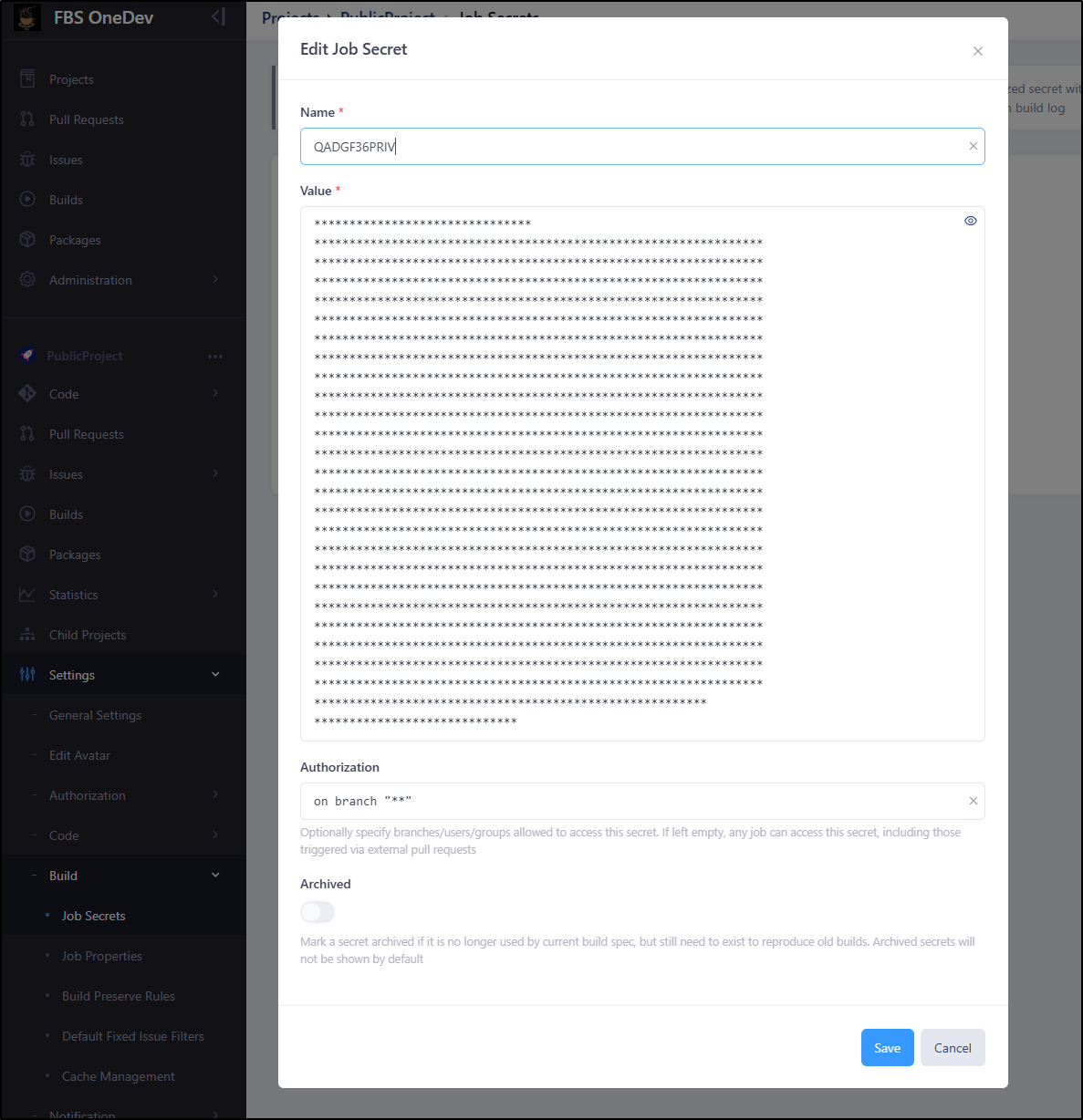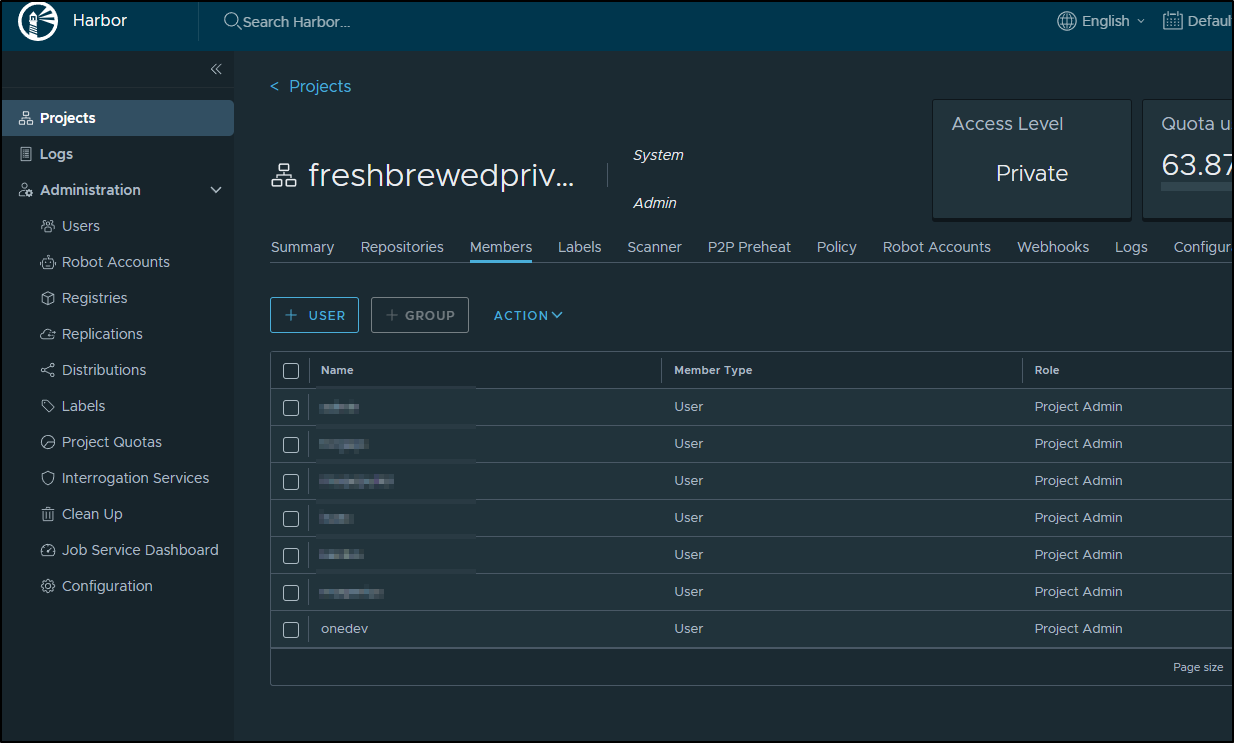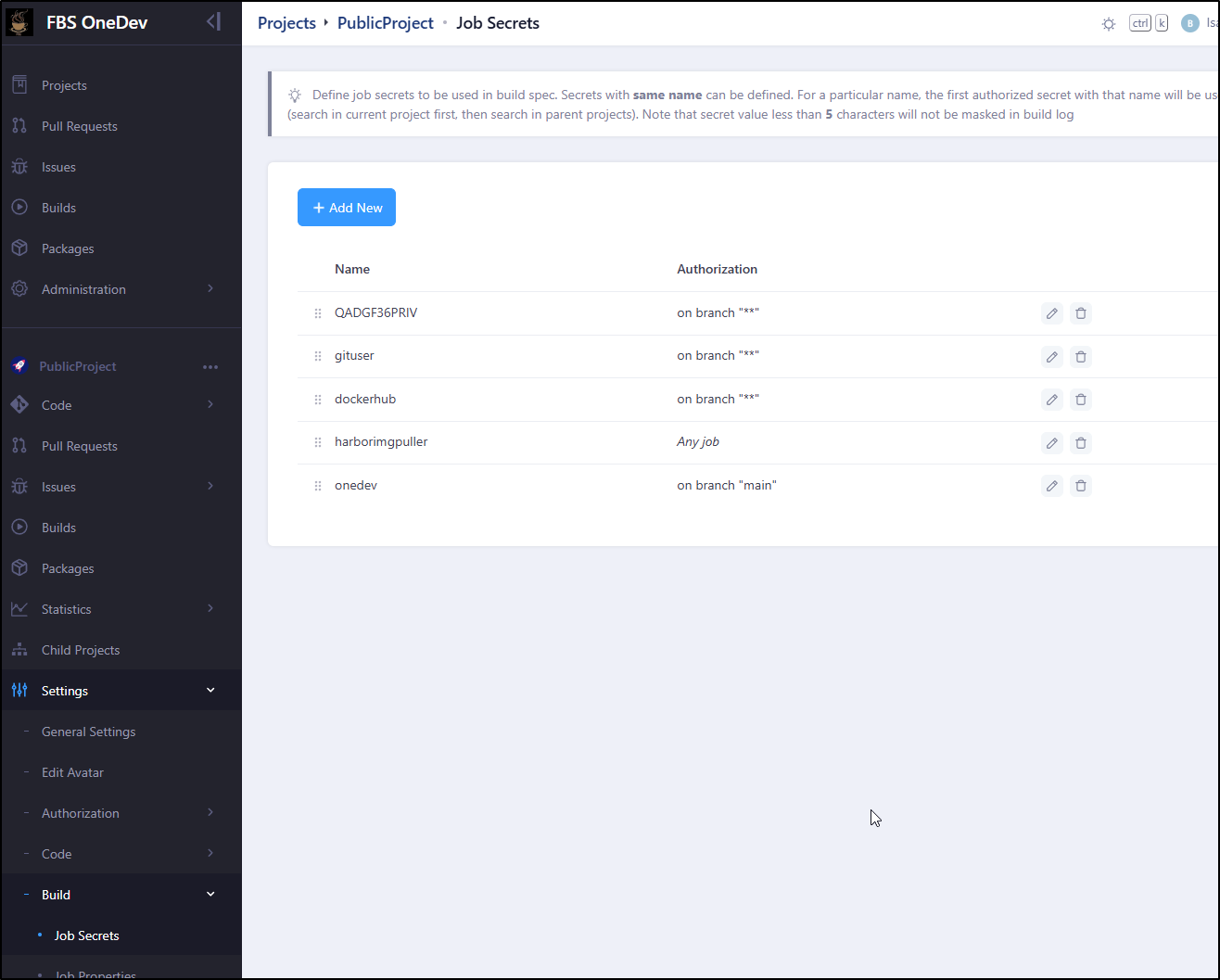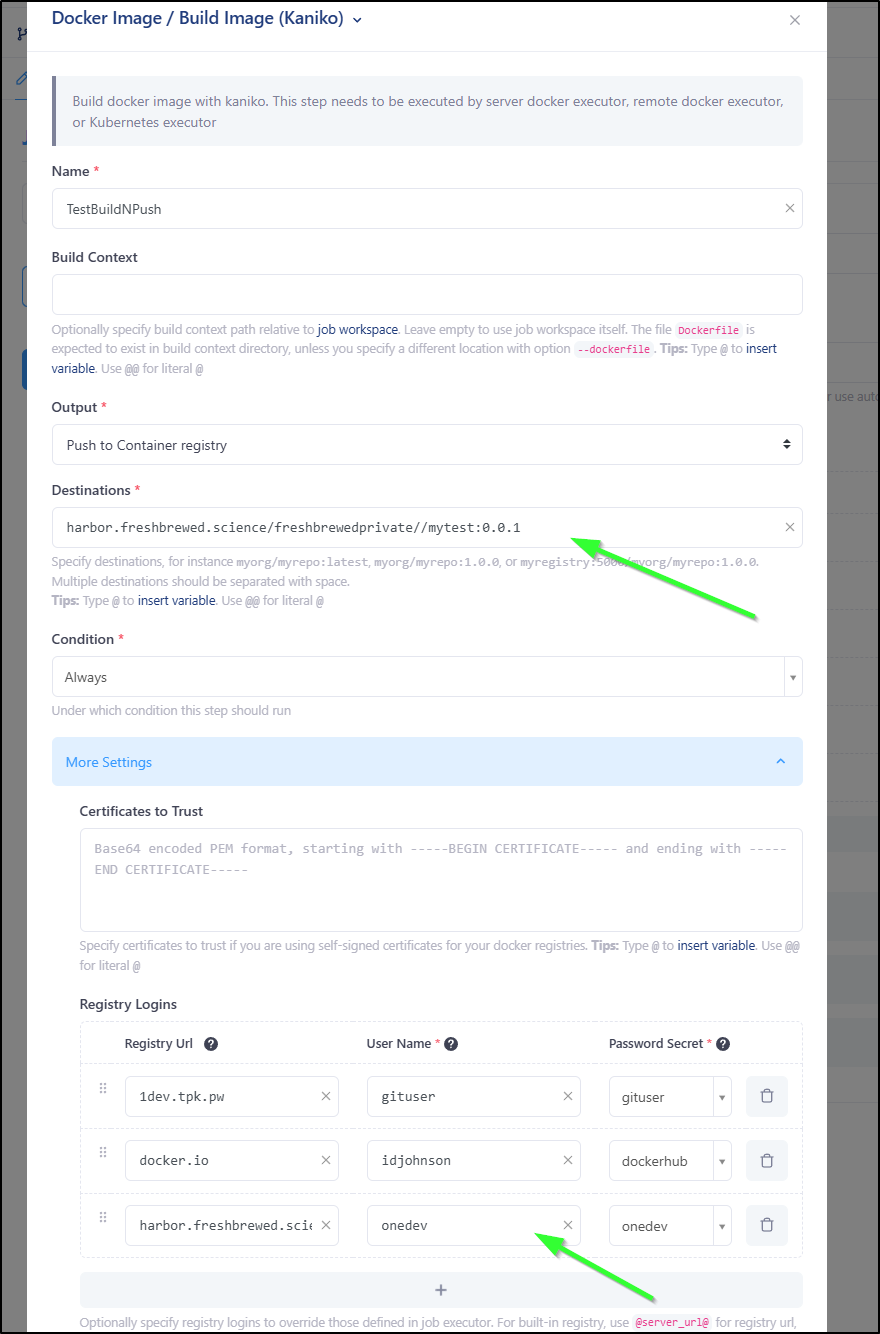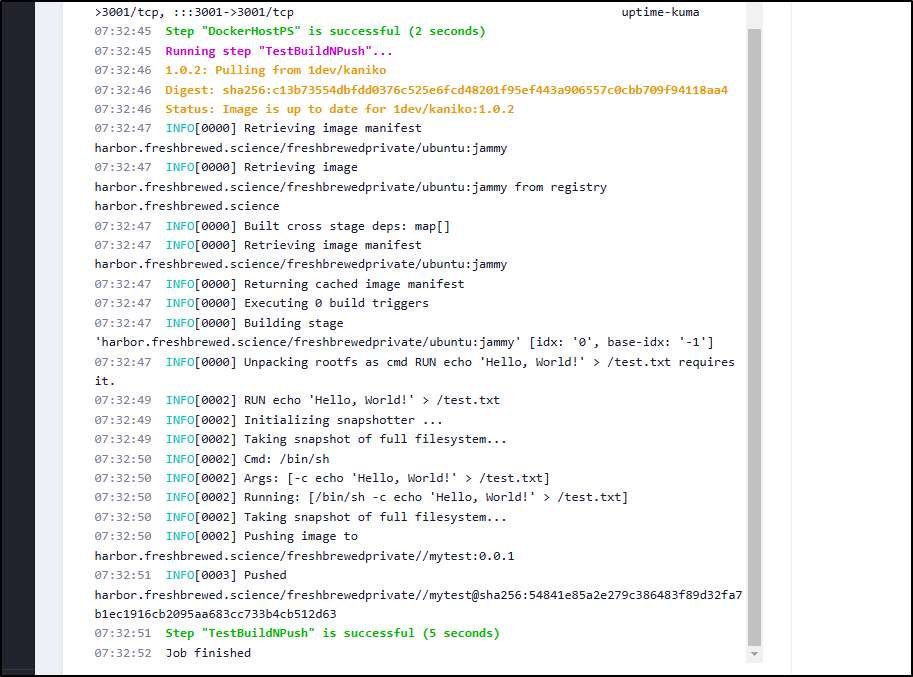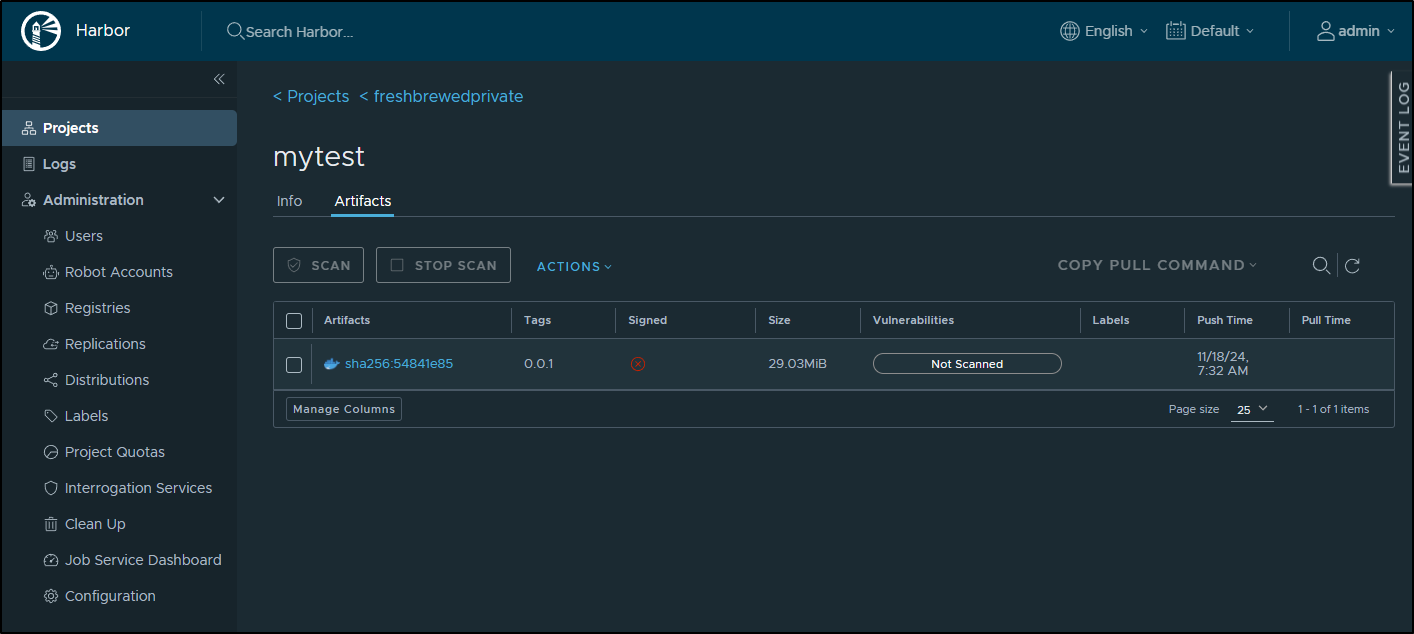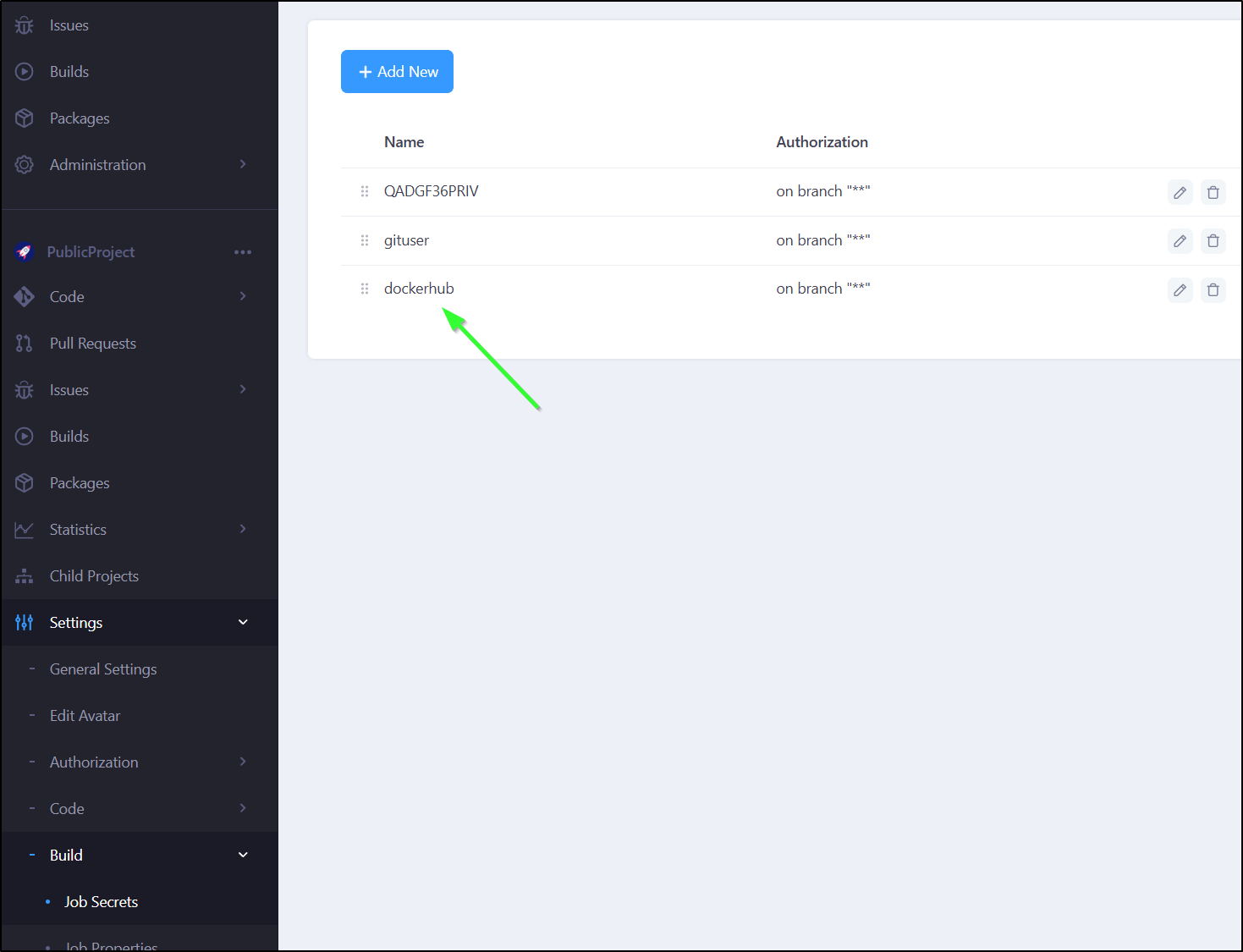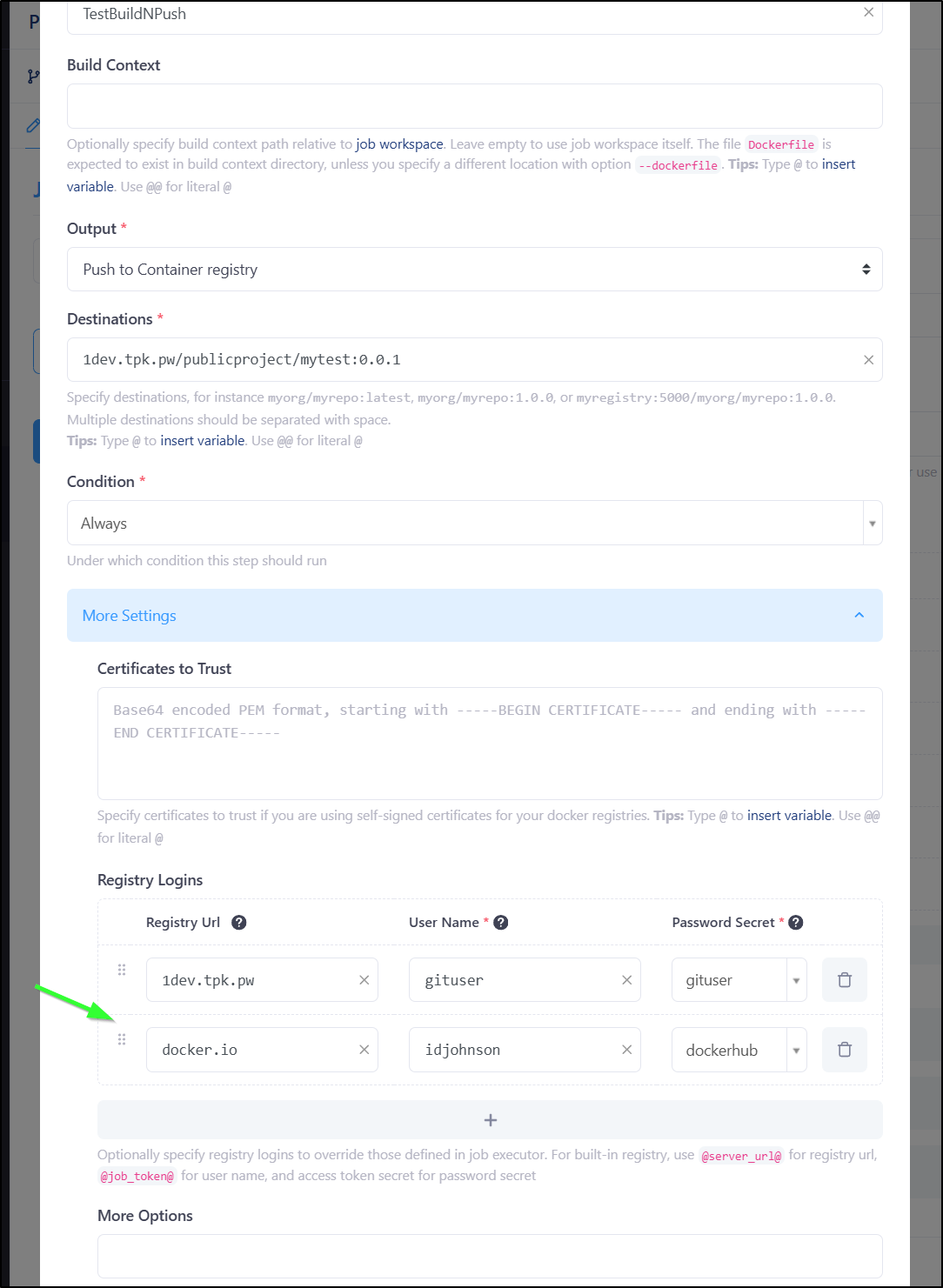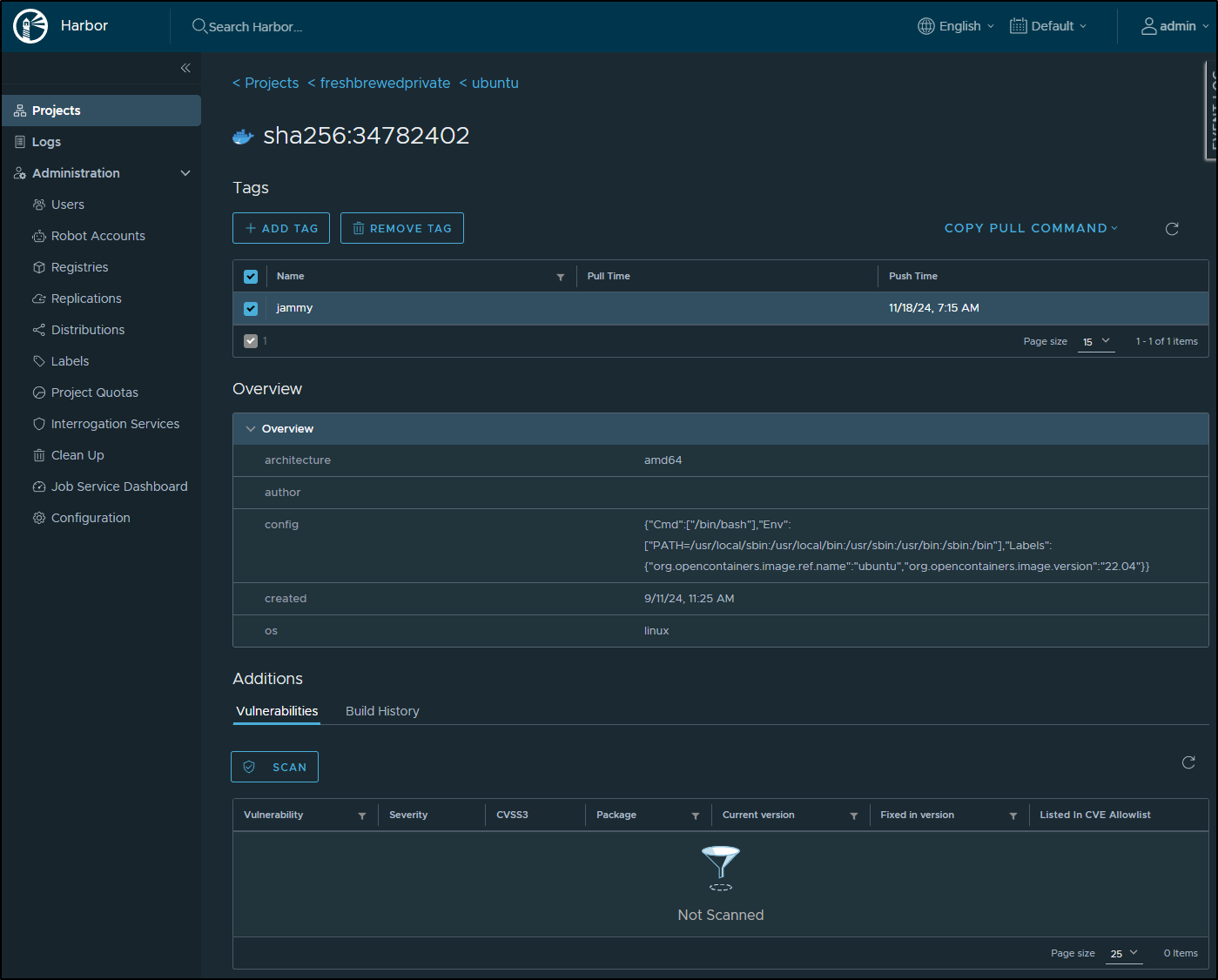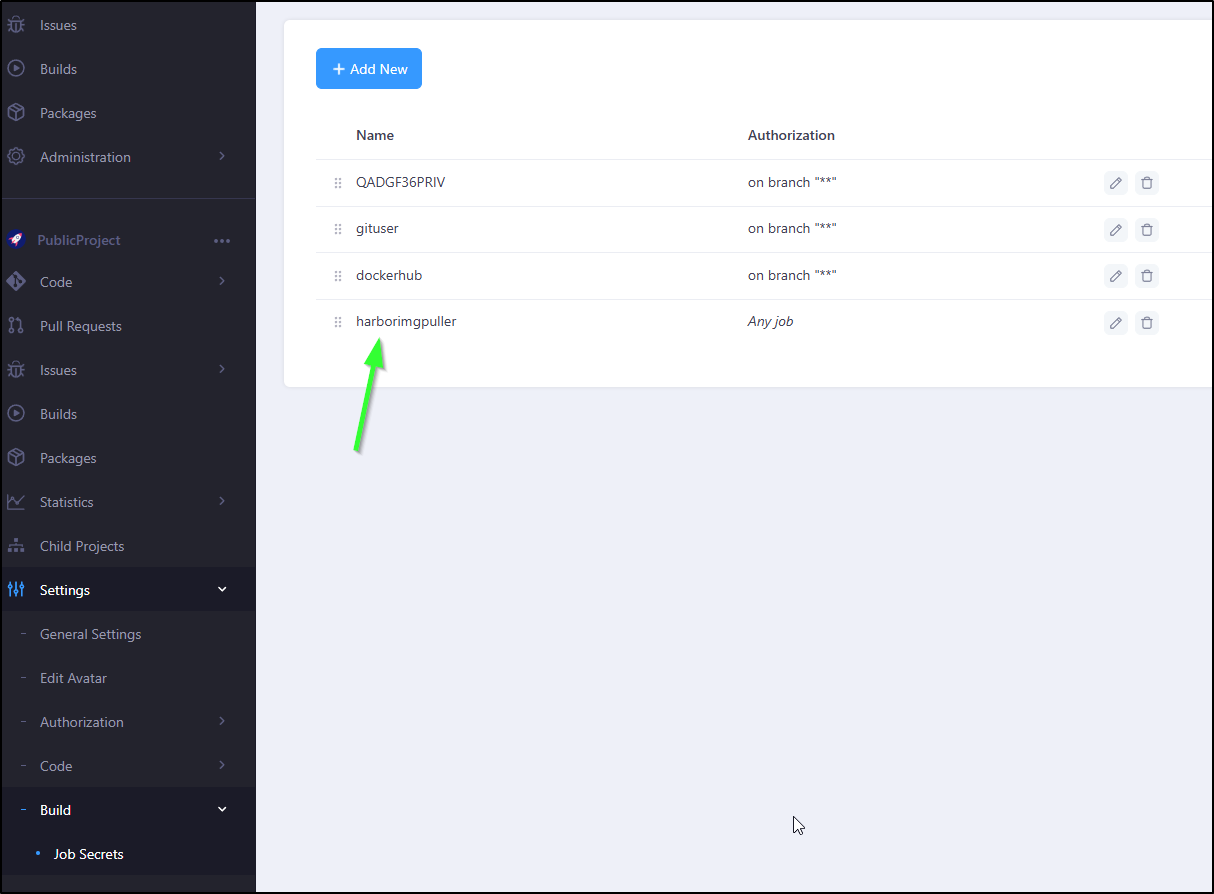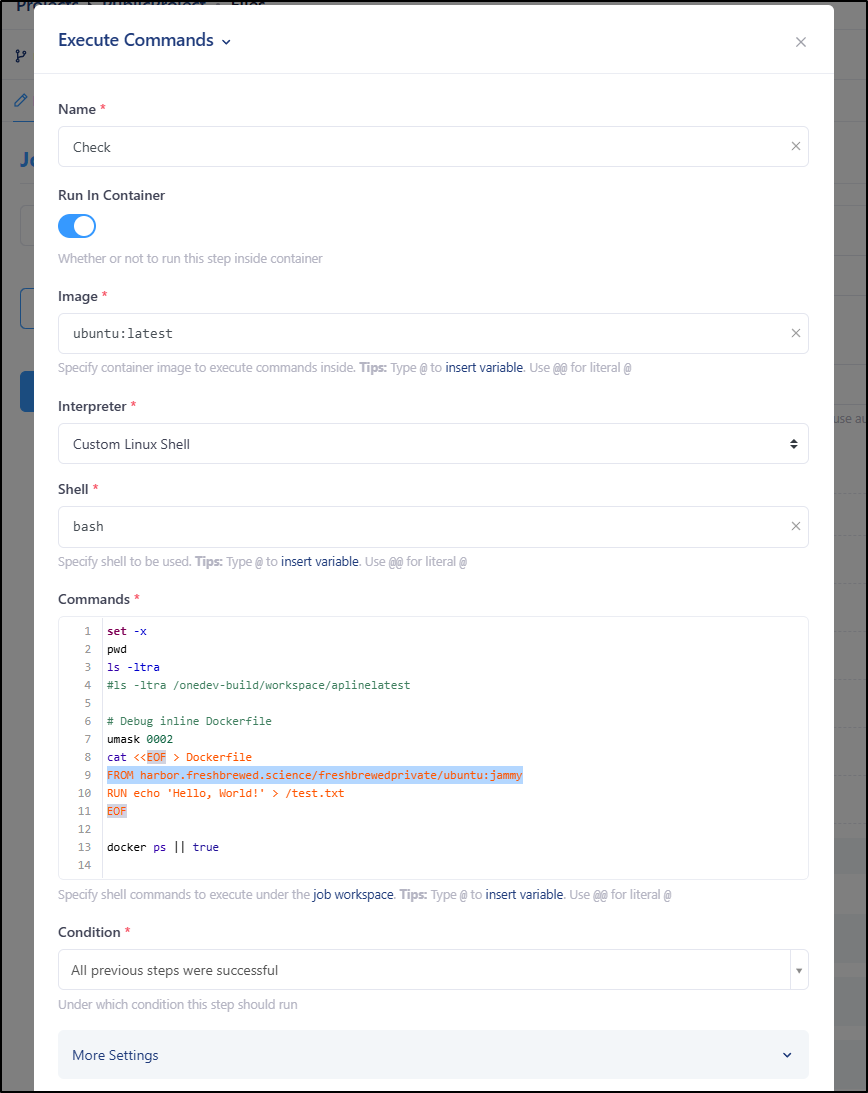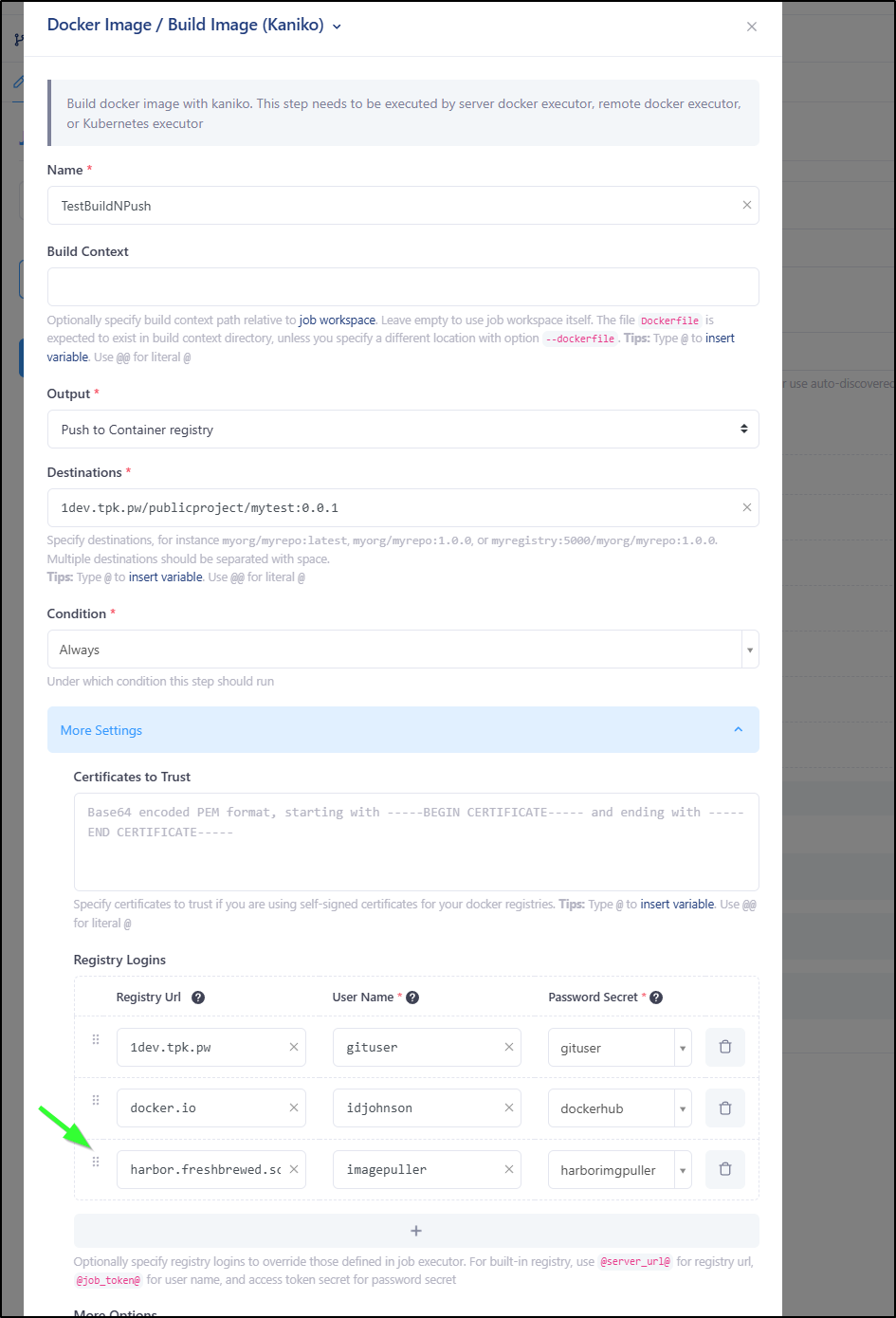Published: Nov 26, 2024 by Isaac Johnson
In our last post we checked out OneDev setting it up locally with their helm chart and adding an HTTPS TLS ingress.
Today, we will expand on that by setting up a proper HA DB backend and configuring full CICD pipelines. We also only glossed over artifacts so let’s dig into those as well.
Managed HA Database
According to the values we can use MySQL, MariaDB, PostgreSQL and MSSQL.
My newer NAS has MariaDB running natively so I’ll look to use that.
ijohnson@sirnasilot:~$ mysql -u root -p
Enter password:
Welcome to the MariaDB monitor. Commands end with ; or \g.
Your MariaDB connection id is 69293
Server version: 10.11.6-MariaDB Source distribution
Copyright (c) 2000, 2018, Oracle, MariaDB Corporation Ab and others.
Type 'help;' or '\h' for help. Type '\c' to clear the current input statement.
MariaDB [(none)]> CREATE DATABASE onedev CHARACTER SET 'utf8mb4' COLLATE 'utf8mb4_unicode_ci';
Query OK, 1 row affected (0.001 sec)
MariaDB [(none)]> create user 'onedev'@'%' identified by 'asdfasdsadf';
Query OK, 0 rows affected (1.049 sec)
MariaDB [(none)]> grant all privileges on onedev.* to 'onedev'@'%';
Query OK, 0 rows affected (0.085 sec)
MariaDB [(none)]> FLUSH PRIVILEGES;
Query OK, 0 rows affected (0.001 sec)
MariaDB [(none)]> \q
Bye
I’m going to try and upgrade, but do not expect it to actually migrate over to an external database. My guess is this will reset the instance.
$ helm upgrade onedev --install -n onedev --create-namespace --set database.external=true --set database.type=mariadb --set database.host=192.168.1.116 --set database.port=3306 --set database.name=onedev --set database.user=onedev --set database.password=asdfasfasdf onedev/onedev
Release "onedev" has been upgraded. Happy Helming!
NAME: onedev
LAST DEPLOYED: Sat Nov 16 16:35:48 2024
NAMESPACE: onedev
STATUS: deployed
REVISION: 2
TEST SUITE: None
NOTES:
CHART NAME: onedev
CHART VERSION: 11.5.2
APP VERSION: 11.5.2
###################################################################
#
# CAUTION: If you are upgrading from version <= 9.0.0, please make
# sure to follow https://docs.onedev.io/upgrade-guide/deploy-to-k8s
# to migrate your data
#
###################################################################
** Please be patient while the chart is being deployed **
Get the OneDev URL by running:
kubectl port-forward --namespace onedev svc/onedev 6610:80 &
URL: http://127.0.0.1:6610
It errored, but I’m not sure why
$ kubectl logs onedev-0 -n onedev
--> Wrapper Started as Console
Java Service Wrapper Standard Edition 64-bit 3.5.51
Copyright (C) 1999-2022 Tanuki Software, Ltd. All Rights Reserved.
http://wrapper.tanukisoftware.com
Licensed to OneDev for Service Wrapping
Launching a JVM...
WrapperManager: Initializing...
INFO - Launching application from '/app'...
INFO - Starting application...
ERROR - Error booting application
com.google.inject.CreationException: Unable to create injector, see the following errors:
1) [Guice/MissingImplementation]: No implementation for Set<ServerConfigurator> was bound.
Requested by:
1 : DefaultJettyLauncher.<init>(DefaultJettyLauncher.java:52)
\_ for 3rd parameter
at CoreModule.configure(CoreModule.java:176)
\_ installed by: Modules$OverrideModule -> Modules$OverrideModule -> Modules$OverrideModule -> Modules$OverrideModule -> Modules$OverrideModule -> Modules$OverrideModule -> Modules$OverrideModule -> Modules$OverrideModule -> Modules$OverrideModule -> Modules$OverrideModule -> Modules$OverrideModule -> Modules$OverrideModule -> Modules$OverrideModule -> Modules$OverrideModule -> Modules$OverrideModule -> Modules$OverrideModule -> Modules$OverrideModule -> Modules$OverrideModule -> Modules$OverrideModule -> Modules$OverrideModule -> Modules$OverrideModule -> Modules$OverrideModule -> Modules$OverrideModule -> Modules$OverrideModule -> Modules$OverrideModule -> Modules$OverrideModule -> Modules$OverrideModule -> Modules$OverrideModule -> Modules$OverrideModule -> Modules$OverrideModule -> Modules$OverrideModule -> Modules$OverrideModule -> Modules$OverrideModule -> Modules$OverrideModule -> Modules$OverrideModule -> Modules$OverrideModule -> Modules$OverrideModule -> Modules$OverrideModule -> Modules$OverrideModule -> Modules$OverrideModule -> Modules$OverrideModule -> Modules$OverrideModule -> Modules$OverrideModule -> Modules$OverrideModule -> Modules$OverrideModule -> Modules$OverrideModule -> Modules$OverrideModule -> Modules$OverrideModule -> Modules$OverrideModule -> Modules$OverrideModule -> Modules$OverrideModule -> Modules$OverrideModule -> Modules$OverrideModule -> Modules$OverrideModule -> Modules$OverrideModule -> Modules$OverrideModule -> Modules$OverrideModule -> Modules$OverrideModule -> Modules$OverrideModule -> Modules$OverrideModule -> Modules$OverrideModule -> Modules$OverrideModule -> CoreModule
Learn more:
https://github.com/google/guice/wiki/MISSING_IMPLEMENTATION
2) [Guice/MissingImplementation]: No implementation for Set<ProjectNameReservation> was bound.
Requested by:
1 : DefaultProjectManager.<init>(DefaultProjectManager.java:208)
\_ for 24th parameter
at CoreModule.configure(CoreModule.java:212)
\_ installed by: Modules$OverrideModule -> Modules$OverrideModule -> Modules$OverrideModule -> Modules$OverrideModule -> Modules$OverrideModule -> Modules$OverrideModule -> Modules$OverrideModule -> Modules$OverrideModule -> Modules$OverrideModule -> Modules$OverrideModule -> Modules$OverrideModule -> Modules$OverrideModule -> Modules$OverrideModule -> Modules$OverrideModule -> Modules$OverrideModule -> Modules$OverrideModule -> Modules$OverrideModule -> Modules$OverrideModule -> Modules$OverrideModule -> Modules$OverrideModule -> Modules$OverrideModule -> Modules$OverrideModule -> Modules$OverrideModule -> Modules$OverrideModule -> Modules$OverrideModule -> Modules$OverrideModule -> Modules$OverrideModule -> Modules$OverrideModule -> Modules$OverrideModule -> Modules$OverrideModule -> Modules$OverrideModule -> Modules$OverrideModule -> Modules$OverrideModule -> Modules$OverrideModule -> Modules$OverrideModule -> Modules$OverrideModule -> Modules$OverrideModule -> Modules$OverrideModule -> Modules$OverrideModule -> Modules$OverrideModule -> Modules$OverrideModule -> Modules$OverrideModule -> Modules$OverrideModule -> Modules$OverrideModule -> Modules$OverrideModule -> Modules$OverrideModule -> Modules$OverrideModule -> Modules$OverrideModule -> Modules$OverrideModule -> Modules$OverrideModule -> Modules$OverrideModule -> Modules$OverrideModule -> Modules$OverrideModule -> Modules$OverrideModule -> Modules$OverrideModule -> Modules$OverrideModule -> Modules$OverrideModule -> Modules$OverrideModule -> Modules$OverrideModule -> Modules$OverrideModule -> Modules$OverrideModule -> Modules$OverrideModule -> CoreModule
Learn more:
https://github.com/google/guice/wiki/MISSING_IMPLEMENTATION
3) An exception was caught and reported. Message: For input string: "%!s(int64=3306)"
at Modules$OverrideModule.configure(Modules.java:236)
4) [Guice/MissingConstructor]: No injectable constructor for type ServerConfig.
class ServerConfig does not have a @Inject annotated constructor or a no-arg constructor.
Requested by:
1 : ServerConfig.class(ServerConfig.java:23)
at ProductModule.configure(ProductModule.java:23)
\_ installed by: Modules$OverrideModule -> Modules$OverrideModule -> ProductModule
Learn more:
https://github.com/google/guice/wiki/MISSING_CONSTRUCTOR
4 errors
======================
Full classname legend:
======================
CoreModule: "io.onedev.server.CoreModule"
DefaultJettyLauncher: "io.onedev.server.jetty.DefaultJettyLauncher"
DefaultProjectManager: "io.onedev.server.entitymanager.impl.DefaultProjectManager"
Modules$OverrideModule: "com.google.inject.util.Modules$OverrideModule"
ProductModule: "io.onedev.server.product.ProductModule"
ProjectNameReservation: "io.onedev.server.util.ProjectNameReservation"
ServerConfig: "io.onedev.server.ServerConfig"
ServerConfigurator: "io.onedev.server.jetty.ServerConfigurator"
========================
End of classname legend:
========================
at com.google.inject.internal.Errors.throwCreationExceptionIfErrorsExist(Errors.java:576)
at com.google.inject.internal.InternalInjectorCreator.initializeStatically(InternalInjectorCreator.java:163)
at com.google.inject.internal.InternalInjectorCreator.build(InternalInjectorCreator.java:110)
at com.google.inject.Guice.createInjector(Guice.java:87)
at com.google.inject.Guice.createInjector(Guice.java:69)
at com.google.inject.Guice.createInjector(Guice.java:59)
at io.onedev.commons.loader.AppLoader.start(AppLoader.java:52)
at io.onedev.commons.bootstrap.Bootstrap.main(Bootstrap.java:200)
at java.base/jdk.internal.reflect.NativeMethodAccessorImpl.invoke0(Native Method)
at java.base/jdk.internal.reflect.NativeMethodAccessorImpl.invoke(NativeMethodAccessorImpl.java:62)
at java.base/jdk.internal.reflect.DelegatingMethodAccessorImpl.invoke(DelegatingMethodAccessorImpl.java:43)
at java.base/java.lang.reflect.Method.invoke(Method.java:566)
at org.tanukisoftware.wrapper.WrapperSimpleApp.run(WrapperSimpleApp.java:349)
at java.base/java.lang.Thread.run(Thread.java:829)
Caused by: java.lang.NumberFormatException: For input string: "%!s(int64=3306)"
at java.base/java.lang.NumberFormatException.forInputString(NumberFormatException.java:65)
at java.base/java.lang.Integer.parseInt(Integer.java:638)
at java.base/java.lang.Integer.parseInt(Integer.java:770)
at io.onedev.server.ServerConfig.<init>(ServerConfig.java:98)
at io.onedev.server.product.ProductModule.configure(ProductModule.java:23)
at com.google.inject.AbstractModule.configure(AbstractModule.java:66)
at com.google.inject.spi.Elements$RecordingBinder.install(Elements.java:409)
at com.google.inject.spi.Elements.getElements(Elements.java:108)
at com.google.inject.util.Modules$OverrideModule.configure(Modules.java:236)
at com.google.inject.AbstractModule.configure(AbstractModule.java:66)
at com.google.inject.spi.Elements$RecordingBinder.install(Elements.java:409)
at com.google.inject.spi.Elements.getElements(Elements.java:108)
at com.google.inject.util.Modules$OverrideModule.configure(Modules.java:213)
at com.google.inject.AbstractModule.configure(AbstractModule.java:66)
at com.google.inject.spi.Elements$RecordingBinder.install(Elements.java:409)
at com.google.inject.spi.Elements.getElements(Elements.java:108)
at com.google.inject.internal.InjectorShell$Builder.build(InjectorShell.java:160)
at com.google.inject.internal.InternalInjectorCreator.build(InternalInjectorCreator.java:107)
... 11 common frames omitted
INFO - Stopping application...
<-- Wrapper Stopped
I killed it and it came back up
$ kubectl delete pod onedev-0 -n onedev
pod "onedev-0" deleted
$ kubectl get pods -n onedev
NAME READY STATUS RESTARTS AGE
onedev-0 1/1 Running 0 5s
$ kubectl get pods -n onedev
NAME READY STATUS RESTARTS AGE
onedev-0 0/1 Error 1 (22s ago) 31s
I’m okay starting over at the moment, so I will uninstall
$ helm delete onedev -n onedev
release "onedev" uninstalled
then delete the PVC manually
$ kubectl get pvc -n onedev
NAME STATUS VOLUME CAPACITY ACCESS MODES STORAGECLASS AGE
data-onedev-0 Bound pvc-a86b22bc-f10f-4faa-8dd5-28554eefd2c4 100Gi RWO local-path 8h
$ kubectl delete pvc data-onedev-0 -n onedev
persistentvolumeclaim "data-onedev-0" deleted
$ kubectl get pvc -n onedev
No resources found in onedev namespace.
Now to try fresh
$ helm upgrade onedev --install -n onedev --create-namespace --set database.external=true --set database.type=mariadb --set database.host=192.168.1.116 --set database.port=3306 --set database.name=onedev --set database.user=onedev --set database.password=OneDev_88432211 onedev/onedev
Release "onedev" does not exist. Installing it now.
NAME: onedev
LAST DEPLOYED: Sat Nov 16 16:43:26 2024
NAMESPACE: onedev
STATUS: deployed
REVISION: 1
TEST SUITE: None
NOTES:
CHART NAME: onedev
CHART VERSION: 11.5.2
APP VERSION: 11.5.2
###################################################################
#
# CAUTION: If you are upgrading from version <= 9.0.0, please make
# sure to follow https://docs.onedev.io/upgrade-guide/deploy-to-k8s
# to migrate your data
#
###################################################################
** Please be patient while the chart is being deployed **
Get the OneDev URL by running:
kubectl port-forward --namespace onedev svc/onedev 6610:80 &
URL: http://127.0.0.1:6610
Same error again. I’ll try with “mysql” instead of “mariadb”
$ helm upgrade onedev --install -n onedev --create-namespace --set database.external=true --set database.type=mysql --set database.host=192.168.1.116 --set database.port=3306 --set database.name=onedev --set database.user=onedev --set database.password=OneDev_88432211 onedev/onedev
Release "onedev" does not exist. Installing it now.
NAME: onedev
LAST DEPLOYED: Sat Nov 16 16:44:57 2024
NAMESPACE: onedev
STATUS: deployed
REVISION: 1
TEST SUITE: None
NOTES:
CHART NAME: onedev
CHART VERSION: 11.5.2
APP VERSION: 11.5.2
###################################################################
#
# CAUTION: If you are upgrading from version <= 9.0.0, please make
# sure to follow https://docs.onedev.io/upgrade-guide/deploy-to-k8s
# to migrate your data
#
###################################################################
** Please be patient while the chart is being deployed **
Get the OneDev URL by running:
kubectl port-forward --namespace onedev svc/onedev 6610:80 &
URL: http://127.0.0.1:6610
Still no luck.
Let’s attempt a PSQL database
builder@isaac-MacBookAir:~$ sudo su - postgres
postgres@isaac-MacBookAir:~$ psql
psql (14.13 (Ubuntu 14.13-0ubuntu0.22.04.1))
Type "help" for help.
postgres=# create user onedev with password 'one@dev1234555';
CREATE ROLE
postgres=# create database onedev;
CREATE DATABASE
postgres=# grant all privileges on database onedev to onedev;
GRANT
postgres=# \q
I’ll try PostgreSQL now
$ helm upgrade onedev --install -n onedev --create-namespace --set database.external=true --set database.type=postgresql --set database.host=192.168.1.78 --set database.port=5432 --set database.name=onedev --set database.user=onedev --set database.password=one@dev1234555 onedev/onedev
Release "onedev" does not exist. Installing it now.
NAME: onedev
LAST DEPLOYED: Sat Nov 16 16:54:01 2024
NAMESPACE: onedev
STATUS: deployed
REVISION: 1
TEST SUITE: None
NOTES:
CHART NAME: onedev
CHART VERSION: 11.5.2
APP VERSION: 11.5.2
###################################################################
#
# CAUTION: If you are upgrading from version <= 9.0.0, please make
# sure to follow https://docs.onedev.io/upgrade-guide/deploy-to-k8s
# to migrate your data
#
###################################################################
** Please be patient while the chart is being deployed **
Get the OneDev URL by running:
kubectl port-forward --namespace onedev svc/onedev 6610:80 &
URL: http://127.0.0.1:6610
But that too is in a crash loop
builder@DESKTOP-QADGF36:~$ kubectl logs onedev-0 -n onedev
--> Wrapper Started as Console
Java Service Wrapper Standard Edition 64-bit 3.5.51
Copyright (C) 1999-2022 Tanuki Software, Ltd. All Rights Reserved.
http://wrapper.tanukisoftware.com
Licensed to OneDev for Service Wrapping
Launching a JVM...
WrapperManager: Initializing...
INFO - Launching application from '/app'...
INFO - Starting application...
ERROR - Error booting application
com.google.inject.CreationException: Unable to create injector, see the following errors:
1) [Guice/MissingImplementation]: No implementation for Set<ServerConfigurator> was bound.
Requested by:
1 : DefaultJettyLauncher.<init>(DefaultJettyLauncher.java:52)
\_ for 3rd parameter
at CoreModule.configure(CoreModule.java:176)
\_ installed by: Modules$OverrideModule -> Modules$OverrideModule -> Modules$OverrideModule -> Modules$OverrideModule -> Modules$OverrideModule -> Modules$OverrideModule -> Modules$OverrideModule -> Modules$OverrideModule -> Modules$OverrideModule -> Modules$OverrideModule -> Modules$OverrideModule -> Modules$OverrideModule -> Modules$OverrideModule -> Modules$OverrideModule -> Modules$OverrideModule -> Modules$OverrideModule -> Modules$OverrideModule -> Modules$OverrideModule -> Modules$OverrideModule -> Modules$OverrideModule -> Modules$OverrideModule -> Modules$OverrideModule -> Modules$OverrideModule -> Modules$OverrideModule -> Modules$OverrideModule -> Modules$OverrideModule -> Modules$OverrideModule -> Modules$OverrideModule -> Modules$OverrideModule -> Modules$OverrideModule -> Modules$OverrideModule -> Modules$OverrideModule -> Modules$OverrideModule -> Modules$OverrideModule -> Modules$OverrideModule -> Modules$OverrideModule -> Modules$OverrideModule -> Modules$OverrideModule -> Modules$OverrideModule -> Modules$OverrideModule -> Modules$OverrideModule -> Modules$OverrideModule -> Modules$OverrideModule -> Modules$OverrideModule -> Modules$OverrideModule -> Modules$OverrideModule -> Modules$OverrideModule -> Modules$OverrideModule -> Modules$OverrideModule -> Modules$OverrideModule -> Modules$OverrideModule -> Modules$OverrideModule -> Modules$OverrideModule -> Modules$OverrideModule -> Modules$OverrideModule -> Modules$OverrideModule -> Modules$OverrideModule -> Modules$OverrideModule -> Modules$OverrideModule -> Modules$OverrideModule -> Modules$OverrideModule -> Modules$OverrideModule -> CoreModule
Learn more:
https://github.com/google/guice/wiki/MISSING_IMPLEMENTATION
2) [Guice/MissingImplementation]: No implementation for Set<ProjectNameReservation> was bound.
Requested by:
1 : DefaultProjectManager.<init>(DefaultProjectManager.java:208)
\_ for 24th parameter
at CoreModule.configure(CoreModule.java:212)
\_ installed by: Modules$OverrideModule -> Modules$OverrideModule -> Modules$OverrideModule -> Modules$OverrideModule -> Modules$OverrideModule -> Modules$OverrideModule -> Modules$OverrideModule -> Modules$OverrideModule -> Modules$OverrideModule -> Modules$OverrideModule -> Modules$OverrideModule -> Modules$OverrideModule -> Modules$OverrideModule -> Modules$OverrideModule -> Modules$OverrideModule -> Modules$OverrideModule -> Modules$OverrideModule -> Modules$OverrideModule -> Modules$OverrideModule -> Modules$OverrideModule -> Modules$OverrideModule -> Modules$OverrideModule -> Modules$OverrideModule -> Modules$OverrideModule -> Modules$OverrideModule -> Modules$OverrideModule -> Modules$OverrideModule -> Modules$OverrideModule -> Modules$OverrideModule -> Modules$OverrideModule -> Modules$OverrideModule -> Modules$OverrideModule -> Modules$OverrideModule -> Modules$OverrideModule -> Modules$OverrideModule -> Modules$OverrideModule -> Modules$OverrideModule -> Modules$OverrideModule -> Modules$OverrideModule -> Modules$OverrideModule -> Modules$OverrideModule -> Modules$OverrideModule -> Modules$OverrideModule -> Modules$OverrideModule -> Modules$OverrideModule -> Modules$OverrideModule -> Modules$OverrideModule -> Modules$OverrideModule -> Modules$OverrideModule -> Modules$OverrideModule -> Modules$OverrideModule -> Modules$OverrideModule -> Modules$OverrideModule -> Modules$OverrideModule -> Modules$OverrideModule -> Modules$OverrideModule -> Modules$OverrideModule -> Modules$OverrideModule -> Modules$OverrideModule -> Modules$OverrideModule -> Modules$OverrideModule -> Modules$OverrideModule -> CoreModule
Learn more:
https://github.com/google/guice/wiki/MISSING_IMPLEMENTATION
3) An exception was caught and reported. Message: For input string: "%!s(int64=5432)"
at Modules$OverrideModule.configure(Modules.java:236)
4) [Guice/MissingConstructor]: No injectable constructor for type ServerConfig.
class ServerConfig does not have a @Inject annotated constructor or a no-arg constructor.
Requested by:
1 : ServerConfig.class(ServerConfig.java:23)
at ProductModule.configure(ProductModule.java:23)
\_ installed by: Modules$OverrideModule -> Modules$OverrideModule -> ProductModule
Learn more:
https://github.com/google/guice/wiki/MISSING_CONSTRUCTOR
4 errors
======================
Full classname legend:
======================
CoreModule: "io.onedev.server.CoreModule"
DefaultJettyLauncher: "io.onedev.server.jetty.DefaultJettyLauncher"
DefaultProjectManager: "io.onedev.server.entitymanager.impl.DefaultProjectManager"
Modules$OverrideModule: "com.google.inject.util.Modules$OverrideModule"
ProductModule: "io.onedev.server.product.ProductModule"
ProjectNameReservation: "io.onedev.server.util.ProjectNameReservation"
ServerConfig: "io.onedev.server.ServerConfig"
ServerConfigurator: "io.onedev.server.jetty.ServerConfigurator"
========================
End of classname legend:
========================
at com.google.inject.internal.Errors.throwCreationExceptionIfErrorsExist(Errors.java:576)
at com.google.inject.internal.InternalInjectorCreator.initializeStatically(InternalInjectorCreator.java:163)
at com.google.inject.internal.InternalInjectorCreator.build(InternalInjectorCreator.java:110)
at com.google.inject.Guice.createInjector(Guice.java:87)
at com.google.inject.Guice.createInjector(Guice.java:69)
at com.google.inject.Guice.createInjector(Guice.java:59)
at io.onedev.commons.loader.AppLoader.start(AppLoader.java:52)
at io.onedev.commons.bootstrap.Bootstrap.main(Bootstrap.java:200)
at java.base/jdk.internal.reflect.NativeMethodAccessorImpl.invoke0(Native Method)
at java.base/jdk.internal.reflect.NativeMethodAccessorImpl.invoke(NativeMethodAccessorImpl.java:62)
at java.base/jdk.internal.reflect.DelegatingMethodAccessorImpl.invoke(DelegatingMethodAccessorImpl.java:43)
at java.base/java.lang.reflect.Method.invoke(Method.java:566)
at org.tanukisoftware.wrapper.WrapperSimpleApp.run(WrapperSimpleApp.java:349)
at java.base/java.lang.Thread.run(Thread.java:829)
Caused by: java.lang.NumberFormatException: For input string: "%!s(int64=5432)"
at java.base/java.lang.NumberFormatException.forInputString(NumberFormatException.java:65)
at java.base/java.lang.Integer.parseInt(Integer.java:638)
at java.base/java.lang.Integer.parseInt(Integer.java:770)
at io.onedev.server.ServerConfig.<init>(ServerConfig.java:118)
at io.onedev.server.product.ProductModule.configure(ProductModule.java:23)
at com.google.inject.AbstractModule.configure(AbstractModule.java:66)
at com.google.inject.spi.Elements$RecordingBinder.install(Elements.java:409)
at com.google.inject.spi.Elements.getElements(Elements.java:108)
at com.google.inject.util.Modules$OverrideModule.configure(Modules.java:236)
at com.google.inject.AbstractModule.configure(AbstractModule.java:66)
at com.google.inject.spi.Elements$RecordingBinder.install(Elements.java:409)
at com.google.inject.spi.Elements.getElements(Elements.java:108)
at com.google.inject.util.Modules$OverrideModule.configure(Modules.java:213)
at com.google.inject.AbstractModule.configure(AbstractModule.java:66)
at com.google.inject.spi.Elements$RecordingBinder.install(Elements.java:409)
at com.google.inject.spi.Elements.getElements(Elements.java:108)
at com.google.inject.internal.InjectorShell$Builder.build(InjectorShell.java:160)
at com.google.inject.internal.InternalInjectorCreator.build(InternalInjectorCreator.java:107)
... 11 common frames omitted
INFO - Stopping application...
<-- Wrapper Stopped
builder@DESKTOP-QADGF36:~$ kubectl get pods -n onedev
NAME READY STATUS RESTARTS AGE
onedev-0 0/1 CrashLoopBackOff 4 (37s ago) 2m56s
I’m stumped - I used this database for other K8s workloads so it’s not the pg_hba.conf or anything.
I tested the connection and it’s fine
builder@DESKTOP-QADGF36:~$ psql -h 192.168.1.78 -U onedev
Password for user onedev:
psql (12.20 (Ubuntu 12.20-0ubuntu0.20.04.1), server 14.13 (Ubuntu 14.13-0ubuntu0.22.04.1))
WARNING: psql major version 12, server major version 14.
Some psql features might not work.
SSL connection (protocol: TLSv1.3, cipher: TLS_AES_256_GCM_SHA384, bits: 256, compression: off)
Type "help" for help.
onedev=> \dt;
Did not find any relations.
onedev=>
I’m going to try one last attempt - this time deleting the namespace and starting with a unique release name and namespace (incase there are left over local-path files)
$ kubectl delete pvc data-onedev-0 -n onedev
persistentvolumeclaim "data-onedev-0" deleted
$ kubectl delete ns onedev
namespace "onedev" deleted
$ helm install onedevprd -n onedevprd --create-namespace --set database.external=true --set database.type=postgresql --set database.host=192.168.1.78 --set database.port=5432 --set database.name=onedev --set database.user=onedev --set database.password=one@dev1234555 onedev/onedev
NAME: onedevprd
LAST DEPLOYED: Sat Nov 16 17:01:10 2024
NAMESPACE: onedevprd
STATUS: deployed
REVISION: 1
TEST SUITE: None
NOTES:
CHART NAME: onedev
CHART VERSION: 11.5.2
APP VERSION: 11.5.2
###################################################################
#
# CAUTION: If you are upgrading from version <= 9.0.0, please make
# sure to follow https://docs.onedev.io/upgrade-guide/deploy-to-k8s
# to migrate your data
#
###################################################################
** Please be patient while the chart is being deployed **
Get the OneDev URL by running:
kubectl port-forward --namespace onedevprd svc/onedevprd 6610:80 &
URL: http://127.0.0.1:6610
I’m going to try the Multiple Cluster option, though this requires a license, but it does use a different Database syntax
builder@builder-T100:~$ docker run -h builder-T100 -it --rm -v $(pwd)/onedev:/opt/onedev -v /var/run/docker.sock:/var/run/docker.sock -e hibernate_dialect=io.onedev.server.persistence.PostgreSQLDialect -e hibernate_connection_driver_class=org.postgresql.Driver -e hibernate_connection_url=jdbc:postgresql://192.168.1.78:5432/onedev -e hibernate_connection_username=onedev -e hibernate_connection_password=one@dev1234555 -e cluster_ip=192.168.1.100 -p 6610:6610 -p 6611:6611 -p 5710:5710 1dev/server
Unable to find image '1dev/server:latest' locally
latest: Pulling from 1dev/server
ff65ddf9395b: Already exists
6e8b471a48b7: Pull complete
613cee5b4025: Pull complete
8f5c9b4e2d9d: Pull complete
f65a5d829bbe: Pull complete
e29167235ec0: Pull complete
9142d3ec8237: Pull complete
2644f6e4afcf: Pull complete
Digest: sha256:e37c8bf9902cb643bbb2f6bda698290204f8297149d49f8630b749c63fa89aee
Status: Downloaded newer image for 1dev/server:latest
--> Wrapper Started as Console
Java Service Wrapper Standard Edition 64-bit 3.5.51
Copyright (C) 1999-2022 Tanuki Software, Ltd. All Rights Reserved.
http://wrapper.tanukisoftware.com
Licensed to OneDev for Service Wrapping
Launching a JVM...
WrapperManager: Initializing...
INFO - Launching application from '/app'...
INFO - Starting application...
INFO - Successfully checked /opt/onedev
INFO - Stopping application...
<-- Wrapper Stopped
--> Wrapper Started as Console
Java Service Wrapper Standard Edition 64-bit 3.5.51
Copyright (C) 1999-2022 Tanuki Software, Ltd. All Rights Reserved.
http://wrapper.tanukisoftware.com
Licensed to OneDev for Service Wrapping
Launching a JVM...
WrapperManager: Initializing...
12:07:42 INFO i.onedev.commons.bootstrap.Bootstrap - Launching application from '/opt/onedev'...
12:07:42 INFO i.onedev.commons.bootstrap.Bootstrap - Cleaning temp directory...
12:07:44 INFO io.onedev.commons.loader.AppLoader - Starting application...
That seemed to go nowhere, so i tried on a larger host (note: coming back i found it crashed the dockerhost…)
builder@isaac-MacBookAir:~$ sudo docker run -h isaac-MacBookAir -d -v /home/builder/onedev:/opt/onedev -v /var/run/docker.sock:/var/run/docker.sock -e hibernate_dialect=io.onedev.server.persistence.PostgreSQLDialect -e hibernate_connection_driver_class=org.postgresql.Driver -e hibernate_connection_url=jdbc:postgresql://192.168.1.78:5432/onedev -e hibernate_connection_username=onedev -e hibernate_connection_password=one@dev1234555 -e cluster_ip=192.168.1.100 -p 6610:6610 -p 6611:6611 -p 5710:5710 1dev/server
Unable to find image '1dev/server:latest' locally
latest: Pulling from 1dev/server
ff65ddf9395b: Pull complete
6e8b471a48b7: Pull complete
613cee5b4025: Pull complete
8f5c9b4e2d9d: Pull complete
f65a5d829bbe: Pull complete
e29167235ec0: Pull complete
9142d3ec8237: Pull complete
2644f6e4afcf: Pull complete
Digest: sha256:e37c8bf9902cb643bbb2f6bda698290204f8297149d49f8630b749c63fa89aee
Status: Downloaded newer image for 1dev/server:latest
42c42805716d415c13b9827007526d60cbce125990d41447c644739626607263
That seemed to be going better, but then suggested the Docker VNet was blocked from posgres access
builder@isaac-MacBookAir:~$ sudo docker logs unruffled_blackburn
--> Wrapper Started as Console
Java Service Wrapper Standard Edition 64-bit 3.5.51
Copyright (C) 1999-2022 Tanuki Software, Ltd. All Rights Reserved.
http://wrapper.tanukisoftware.com
Licensed to OneDev for Service Wrapping
Launching a JVM...
WrapperManager: Initializing...
INFO - Launching application from '/app'...
INFO - Starting application...
INFO - Populating /opt/onedev...
INFO - Successfully populated /opt/onedev
INFO - Stopping application...
<-- Wrapper Stopped
--> Wrapper Started as Console
Java Service Wrapper Standard Edition 64-bit 3.5.51
Copyright (C) 1999-2022 Tanuki Software, Ltd. All Rights Reserved.
http://wrapper.tanukisoftware.com
Licensed to OneDev for Service Wrapping
Launching a JVM...
WrapperManager: Initializing...
12:15:06 INFO i.onedev.commons.bootstrap.Bootstrap - Launching application from '/opt/onedev'...
12:15:07 INFO io.onedev.commons.loader.AppLoader - Starting application...
12:15:12 ERROR i.onedev.commons.bootstrap.Bootstrap - Error booting application
java.lang.RuntimeException: org.postgresql.util.PSQLException: FATAL: no pg_hba.conf entry for host "172.17.0.2", user "onedev", database "onedev", SSL encryption
at io.onedev.commons.bootstrap.Bootstrap.unchecked(Bootstrap.java:319)
at io.onedev.commons.utils.ExceptionUtils.unchecked(ExceptionUtils.java:31)
at io.onedev.server.persistence.PersistenceUtils.openConnection(PersistenceUtils.java:38)
at io.onedev.server.data.DefaultDataManager.openConnection(DefaultDataManager.java:241)
at io.onedev.server.ee.clustering.DefaultClusterManager.start(DefaultClusterManager.java:102)
at io.onedev.server.OneDev.start(OneDev.java:140)
at io.onedev.commons.loader.DefaultPluginManager.start(DefaultPluginManager.java:44)
at io.onedev.commons.loader.AppLoader.start(AppLoader.java:60)
at io.onedev.commons.bootstrap.Bootstrap.main(Bootstrap.java:200)
at java.base/jdk.internal.reflect.NativeMethodAccessorImpl.invoke0(Native Method)
at java.base/jdk.internal.reflect.NativeMethodAccessorImpl.invoke(NativeMethodAccessorImpl.java:62)
at java.base/jdk.internal.reflect.DelegatingMethodAccessorImpl.invoke(DelegatingMethodAccessorImpl.java:43)
at java.base/java.lang.reflect.Method.invoke(Method.java:566)
at org.tanukisoftware.wrapper.WrapperSimpleApp.run(WrapperSimpleApp.java:349)
at java.base/java.lang.Thread.run(Thread.java:829)
Caused by: org.postgresql.util.PSQLException: FATAL: no pg_hba.conf entry for host "172.17.0.2", user "onedev", database "onedev", SSL encryption
at org.postgresql.core.v3.ConnectionFactoryImpl.doAuthentication(ConnectionFactoryImpl.java:698)
at org.postgresql.core.v3.ConnectionFactoryImpl.tryConnect(ConnectionFactoryImpl.java:207)
at org.postgresql.core.v3.ConnectionFactoryImpl.openConnectionImpl(ConnectionFactoryImpl.java:262)
at org.postgresql.core.ConnectionFactory.openConnection(ConnectionFactory.java:54)
at org.postgresql.jdbc.PgConnection.<init>(PgConnection.java:273)
at org.postgresql.Driver.makeConnection(Driver.java:446)
at org.postgresql.Driver.connect(Driver.java:298)
at io.onedev.server.persistence.PersistenceUtils.openConnection(PersistenceUtils.java:36)
... 12 common frames omitted
Suppressed: org.postgresql.util.PSQLException: FATAL: no pg_hba.conf entry for host "172.17.0.2", user "onedev", database "onedev", no encryption
at org.postgresql.core.v3.ConnectionFactoryImpl.doAuthentication(ConnectionFactoryImpl.java:698)
at org.postgresql.core.v3.ConnectionFactoryImpl.tryConnect(ConnectionFactoryImpl.java:207)
at org.postgresql.core.v3.ConnectionFactoryImpl.openConnectionImpl(ConnectionFactoryImpl.java:271)
... 17 common frames omitted
12:15:12 INFO io.onedev.commons.loader.AppLoader - Stopping application...
<-- Wrapper Stopped
I updated the pga_hba.conf
$ sudo cat /var/lib/postgresql/14/main/pg_hba.conf
hostssl onedev onedev 172.17.0.1/24 md5
host onedev onedev 172.17.0.1/24 md5
The reloaded the changes
postgres@isaac-MacBookAir:~$ psql
psql (14.13 (Ubuntu 14.13-0ubuntu0.22.04.1))
Type "help" for help.
postgres=# SELECT pg_reload_conf();
pg_reload_conf
----------------
t
(1 row)
postgres=# \q
postgres@isaac-MacBookAir:~$ exit
logout
## Restored
And tried again
builder@isaac-MacBookAir:~$ sudo docker stop unruffled_blackburn
unruffled_blackburn
builder@isaac-MacBookAir:~$ sudo docker start unruffled_blackburn
unruffled_blackburn
I still saw the error so I’ll delete and retry
builder@isaac-MacBookAir:~$ sudo docker stop unruffled_blackburn
unruffled_blackburn
builder@isaac-MacBookAir:~$ sudo docker rm unruffled_blackburn
unruffled_blackburn
builder@isaac-MacBookAir:~$ sudo docker run -h isaac-MacBookAir -d -v /home/builder/onedev:/opt/onedev -v /var/run/docker.sock:/var/run/docker.sock -e hibernate_dialect=io.onedev.server.persistence.PostgreSQLDialect -e hibernate_connection_driver_class=org.postgresql.Driver -e hibernate_connection_url=jdbc:postgresql://192.168.1.78:5432/onedev -e hibernate_connection_username=onedev -e hibernate_connection_password=one@dev1234555 -e cluster_ip=192.168.1.100 -p 6610:6610 -p 6611:6611 -p 5710:5710 1dev/server
ec0964b8c3f4e53eb03412cc3d65e63255f872f14b8d223dad01ea1a30389bc6
But still no go
builder@isaac-MacBookAir:~$ sudo docker logs jovial_jennings
--> Wrapper Started as Console
Java Service Wrapper Standard Edition 64-bit 3.5.51
Copyright (C) 1999-2022 Tanuki Software, Ltd. All Rights Reserved.
http://wrapper.tanukisoftware.com
Licensed to OneDev for Service Wrapping
Launching a JVM...
WrapperManager: Initializing...
INFO - Launching application from '/app'...
INFO - Starting application...
INFO - Successfully checked /opt/onedev
INFO - Stopping application...
<-- Wrapper Stopped
--> Wrapper Started as Console
Java Service Wrapper Standard Edition 64-bit 3.5.51
Copyright (C) 1999-2022 Tanuki Software, Ltd. All Rights Reserved.
http://wrapper.tanukisoftware.com
Licensed to OneDev for Service Wrapping
Launching a JVM...
WrapperManager: Initializing...
12:26:19 INFO i.onedev.commons.bootstrap.Bootstrap - Launching application from '/opt/onedev'...
12:26:19 INFO i.onedev.commons.bootstrap.Bootstrap - Cleaning temp directory...
12:26:19 INFO io.onedev.commons.loader.AppLoader - Starting application...
12:26:25 ERROR i.onedev.commons.bootstrap.Bootstrap - Error booting application
java.lang.RuntimeException: org.postgresql.util.PSQLException: FATAL: no pg_hba.conf entry for host "172.17.0.2", user "onedev", database "onedev", SSL encryption
at io.onedev.commons.bootstrap.Bootstrap.unchecked(Bootstrap.java:319)
at io.onedev.commons.utils.ExceptionUtils.unchecked(ExceptionUtils.java:31)
at io.onedev.server.persistence.PersistenceUtils.openConnection(PersistenceUtils.java:38)
at io.onedev.server.data.DefaultDataManager.openConnection(DefaultDataManager.java:241)
at io.onedev.server.ee.clustering.DefaultClusterManager.start(DefaultClusterManager.java:102)
at io.onedev.server.OneDev.start(OneDev.java:140)
at io.onedev.commons.loader.DefaultPluginManager.start(DefaultPluginManager.java:44)
at io.onedev.commons.loader.AppLoader.start(AppLoader.java:60)
at io.onedev.commons.bootstrap.Bootstrap.main(Bootstrap.java:200)
at java.base/jdk.internal.reflect.NativeMethodAccessorImpl.invoke0(Native Method)
at java.base/jdk.internal.reflect.NativeMethodAccessorImpl.invoke(NativeMethodAccessorImpl.java:62)
at java.base/jdk.internal.reflect.DelegatingMethodAccessorImpl.invoke(DelegatingMethodAccessorImpl.java:43)
at java.base/java.lang.reflect.Method.invoke(Method.java:566)
at org.tanukisoftware.wrapper.WrapperSimpleApp.run(WrapperSimpleApp.java:349)
at java.base/java.lang.Thread.run(Thread.java:829)
Caused by: org.postgresql.util.PSQLException: FATAL: no pg_hba.conf entry for host "172.17.0.2", user "onedev", database "onedev", SSL encryption
at org.postgresql.core.v3.ConnectionFactoryImpl.doAuthentication(ConnectionFactoryImpl.java:698)
at org.postgresql.core.v3.ConnectionFactoryImpl.tryConnect(ConnectionFactoryImpl.java:207)
at org.postgresql.core.v3.ConnectionFactoryImpl.openConnectionImpl(ConnectionFactoryImpl.java:262)
at org.postgresql.core.ConnectionFactory.openConnection(ConnectionFactory.java:54)
at org.postgresql.jdbc.PgConnection.<init>(PgConnection.java:273)
at org.postgresql.Driver.makeConnection(Driver.java:446)
at org.postgresql.Driver.connect(Driver.java:298)
at io.onedev.server.persistence.PersistenceUtils.openConnection(PersistenceUtils.java:36)
... 12 common frames omitted
Suppressed: org.postgresql.util.PSQLException: FATAL: no pg_hba.conf entry for host "172.17.0.2", user "onedev", database "onedev", no encryption
at org.postgresql.core.v3.ConnectionFactoryImpl.doAuthentication(ConnectionFactoryImpl.java:698)
at org.postgresql.core.v3.ConnectionFactoryImpl.tryConnect(ConnectionFactoryImpl.java:207)
at org.postgresql.core.v3.ConnectionFactoryImpl.openConnectionImpl(ConnectionFactoryImpl.java:271)
... 17 common frames omitted
12:26:25 INFO io.onedev.commons.loader.AppLoader - Stopping application...
<-- Wrapper Stopped
Alerts
At the very least, I can ensure I get alerted if there are systemic failures.
I added a Notify user (after I re-setup the SendGrid SMTP settings)
Restoring
I’ll just assume something is busted since I’ve tried everything I can think of at this point.
I’ll restore the self-contained system and see if it comes back up
$ helm install onedev -n onedev --create-namespace onedev/onedev
NAME: onedev
LAST DEPLOYED: Sat Nov 16 17:05:44 2024
NAMESPACE: onedev
STATUS: deployed
REVISION: 1
TEST SUITE: None
NOTES:
CHART NAME: onedev
CHART VERSION: 11.5.2
APP VERSION: 11.5.2
###################################################################
#
# CAUTION: If you are upgrading from version <= 9.0.0, please make
# sure to follow https://docs.onedev.io/upgrade-guide/deploy-to-k8s
# to migrate your data
#
###################################################################
** Please be patient while the chart is being deployed **
Get the OneDev URL by running:
kubectl port-forward --namespace onedev svc/onedev 6610:80 &
URL: http://127.0.0.1:6610
Indeed it came up without issue. I’ll also add back the ingress
$ kubectl get pods -n onedev
NAME READY STATUS RESTARTS AGE
onedev-0 1/1 Running 0 27s
$ kubectl apply -f 1dev.ingress.yaml
ingress.networking.k8s.io/1devingress created
I had to set it up again, but it did some back
Now, they do have Database Backups, but it seems more of a flatfile system
To use a backup, we would have to transfer it to the pod and restore it using the command line:
builder@DESKTOP-QADGF36:~$ kubectl cp /mnt/c/Users/isaac/Downloads/backup.zip onedev-0:/opt/onedev/bin -n onedev
builder@DESKTOP-QADGF36:~$ kubectl exec -it onedev-0 -n onedev -- /bin/bash
root@onedev-0:/# cd /opt/onedev/bin
root@onedev-0:/opt/onedev/bin# ./restore-db.sh /opt/onedev/bin/backup.zip
Running OneDev Restore Database...
--> Wrapper Started as Console
Java Service Wrapper Standard Edition 64-bit 3.5.51
Copyright (C) 1999-2022 Tanuki Software, Ltd. All Rights Reserved.
http://wrapper.tanukisoftware.com
Licensed to OneDev for Service Wrapping
Launching a JVM...
WrapperManager: Initializing...
INFO - Launching application from '/opt/onedev'...
INFO - Starting application...
INFO - Restoring database from /opt/onedev/bin/backup.zip...
INFO - Waiting for server to stop...
INFO - Cleaning database...
INFO - Creating tables...
INFO - Importing data into database...
INFO - Importing from data file 'ModelVersions.xml'...
INFO - Importing from data file 'Roles.xml'...
INFO - Importing from data file 'Users.xml'...
INFO - Importing from data file 'LinkSpecs.xml'...
INFO - Importing from data file 'EmailAddresss.xml'...
INFO - Importing from data file 'Settings.xml'...
INFO - Applying foreign key constraints...
INFO - Database is successfully restored from /opt/onedev/bin/backup.zip
INFO - Stopping application...
<-- Wrapper Stopped
This blipped out the service while it rebooted internally but it did come back and i could log back in
From a DR perspective, this suffices. Ideally, I would use an external database, but if I took periodic backups I would be okay with it.
Branding
I can use the Branding area to update branding if desired for our OneDev portal
For me, the icons are quite small so it’s hardly readable
I updated to a bit more zoomed in logo which slightly improved it
That said, it does look nice on the login page
Build Agents
When we talked on pipelines last time, we really just focused on the self-contained setup. But in many systems, including Github Actions, Jenkins, and Azure DevOps, there are occasions that we want to push the build and release work out to controlled agents.
Onedev has the ability to use similar agents.
We go to “Administration/Agents”:
I can run via a VM command or in Docker
I can now get a command that includes a valid token to add an agent to my Dockerhost
The only difference in my invokation is I added “-d” to make it a daemon and not interactive
$ docker run -d -t -v /var/run/docker.sock:/var/run/docker.sock -v $(pwd)/agent/work:/agent/work -e serverUrl=https://1dev.tpk.pw
-e agentToken=asdfasdfasdfasdfasdfasdfasdfasdfasdf-h myagent 1dev/agent
Unable to find image '1dev/agent:latest' locally
latest: Pulling from 1dev/agent
ff65ddf9395b: Pull complete
ab529e37c023: Pull complete
0025b48f968d: Pull complete
c044fda955bc: Pull complete
8b74244b298f: Pull complete
1a38640cb6ab: Pull complete
6385d7c63af8: Pull complete
4f4fb700ef54: Pull complete
015ae69ebf6b: Pull complete
Digest: sha256:d5ec01c5dc816958927dfa0805fa0dd3853e5967f7857e15549c8bc60663c27a
Status: Downloaded newer image for 1dev/agent:latest
bc2246061a2cd19aee254ccdb55e7afd224eb0fd922eb16da0c31db0894040ef
Back in Onedev, we can now see an agent has come online
Thought it would be a log easier if I gave it a better name than “myagent”. Let’s fix that
$ docker ps | head -n2
CONTAINER ID IMAGE COMMAND CREATED STATUS PORTS NAMES
bc2246061a2c 1dev/agent "/root/bin/entrypoin…" 13 hours ago Up 13 hours
friendly_tu
I’ll now stop and remove, then readd with the right name
builder@builder-T100:~$ docker stop bc2246061a2c
bc2246061a2c
builder@builder-T100:~$ docker rm bc2246061a2c
bc2246061a2c
builder@builder-T100:~$ docker run -d -t -v /var/run/docker.sock:/var/run/docker.sock -v $(pwd)/agent/work:/agent/work -e serverUrl=https://1dev.tpk.pw -e agentToken=asdfasdasdfsadsdaf -h dockerhost 1dev/agent
f20ac60caa40fc28e1c6ee72933c7e0147f84600bf2f62c1f67d45de35b5281f
I had hoped to see things like tags or Capabilities (to use Azure DevOps parlance), but unfortunately there is not much extra we can configure (see properties/environments in the docs here)
That said, we do see the proper named agent and it does know that it’s of type Linux
I can see similar, as far as environment variables go, on the container itself
builder@builder-T100:~$ docker exec -it keen_gates /bin/bash
root@dockerhost:/agent/bin# export
declare -x HOME="/root"
declare -x HOSTNAME="dockerhost"
declare -x LANG="en_US.UTF-8"
declare -x LANGUAGE="en_US:en"
declare -x LC_ALL="en_US.UTF-8"
declare -x LESSCLOSE="/usr/bin/lesspipe %s %s"
declare -x LESSOPEN="| /usr/bin/lesspipe %s"
declare -x LS_COLORS="rs=0:di=01;34:ln=01;36:mh=00:pi=40;33:so=01;35:do=01;35:bd=40;33;01:cd=40;33;01:or=40;31;01:mi=00:su=37;41:sg=30;43:ca=00:tw=30;42:ow=34;42:st=37;44:ex=01;32:*.tar=01;31:*.tgz=01;31:*.arc=01;31:*.arj=01;31:*.taz=01;31:*.lha=01;31:*.lz4=01;31:*.lzh=01;31:*.lzma=01;31:*.tlz=01;31:*.txz=01;31:*.tzo=01;31:*.t7z=01;31:*.zip=01;31:*.z=01;31:*.dz=01;31:*.gz=01;31:*.lrz=01;31:*.lz=01;31:*.lzo=01;31:*.xz=01;31:*.zst=01;31:*.tzst=01;31:*.bz2=01;31:*.bz=01;31:*.tbz=01;31:*.tbz2=01;31:*.tz=01;31:*.deb=01;31:*.rpm=01;31:*.jar=01;31:*.war=01;31:*.ear=01;31:*.sar=01;31:*.rar=01;31:*.alz=01;31:*.ace=01;31:*.zoo=01;31:*.cpio=01;31:*.7z=01;31:*.rz=01;31:*.cab=01;31:*.wim=01;31:*.swm=01;31:*.dwm=01;31:*.esd=01;31:*.avif=01;35:*.jpg=01;35:*.jpeg=01;35:*.mjpg=01;35:*.mjpeg=01;35:*.gif=01;35:*.bmp=01;35:*.pbm=01;35:*.pgm=01;35:*.ppm=01;35:*.tga=01;35:*.xbm=01;35:*.xpm=01;35:*.tif=01;35:*.tiff=01;35:*.png=01;35:*.svg=01;35:*.svgz=01;35:*.mng=01;35:*.pcx=01;35:*.mov=01;35:*.mpg=01;35:*.mpeg=01;35:*.m2v=01;35:*.mkv=01;35:*.webm=01;35:*.webp=01;35:*.ogm=01;35:*.mp4=01;35:*.m4v=01;35:*.mp4v=01;35:*.vob=01;35:*.qt=01;35:*.nuv=01;35:*.wmv=01;35:*.asf=01;35:*.rm=01;35:*.rmvb=01;35:*.flc=01;35:*.avi=01;35:*.fli=01;35:*.flv=01;35:*.gl=01;35:*.dl=01;35:*.xcf=01;35:*.xwd=01;35:*.yuv=01;35:*.cgm=01;35:*.emf=01;35:*.ogv=01;35:*.ogx=01;35:*.aac=00;36:*.au=00;36:*.flac=00;36:*.m4a=00;36:*.mid=00;36:*.midi=00;36:*.mka=00;36:*.mp3=00;36:*.mpc=00;36:*.ogg=00;36:*.ra=00;36:*.wav=00;36:*.oga=00;36:*.opus=00;36:*.spx=00;36:*.xspf=00;36:*~=00;90:*#=00;90:*.bak=00;90:*.crdownload=00;90:*.dpkg-dist=00;90:*.dpkg-new=00;90:*.dpkg-old=00;90:*.dpkg-tmp=00;90:*.old=00;90:*.orig=00;90:*.part=00;90:*.rej=00;90:*.rpmnew=00;90:*.rpmorig=00;90:*.rpmsave=00;90:*.swp=00;90:*.tmp=00;90:*.ucf-dist=00;90:*.ucf-new=00;90:*.ucf-old=00;90:"
declare -x OLDPWD
declare -x PATH="/usr/local/sbin:/usr/local/bin:/usr/sbin:/usr/bin:/sbin:/bin"
declare -x PWD="/agent/bin"
declare -x SHLVL="1"
declare -x TERM="xterm"
declare -x agentToken="3asdfasdfsadfasdfasfdasfdsadfsadfsadf"
declare -x serverUrl="https://1dev.tpk.pw"
Usage
Since we reset everything let’s go ahead and create a project and an initial set of files in a repo
As you saw I created a basic pipeline file
version: 37
jobs:
- name: FirstPipeline
steps:
- !CommandStep
name: whoami
runInContainer: true
image: ubuntu:latest
interpreter: !ShellInterpreter
shell: bash
commands: |
whoami
useTTY: true
condition: ALL_PREVIOUS_STEPS_WERE_SUCCESSFUL
retryCondition: never
maxRetries: 3
retryDelay: 30
timeout: 14400
and when run, it’s clear it runs on the default Kubernetes executor (which surprised me it even called out the actual Node it’s on)
07:47:35 No job executor defined, auto-discovering...
07:47:35 Discovered job executor type: Kubernetes Executor
07:47:35 Checking cluster access...
07:47:35 Preparing job (executor: auto-discovered, namespace: auto-discovered-1-1-0)...
07:47:35 Running job on node builder-hp-elitebook-850-g2...
07:47:35 Starting job containers...
07:47:38 2024-11-17T07:47:38.969757398-06:00 Retrieving job data from https://1dev.tpk.pw...
07:47:39 2024-11-17T07:47:39.410322214-06:00 Generating command scripts...
07:47:39 2024-11-17T07:47:39.507598531-06:00 Downloading job dependencies from https://1dev.tpk.pw...
07:47:39 2024-11-17T07:47:39.636480902-06:00 Job workspace initialized
07:47:45 2024-11-17T07:47:45.052645047-06:00 Running step "whoami"...
07:47:45 2024-11-17T07:47:45.055112720-06:00 root
07:47:45 2024-11-17T07:47:45.055488083-06:00 Step "whoami" is successful
07:47:54 Job finished
This is because, by default, OneDev will pick any gent that might meet the needs. To control where our pipeline steps are run, we need to adjust the Job Executor settings under Administration
Here I’ll add a remote Docker executor
For example, I want a jobexecutor called “onpredockerhost” that will use only the dockerhost agent if we are on a main branch
With that saved, let’s re-run our Pipeline, which is on main in the PublicProject
I ran a few times and never saw it create a container directly so it must be doing some kind of docker-in-docker
User Access
I did not block signup, but it is not anonymous open.
So new users will see just an empty list of projects at the moment
That said, I can enable anonymous as well as disable user signup in settings
I did see some docs on enabling public artifact access but not really about opening a project wide.
In the case of my new user, I could add him to the project with the contributor permissions on the three main types
Perhaps we have to just pick one?
It must be inclusive as I granted him “Code Writer” and I can see he can update issues
Replication
In our first iteration I lost the GIT repo because I wiped everything. That said, I of course have the local clones from which to rebuild.
One way I minimize the risk with my Gitea and Forgejo systems is to replicate out between themselves and Codeberg.
For Onedev, I’ll create a gituser and disable notifications
Because I didn’t want to have to hand add our user to each project, I went ahead and made a site admins group
and added gituser
Just to be sure, I did a quick spot check on the user in a different browser
I’ll then go to Forgejo (or Gitea) to create a new repository
Then pick GIT (though there is a OneDev listed)
I’ll add details
I see a nice animation
I can see it’s set to pull every 8 hours which should be a good interval for now
Sadly, unlike Forgejo (and Gitea and Codeberg) there is no push option for the reverse direction (push on change).
We should be able to push packages using the steps provided in Packages under our Project
I could not get the docker step to work.
I tried building out some zip files to push but even a small 27Mb file was rejected
17:02:50 /onedev-build/workspace
17:02:50 + ls -ltrah
17:02:50 total 27M
17:02:50 drwxr-xr-x 5 root root 4.0K Nov 17 23:02 ..
17:02:50 drwxr-xr-x 3 root root 4.0K Nov 17 23:02 alpinelatest
17:02:50 -rw-r--r-- 1 root root 27M Nov 17 23:02 alpinelatest.zip
17:02:50 drwxr-xr-x 3 root root 4.0K Nov 17 23:02 .
17:02:50 + which docker
17:02:50 + which podman
17:02:50 /usr/bin/podman
17:02:50 + whoami
17:02:50 root
17:02:50 + uname -a
17:02:50 Linux 0049a63c2eb6 6.8.0-48-generic #48~22.04.1-Ubuntu SMP PREEMPT_DYNAMIC Mon Oct 7 11:24:13 UTC 2 x86_64 x86_64 x86_64 GNU/Linux
17:02:50 + mkdir -p doc
17:02:50 + echo test
17:02:50 + echo '<html><body>My Test</body></html>'
17:02:51 Step "debug" is successful (25 seconds)
17:02:51 Running step "publish artifact"...
17:02:52 java.lang.RuntimeException: Http request failed (status code: 413, error message: <html>
<head><title>413 Request Entity Too Large</title></head>
<body>
<center><h1>413 Request Entity Too Large</h1></center>
<hr><center>nginx/1.25.4</center>
</body>
</html>
)
at io.onedev.k8shelper.KubernetesHelper.checkStatus(KubernetesHelper.java:342)
at io.onedev.k8shelper.KubernetesHelper.runServerStep(KubernetesHelper.java:853)
at io.onedev.k8shelper.KubernetesHelper.runServerStep(KubernetesHelper.java:812)
at io.onedev.agent.AgentSocket$4.doExecute(AgentSocket.java:797)
at io.onedev.agent.AgentSocket$4.lambda$execute$1(AgentSocket.java:673)
at io.onedev.agent.ExecutorUtils.runStep(ExecutorUtils.java:100)
at io.onedev.agent.AgentSocket$4.execute(AgentSocket.java:670)
at io.onedev.k8shelper.LeafFacade.execute(LeafFacade.java:12)
at io.onedev.k8shelper.CompositeFacade.execute(CompositeFacade.java:35)
at io.onedev.agent.AgentSocket.executeDockerJob(AgentSocket.java:585)
at io.onedev.agent.AgentSocket.service(AgentSocket.java:973)
at io.onedev.agent.AgentSocket.lambda$onMessage$2(AgentSocket.java:212)
at java.base/java.util.concurrent.ThreadPoolExecutor.runWorker(ThreadPoolExecutor.java:1128)
at java.base/java.util.concurrent.ThreadPoolExecutor$Worker.run(ThreadPoolExecutor.java:628)
at java.base/java.lang.Thread.run(Thread.java:829)
``
As you can see I tried a few things but could not get the docker or podman steps to work, nor upload of artifacts
```yaml
version: 37
jobs:
- name: FirstPipeline
steps:
- !CommandStep
name: whoami
runInContainer: true
image: ubuntu:latest
interpreter: !ShellInterpreter
shell: bash
commands: |
whoami
useTTY: true
condition: ALL_PREVIOUS_STEPS_WERE_SUCCESSFUL
- !PullImageStep
name: aliplinelatest
srcImage: alpine:latest
destPath: ./alpinelatest
condition: ALL_PREVIOUS_STEPS_WERE_SUCCESSFUL
- !CommandStep
name: debug
runInContainer: true
image: ubuntu:latest
interpreter: !ShellInterpreter
shell: bash
commands: |
set -x
apt update
DEBIAN_FRONTEND=noninteractive apt install -y zip podman
zip -r alpinelatest.zip alpinelatest
pwd
ls -ltrah
which docker
which podman
whoami
uname -a
mkdir -p doc
echo "test" > doc/test.md
echo "<html><body>My Test</body></html>" > doc.html
podman pull --security-opt label=disabled alpine:latest
podman tag alpine:latest 1dev.tpk.pw/PublicProject/alpinelatest
podman login 1dev.tpk.pw
podman push 1dev.tpk.pw/PublicProject/alpinelatest
useTTY: true
condition: ALL_PREVIOUS_STEPS_WERE_SUCCESSFUL
- !PublishArtifactStep
name: publish artifact
artifacts: '*.zip'
condition: ALL_PREVIOUS_STEPS_WERE_SUCCESSFUL
- !PublishMarkdownReportStep
name: publish markdown report
reportName: Incompatibilities
filePatterns: doc/**
startPage: doc/test.md
condition: ALWAYS
- !PublishHtmlReportStep
name: MyReport
reportName: MyReport
filePatterns: '*.html'
startPage: doc.html
condition: ALWAYS
retryCondition: never
maxRetries: 3
retryDelay: 30
timeout: 14400
I decided to disable my Job Executor and turn of its branch requirement - perhaps this works better in OneDev as opposed to an agent
I found that just hung out waiting for an executor.
I removed the Dockerhost executor
Then it seemed to fallback on the Kubernetes one
Though that too has storage overlay issues
However, If I am pushing just a small file, like a YAML, that worked:
with no issue
06:29:25 Step "TestPush" is skipped
06:29:25 Running step "TestArtifacts"...
06:29:25 Step "TestArtifacts" is successful (0 seconds)
And I can see the file there
Multiple Jobs in a pipeline
Say that we desire more than one manual job in a pipeline - perhaps a specific QA test, or a secondary manual publish.
Our Jobspec can contain any number of jobs all within the same file (this is different to Azure DevOps or Jenkins where a file is a pipeline)
version: 37
jobs:
- name: FirstPipeline
steps:
- !CommandStep
name: whoami
runInContainer: true
image: ubuntu:latest
interpreter: !ShellInterpreter
shell: bash
commands: |
whoami
useTTY: true
condition: ALL_PREVIOUS_STEPS_WERE_SUCCESSFUL
- !PullImageStep
name: aliplinelatest
srcImage: alpine:latest
destPath: ./alpinelatest
condition: ALL_PREVIOUS_STEPS_WERE_SUCCESSFUL
- !CommandStep
name: debug
runInContainer: true
image: ubuntu:latest
interpreter: !ShellInterpreter
shell: bash
commands: |
set -x
apt update
DEBIAN_FRONTEND=noninteractive apt install -y zip podman
zip -r alpinelatest.zip alpinelatest
pwd
ls -ltrah
which docker
which podman
whoami
uname -a
mkdir -p doc
echo "test" > doc/test.md
echo "<html><body>My Test</body></html>" > doc.html
podman pull --security-opt label=disabled alpine:latest
podman tag alpine:latest 1dev.tpk.pw/PublicProject/alpinelatest
podman login 1dev.tpk.pw
podman push 1dev.tpk.pw/PublicProject/alpinelatest
useTTY: true
condition: ALL_PREVIOUS_STEPS_WERE_SUCCESSFUL
- !PublishArtifactStep
name: publish artifact
artifacts: '*.zip'
condition: ALL_PREVIOUS_STEPS_WERE_SUCCESSFUL
- !PublishMarkdownReportStep
name: publish markdown report
reportName: Incompatibilities
filePatterns: doc/**
startPage: doc/test.md
condition: ALWAYS
- !PublishHtmlReportStep
name: MyReport
reportName: MyReport
filePatterns: '*.html'
startPage: doc.html
condition: ALWAYS
retryCondition: never
maxRetries: 3
retryDelay: 30
timeout: 14400
- name: MyNewTest
steps:
- !CheckoutStep
name: checkoutcode
cloneCredential: !DefaultCredential {}
withLfs: false
withSubmodules: false
condition: ALL_PREVIOUS_STEPS_WERE_SUCCESSFUL
- !PullImageStep
name: TestPull
srcImage: alpine:latest
destPath: ./alpinelatest
condition: ALL_PREVIOUS_STEPS_WERE_SUCCESSFUL
- !CommandStep
name: Check
runInContainer: false
interpreter: !DefaultInterpreter
commands: |
pwd
ls -ltra
ls -ltra ./aplinelatest
useTTY: true
condition: ALL_PREVIOUS_STEPS_WERE_SUCCESSFUL
- !PushImageStep
name: TestPush
srcPath: ./aplinelatest
destImage: 1dev.tpk.pw/PublicProject/alpinelatest
condition: ALL_PREVIOUS_STEPS_WERE_SUCCESSFUL
retryCondition: never
maxRetries: 3
retryDelay: 30
timeout: 14400
Now when I go to build, I can choose “FirstPipeline” or “MyNewTest” using the above example
Job Secrets
Let’s say you want to have a secret in a pipeline. You certainly would not commit that to code.
Like other CICD tools, OneDev has pipeline secrets we can see under “Settings/Build/Job Secrets”:
I like how it masks by default the value - this would be helpful for pairing sessions (there is a little eye icon in the upper right to show plain text the value)
Solve Upload issues
Even with proper settings, I was seeing that 413 entity too large
06:45:38 INFO[0002] Taking snapshot of full filesystem...
06:45:38 INFO[0002] Pushing image to 1dev.tpk.pw/publicproject/mytest:0.0.1
06:45:38 error pushing image: failed to push to destination 1dev.tpk.pw/publicproject/mytest:0.0.1: PATCH https://1dev.tpk.pw/v2/publicproject/mytest/blobs/uploads/23706bcc-0b22-4332-b059-114c4f1e8f9c: unexpected status code 413 Request Entity Too Large: <html>
06:45:38 <head><title>413 Request Entity Too Large</title></head>
06:45:38 <body>
06:45:38 <center><h1>413 Request Entity Too Large</h1></center>
06:45:38 <hr><center>nginx/1.25.4</center>
06:45:38 </body>
06:45:38 </html>
06:45:38
06:45:39 Command exited with code 1
06:45:39 Step "TestBuildNPush" is failed (5 seconds)
An issue thread suggested it was not their service (container), rather the NGingx front-door
I updated the NGinx annotations accordingly for our ingress from
$ kubectl get ingress -n onedev -o yaml
apiVersion: v1
items:
- apiVersion: networking.k8s.io/v1
kind: Ingress
metadata:
annotations:
cert-manager.io/cluster-issuer: azuredns-tpkpw
kubectl.kubernetes.io/last-applied-configuration: |
{"apiVersion":"networking.k8s.io/v1","kind":"Ingress","metadata":{"annotations":{"cert-manager.io/cluster-issuer":"azuredns-tpkpw","kubernetes.io/ingress.class":"nginx","kubernetes.io/tls-acme":"true","nginx.ingress.kubernetes.io/proxy-read-timeout":"3600","nginx.ingress.kubernetes.io/proxy-send-timeout":"3600","nginx.org/websocket-services":"onedev"},"creationTimestamp":"2024-11-16T14:24:42Z","generation":1,"name":"1devingress","namespace":"onedev","resourceVersion":"41739849","uid":"1168daf8-c006-47d3-82e3-05d30cb39c2a"},"spec":{"rules":[{"host":"1dev.tpk.pw","http":{"paths":[{"backend":{"service":{"name":"onedev","port":{"number":80}}},"path":"/","pathType":"ImplementationSpecific"}]}}],"tls":[{"hosts":["1dev.tpk.pw"],"secretName":"1dev-tls"}]},"status":{"loadBalancer":{}}}
kubernetes.io/ingress.class: nginx
kubernetes.io/tls-acme: "true"
nginx.ingress.kubernetes.io/proxy-read-timeout: "3600"
nginx.ingress.kubernetes.io/proxy-send-timeout: "3600"
nginx.org/websocket-services: onedev
creationTimestamp: "2024-11-16T23:06:19Z"
generation: 1
name: 1devingress
namespace: onedev
resourceVersion: "41804597"
uid: 974ae410-9a7d-41b8-bf5e-84c7ed82c966
spec:
rules:
- host: 1dev.tpk.pw
http:
paths:
- backend:
service:
name: onedev
port:
number: 80
path: /
pathType: ImplementationSpecific
tls:
- hosts:
- 1dev.tpk.pw
secretName: 1dev-tls
status:
loadBalancer: {}
kind: List
metadata:
resourceVersion: ""
to a version with a body size of “0” (infinte) - something I have to do for Harbor.
builder@DESKTOP-QADGF36:~$ cat updated.ondevingress.yaml
apiVersion: networking.k8s.io/v1
kind: Ingress
metadata:
annotations:
cert-manager.io/cluster-issuer: azuredns-tpkpw
ingress.kubernetes.io/proxy-body-size: "0"
kubernetes.io/ingress.class: nginx
kubernetes.io/tls-acme: "true"
nginx.ingress.kubernetes.io/proxy-body-size: "0"
nginx.ingress.kubernetes.io/proxy-read-timeout: "3600"
nginx.ingress.kubernetes.io/proxy-send-timeout: "3600"
nginx.org/proxy-connect-timeout: "3600"
nginx.org/proxy-read-timeout: "3600"
nginx.org/websocket-services: onedev
name: 1devingress
namespace: onedev
spec:
rules:
- host: 1dev.tpk.pw
http:
paths:
- backend:
service:
name: onedev
port:
number: 80
path: /
pathType: ImplementationSpecific
tls:
- hosts:
- 1dev.tpk.pw
secretName: 1dev-tls
I then delete and re-added to force it to take
builder@DESKTOP-QADGF36:~$ kubectl delete -f ./updated.ondevingress.yaml
ingress.networking.k8s.io "1devingress" deleted
builder@DESKTOP-QADGF36:~$ kubectl apply -f ./updated.ondevingress.yaml
ingress.networking.k8s.io/1devingress created
builder@DESKTOP-QADGF36:~$ kubectl get ingress -n onedev
NAME CLASS HOSTS ADDRESS PORTS AGE
1devingress <none> 1dev.tpk.pw 80, 443 6s
However, even with the entity size increased, it falls down
07:22:34 INFO[0002] Pushing image to 1dev.tpk.pw/publicproject/mytest:0.0.1
07:22:34 error pushing image: failed to push to destination 1dev.tpk.pw/publicproject/mytest:0.0.1: PATCH https://1dev.tpk.pw/v2/publicproject/mytest/blobs/uploads/d9e9b98e-def1-41e2-832e-9e6eba93c4e7: unexpected status code 413 Request Entity Too Large: <html>
07:22:34 <head><title>413 Request Entity Too Large</title></head>
07:22:34 <body>
07:22:34 <center><h1>413 Request Entity Too Large</h1></center>
07:22:34 <hr><center>nginx/1.25.4</center>
07:22:34 </body>
07:22:34 </html>
I’m going to try and push to my Harbor CR instead
I need to create a user in Harbor that onedev can use and add to the privateregistry with push abilities
I’ll add the password to our job passwords (and this one is limited to main”)
I’ll now update my destination to use Harbor and set (or replace) the existing harbor registry login
This worked
and I can see “mytest” in Harbor
Using a local registry
Perhaps you find, rather quickly, you butt up against the Dockerhub anonymous rate limit
07:04:07 Running step "TestBuildNPush"...
07:04:08 1.0.2: Pulling from 1dev/kaniko
07:04:08 Digest: sha256:c13b73554dbfdd0376c525e6fcd48201f95ef443a906557c0cbb709f94118aa4
07:04:08 Status: Image is up to date for 1dev/kaniko:1.0.2
07:04:09 INFO[0000] Retrieving image manifest ubuntu:20.04
07:04:09 INFO[0000] Retrieving image ubuntu:20.04 from registry index.docker.io
07:04:09 error building image: unable to complete operation after 0 attempts, last error: GET https://index.docker.io/v2/library/ubuntu/manifests/20.04: TOOMANYREQUESTS: You have reached your pull rate limit. You may increase the limit by authenticating and upgrading: https://www.docker.com/increase-rate-limit
One can solve by logging into Dockerhub. I’ll create a password for my Dockerhub user
Then I’ll add a Dockeruser login to the Build and Push step
However, at least for me, that still blocked me, even with changing the Dockerfile to use docker.io/ubuntu:20.04.
I’ll next try and push to Harbor, my private CR - perhaps i can work around this.
builder@DESKTOP-QADGF36:~$ docker tag ubuntu:jammy harbor.freshbrewed.science/freshbrewedprivate/ubuntu:jammy
builder@DESKTOP-QADGF36:~$ docker push harbor.freshbrewed.science/freshbrewedprivate/ubuntu:jammy
The push refers to repository [harbor.freshbrewed.science/freshbrewedprivate/ubuntu]
2573e0d81582: Pushed
jammy: digest: sha256:34782402df238275b0bd100009b1d31c512d96392872bae234e1800f3452e33d size: 529
Which I now see in Harbor
I’ll create an imagepuller password secret. Because this is limited to just pulling, I set it to be open to any branch as well
I’ll now change my Dockerfile to use either
FROM harbor.freshbrewed.science/freshbrewedprivate/ubuntu:jammy
or
FROM harbor.freshbrewed.science/freshbrewedprivate/ubuntu@sha256:34782402df238275b0bd100009b1d31c512d96392872bae234e1800f3452e33
Then add the harbor cred to the build and push step
Bringing it together
I covered a lot of Build Pipeline steps.
Let’s look at the relevant section of onedev pipeline with which I ended:
version: 37
jobs:
- name: MyNewTest
steps:
- !CheckoutStep
name: checkoutcode
cloneCredential: !DefaultCredential {}
withLfs: false
withSubmodules: false
condition: ALL_PREVIOUS_STEPS_WERE_SUCCESSFUL
- !CommandStep
name: Check
runInContainer: true
image: ubuntu:latest
interpreter: !ShellInterpreter
shell: bash
commands: |
set -x
pwd
ls -ltra
#ls -ltra /onedev-build/workspace/aplinelatest
# Debug inline Dockerfile
umask 0002
cat <<EOF > Dockerfile
FROM harbor.freshbrewed.science/freshbrewedprivate/ubuntu:jammy
RUN echo 'Hello, World!' > /test.txt
EOF
docker ps || true
useTTY: true
condition: ALL_PREVIOUS_STEPS_WERE_SUCCESSFUL
- !PublishArtifactStep
name: TestArtifacts
artifacts: '*.yml'
condition: ALWAYS
- !BuildImageWithKanikoStep
name: TestBuildNPush
output: !RegistryOutput
destinations: harbor.freshbrewed.science/freshbrewedprivate//mytest:0.0.1
registryLogins:
- registryUrl: 1dev.tpk.pw
userName: gituser
passwordSecret: gituser
- registryUrl: docker.io
userName: idjohnson
passwordSecret: dockerhub
- registryUrl: harbor.freshbrewed.science
userName: onedev
passwordSecret: onedev
condition: ALWAYS
- !SSHCommandStep
name: DockerHostPS
remoteMachine: 192.168.1.100
userName: builder
privateKeySecret: QADGF36PRIV
commands: |
docker images
docker pull harbor.freshbrewed.science/freshbrewedprivate/mytest@@sha256:54841e85a2e279c386483f89d32fa7b1ec1916cb2095aa683cc733b4cb512d63
docker images
condition: ALWAYS
retryCondition: never
maxRetries: 3
retryDelay: 30
timeout: 14400
What we have here are steps that:
- checkout code
- Create a Dockerfile inline
- Build it using both a base and destination stored in a controlled private Container Registry (Harbor)
- using SSH step, go to a dockerhost (192.168.1.100) and then execute an image pull to show we can get the image
Logically, in a QA pipeline we would then run and gather results.
In the build output, I could see the Kaniko build pull and push
07:36:14 Running step "TestBuildNPush"...
07:36:15 1.0.2: Pulling from 1dev/kaniko
07:36:15 Digest: sha256:c13b73554dbfdd0376c525e6fcd48201f95ef443a906557c0cbb709f94118aa4
07:36:15 Status: Image is up to date for 1dev/kaniko:1.0.2
07:36:16 INFO[0000] Retrieving image manifest harbor.freshbrewed.science/freshbrewedprivate/ubuntu:jammy
07:36:16 INFO[0000] Retrieving image harbor.freshbrewed.science/freshbrewedprivate/ubuntu:jammy from registry harbor.freshbrewed.science
07:36:16 INFO[0000] Built cross stage deps: map[]
07:36:16 INFO[0000] Retrieving image manifest harbor.freshbrewed.science/freshbrewedprivate/ubuntu:jammy
07:36:16 INFO[0000] Returning cached image manifest
07:36:16 INFO[0000] Executing 0 build triggers
07:36:16 INFO[0000] Building stage 'harbor.freshbrewed.science/freshbrewedprivate/ubuntu:jammy' [idx: '0', base-idx: '-1']
07:36:16 INFO[0000] Unpacking rootfs as cmd RUN echo 'Hello, World!' > /test.txt requires it.
07:36:17 INFO[0001] RUN echo 'Hello, World!' > /test.txt
07:36:17 INFO[0001] Initializing snapshotter ...
07:36:17 INFO[0001] Taking snapshot of full filesystem...
07:36:18 INFO[0002] Cmd: /bin/sh
07:36:18 INFO[0002] Args: [-c echo 'Hello, World!' > /test.txt]
07:36:18 INFO[0002] Running: [/bin/sh -c echo 'Hello, World!' > /test.txt]
07:36:18 INFO[0002] Taking snapshot of full filesystem...
07:36:18 INFO[0002] Pushing image to harbor.freshbrewed.science/freshbrewedprivate//mytest:0.0.1
07:36:19 INFO[0003] Pushed harbor.freshbrewed.science/freshbrewedprivate//mytest@sha256:ea99a91f1e9ed835b49bcd6b04c0d575c76ad454c0c743eb5e348ad1424da4b1
07:36:19 Step "TestBuildNPush" is successful (5 seconds)
The in the testing step I saw image output absent of mytest
07:36:22 REPOSITORY TAG IMAGE ID CREATED SIZE
07:36:22 1dev/server latest e06e8f319a1f 5 days ago 832MB
07:36:22 1dev/agent latest 9dd74c067048 8 days ago 621MB
07:36:22 henrygd/beszel
The docker pull which worked (that host is authed to Harbor already)
07:36:22 harbor.freshbrewed.science/freshbrewedprivate/mytest@sha256:54841e85a2e279c386483f89d32fa7b1ec1916cb2095aa683cc733b4cb512d63: Pulling from freshbrewedprivate/mytest
07:36:22 7478e0ac0f23: Pulling fs layer
07:36:22 46b3050c0303: Pulling fs layer
07:36:22 46b3050c0303: Verifying Checksum
07:36:22 46b3050c0303: Download complete
07:36:24 7478e0ac0f23: Verifying Checksum
07:36:24 7478e0ac0f23: Download complete
07:36:25 7478e0ac0f23: Pull complete
07:36:25 46b3050c0303: Pull complete
07:36:25 Digest: sha256:54841e85a2e279c386483f89d32fa7b1ec1916cb2095aa683cc733b4cb512d63
07:36:25 Status: Downloaded newer image for harbor.freshbrewed.science/freshbrewedprivate/mytest@sha256:54841e85a2e279c386483f89d32fa7b1ec1916cb2095aa683cc733b4cb512d63
07:36:25 harbor.freshbrewed.science/freshbrewedprivate/mytest@sha256:54841e85a2e279c386483f89d32fa7b1ec1916cb2095aa683cc733b4cb512d63
The lastly, the successful presence of mytest
07:36:25 REPOSITORY TAG IMAGE ID CREATED SIZE
07:36:25 harbor.freshbrewed.science/freshbrewedprivate/mytest <none> 1c561921fd9c 3 minutes ago 77.9MB
07:36:25 1dev/server latest e06e8f319a1f 5 days ago 832MB
07:36:25 1dev/agent latest 9dd74c067048 8 days ago 621MB
07:36:25 henrygd/beszel latest fa658a68e719 3 weeks ago 38.1MB
07:36:25 henrygd/beszel-agent
Summary
I realize now that we’ll have to do a part three since there is still more to cover on Issues and Reporting.
Today we tried, albeit unsuccessfully, to setup a proper externalized Database in either MySQL/MariaDB or PostgreSQL. I really did try everything I could imagine - I think there is more to that puzzle like perhaps an assumed plugin or a database configuration as that error seemed to be about a NumberFormatException.
We explored setting up Build agents and how to direct work to them. Digging into the pipelines, we found success in building and pushing docker images to a private CR using Kaniko in Kubernetes, publishing small file artifacts (YAML file) and Shelling out to hosts for additional tests/work.
Where I ran into issues was around larger artifacts (which I’m convinced is some bundled tomcat setting or something in their container) and the self-contained docker steps.
At this point, I find OneDev interesting but I’m not so woo’ed as to give up on other systems. For instance, try as I might, I found no easy way to selectively expose Projects. There is an ‘anonymous’ role I can enable but then I’m setting permissions across the OneDev as a whole. I really just want to put out some projects as Public Read like I do in other systems.
I also didn’t care for the Pipeline flow. I can view my build logs easily enough, but to trigger a build I keep having to click the YAML file to auto-refresh to the pipeline invokation view. From pipeline results, there is no “trigger again” or a “show me the editor” type setting - just results of builds with a QL style search.
There is lots to like overall and so we’ll move on to a dive into Issue flows, templates and reporting in our next post.


